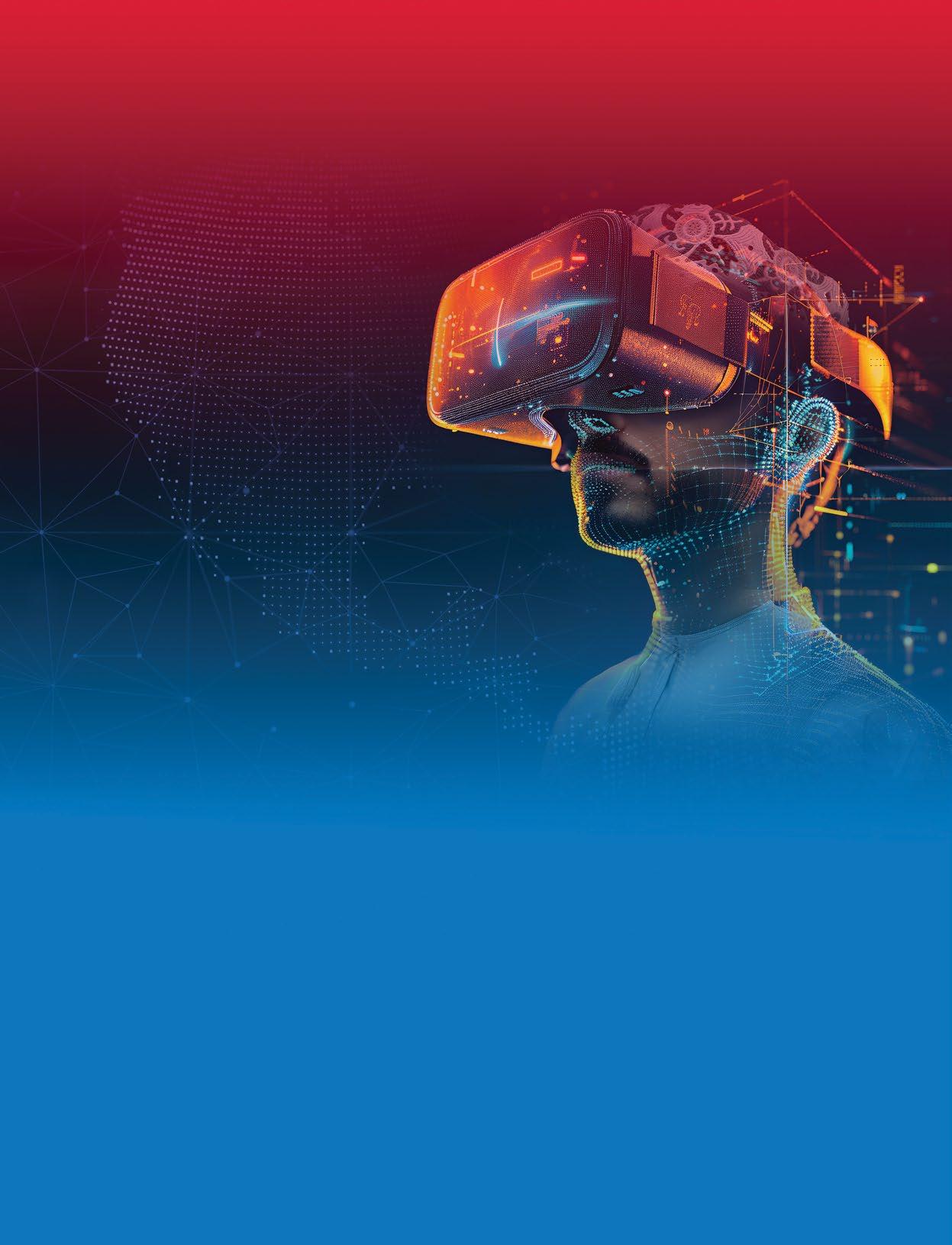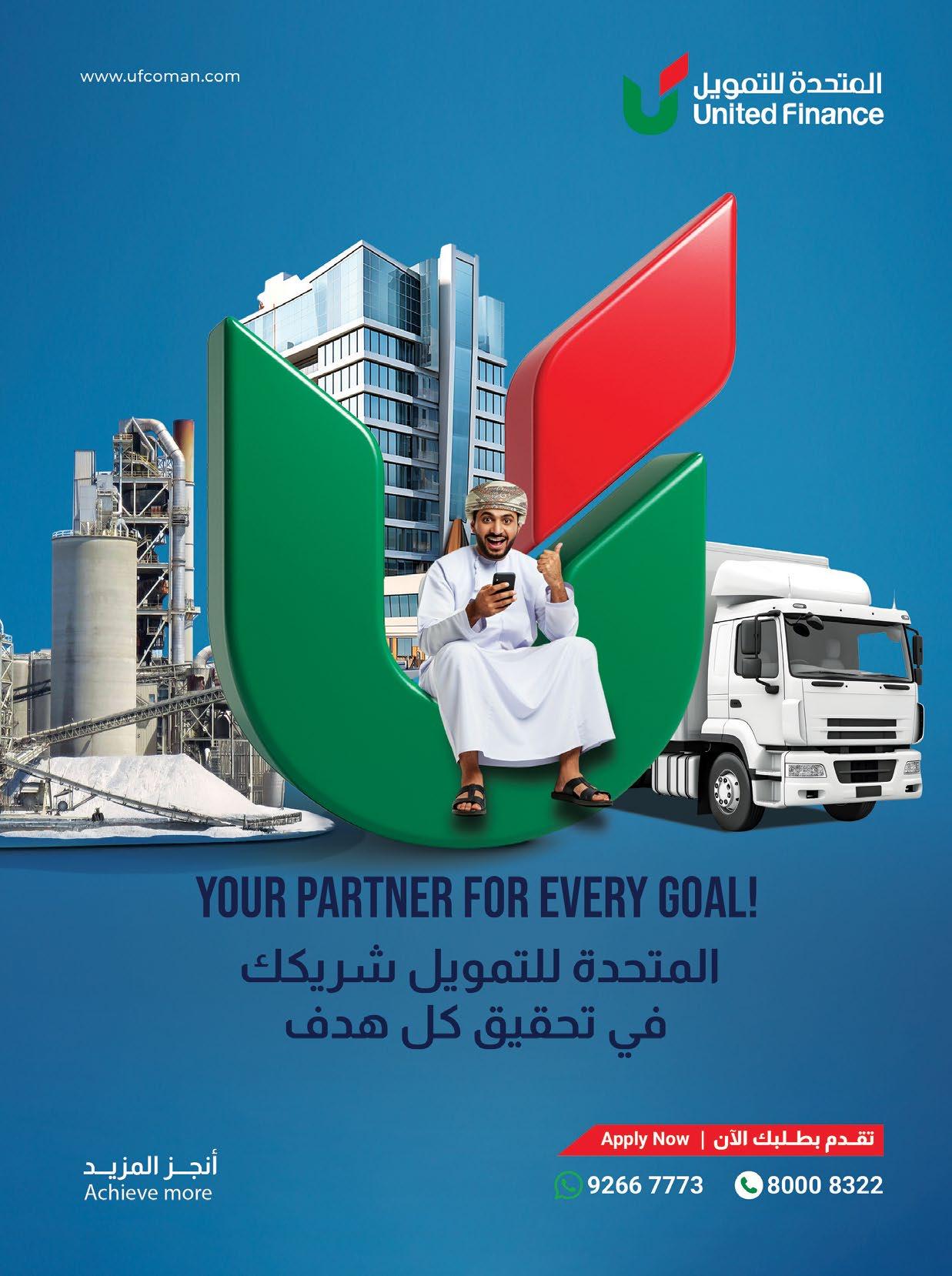

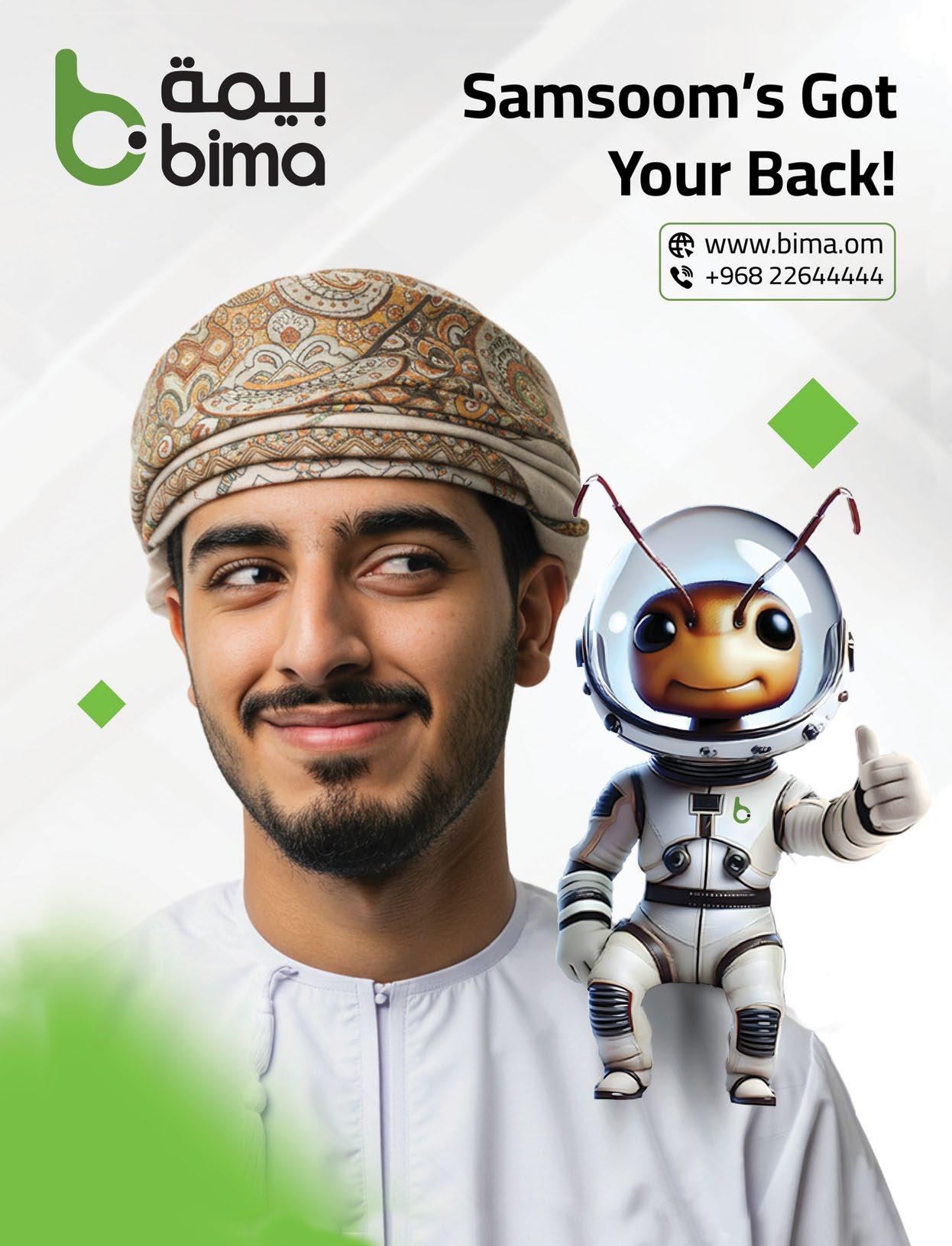






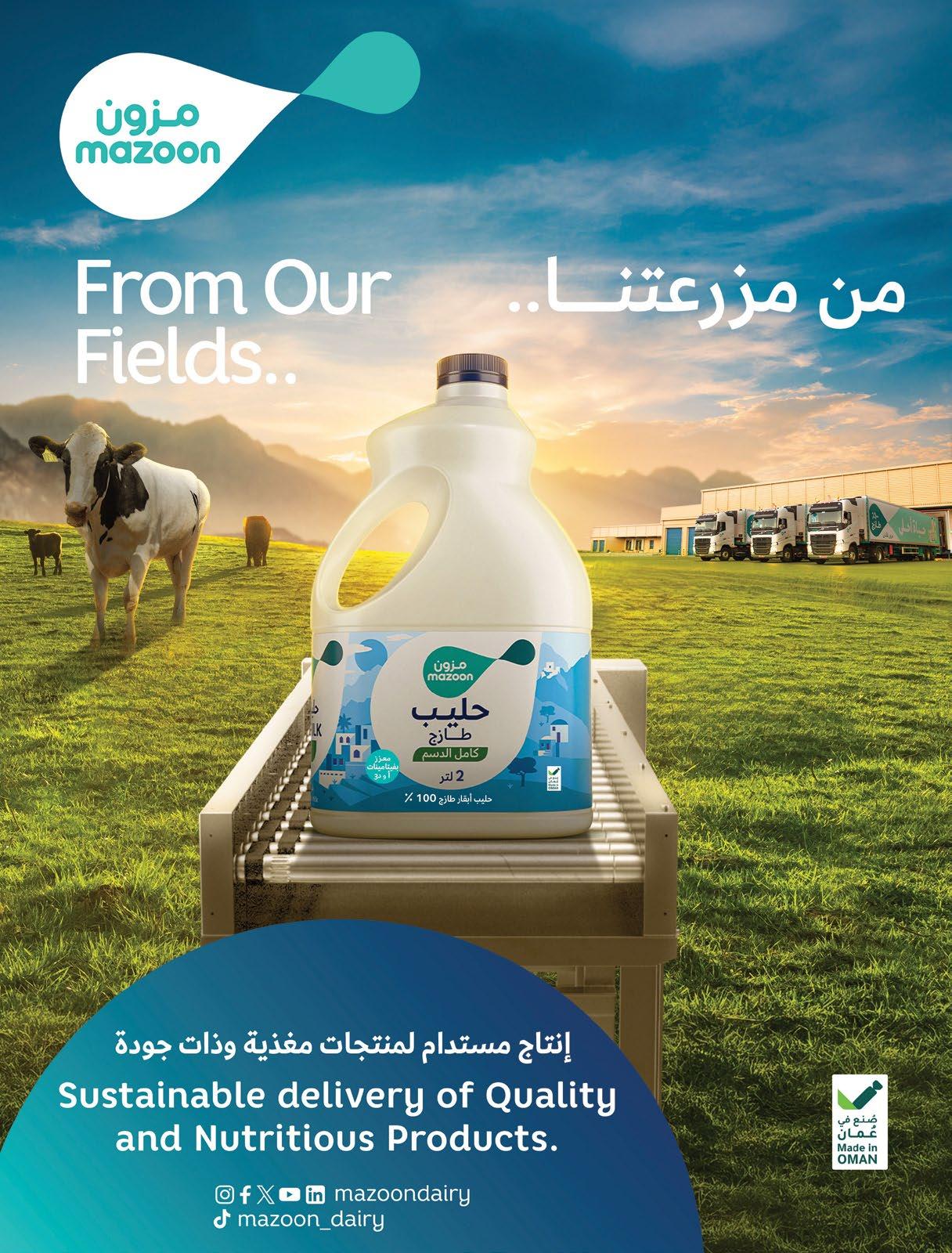
EDITORIAL
Editor-in-chief
Said Masoud Almashani
Executive Vice President and Group Editor Mayank Singh
Editor Oommen John P
DESIGN
Director Production – Print & Digital
Ramesh Govindaraj
Chief Photographer
Rajesh Rajan
Cover concept
Rakesh Radhakrishnan
MARKETING
Associate Advertising Director
Shivkumar Gaitonde
Business Manager
Dhanish Pillai
CORPORATE
Chief Executive Officer
Atulya Sharma
Distribution United Media Services LLC
Published by
United Press & Publishing LLC
PO Box 3305, Ruwi, Postal Code - 112 Muscat, Sultanate of Oman
Tel: (968) 24700896, Fax: (968) 24707939
Website: www.umsoman.com
All rights reserved. No part of this publication may be reproduced without the written permission of the publisher. The publisher does not accept responsibility for any loss occasioned to any person or organisation acting or refraining as a result of material in this publication. OER accepts no responsibility for advertising content.
Copyright © 2025 United Press & Publishing LLC
Printed by Oman Printers & Stationers Ltd. Co. S.P.C.
Correspondence should be sent to:
Oman Economic Review
United Media Services
PO Box 3305, Ruwi 112, Sultanate of Oman
Fax: (968)24707939
Website: www.oerlive.com
For editorial enquiries: 99884854
For advertising enquiries: 99267159
OER’s annual listing of the 100 Most Influential CEOs in Oman highlights exceptional leaders who have attained remarkable success through their vision and determination.
With a deep understanding of key market trends, they excel at guiding their organisations through challenges while capitalising on emerging opportunities. Their proactive mindset and steadfast commitment serve as an inspiration for aspiring executives. According to PwC’s 28th Annual Global CEO Survey, 58 per cent of CEOs around the world expect global economic growth to increase over the next 12 months. The report, which surveyed 4,701 CEOs across 109 countries and territories, including in Bermuda and the Caribbean, also finds that 42 per cent expect to increase headcount by 5 per cent or more in the next 12 months – more than double the proportion who expect headcount decreases (17 per cent), and up from 39 per cent last year. Within the global Financial Services sector, 64 per cent of CEOs believe economic growth globally will increase, and in the Caribbean region, 67 per cent of CEOs agree it will improve.
The most successful companies are steered by CEOs who share a crucial characteristic: meticulous attention to detail. These accomplished leaders possess a long-term vision focused on creating lasting value and employ various strategies to ensure no detail is overlooked. They inspire their teams to unite towards common goals while adeptly adapting to shifting market dynamics and customer needs. Their influence extends beyond their leadership roles, rooted in their achievements and transformative capabilities. Ultimately, their success lies in their ability to balance short-term and long-term objectives while remaining true to their core values and vision.
The selection process for the top 100 CEOs was thorough, involving months of research and due diligence by the OER team. While we do not consider the 100 Most Influential list to be exhaustive, we hope our readers will find it highly informative.
John


Sign up for OERLive's daily WhatsApp updates on economy, lifestyle, and technology. Send us a WhatsApp message with the word “OERLIVE” on 91242930

Your cover story on Oman’s Largest Corporates for 2024 made an interesting read. In the year ending December 2024, the revenues of Oman’s 20 largest companies rose by RO293mn compared to 2023. The total revenues for the OER Top 20 companies reached RO10,496mn, reflecting a three percent increase. However, overall corporate performance in 2024 was impacted by substantial losses incurred by several firms, leading to a 17 percent decline in profits, which fell to RO1,342mn from RO1,615mn in 2023. As of December 2024, the total market capitalisation of the OER Top 20 companies stood at RO10,019mn, marking a notable increase of approximately 45 percent from 2023, largely due to several significant initial public offerings (IPOs) in 2024. However, by March 31, 2025, this market cap decreased to RO9,510mn. The OER Top 20 companies accounted for 36 percent of the total market capitalisation of the Muscat Securities Market (MSM), which totalled RO27.6bn at the end of December 2024. In terms of market performance throughout 2024, the MSM demonstrated robust growth, bolstered by these new listings. The total market capitalization of the Exchange increased by 16 percent, reaching RO27.6bn, with gains exceeding RO3.9bn. This growth contributed to an 11 percent rise in total trading value for the year, while the number of traded securities surged by 45 percent, indicating a vibrant trading environment.
Adrian Murphy, MQ
Innovation in technology is no longer just about what is new — it is about what is meaningful. In a world driven by rapid digital transformation, breakthroughs like artificial intelligence, blockchain, and quantum computing are pushing the boundaries of what is possible. But beyond the headlines and hype, the real opportunity lies in how we apply these technologies to solve real-world problems and improve lives. As we move forward, it is essential to align innovation with purpose. That means designing AI that is not only powerful, but ethical and transparent. It means building smart systems that support sustainability, and creating digital tools that are accessible to all — not just the privileged few. The next chapter of innovation should be shaped not just by what we can build, but by what we should build.Collaboration will be key. Whether it is between governments and startups, researchers and industry leaders, or technologists and communities — progress happens when diverse minds come together with a shared vision. By fostering a culture that supports experimentation, continuous learning, and responsible design, we can ensure technology serves humanity, not the other way around. Moreover, embracing emerging technologies such as generative AI, spatial computing, and biotechnology offers exciting possibilities, but also new challenges. It requires us to rethink education, workforce development, and regulatory frameworks to keep pace with change.
Organizations that prioritize agility and human-centred innovation will be best positioned to lead this transformation. Ultimately, the future of innovation is not just about inventing what is next. It is about reimagining what is possible — thoughtfully, inclusively, and with impact. By committing to this vision, we can create a world where technology empowers individuals, strengthens communities, and drives sustainable growth for generations to come.






Oman’s Industrial Strategy 2040 is all set to drive economic diversification

Ilham Al Hamaid, General Manager, Corporate Banking, Bank Muscat shares how the bank has been a pioneer in offering state-of-the-art and innovative services and solutions for Corporate Banking customers
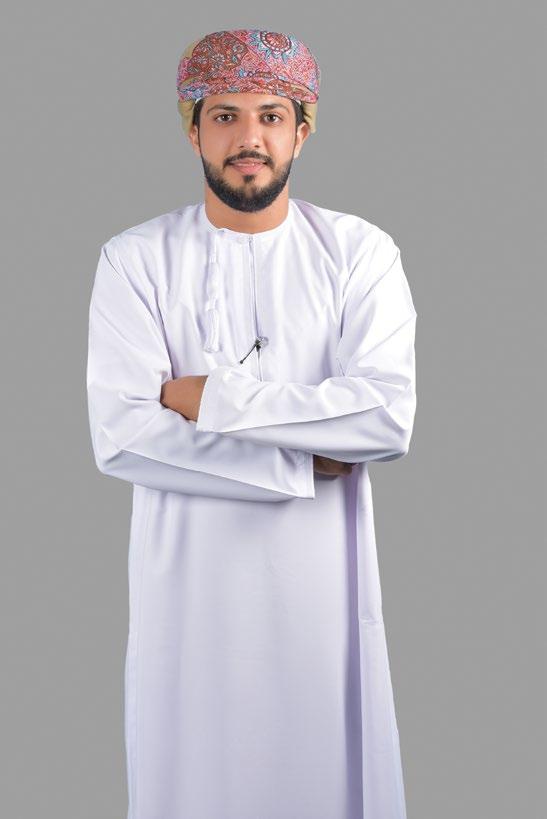


Through one of the nation’s most ambitious campaigns – Space Samsoom – Bima is redefining how Oman experiences insurance
Securado, a trusted cybersecurity organisations in banking, oil and gas, and manufacturing in Oman, has introduced a unique cybersecurity framework called
Oil prices rose as investors awaited news from US-China trade talks in hopes that a deal could boost the global economic outlook and subsequently fuel demand
The St. Petersburg International Economic Forum 2025 (SPIEF) continues to affirm its status as a major global platform for economic dialogue. Till date, representatives of over 137 countries and territories have confirmed their participation in the Forum organised by the Roscongress Foundation
Oman LNG
Oman LNG signed an agreement with Vitol Asia Pte. Ltd. to optimise Oman LNG’s LNG supply portfolio, marking another significant step in strengthening its global partnerships
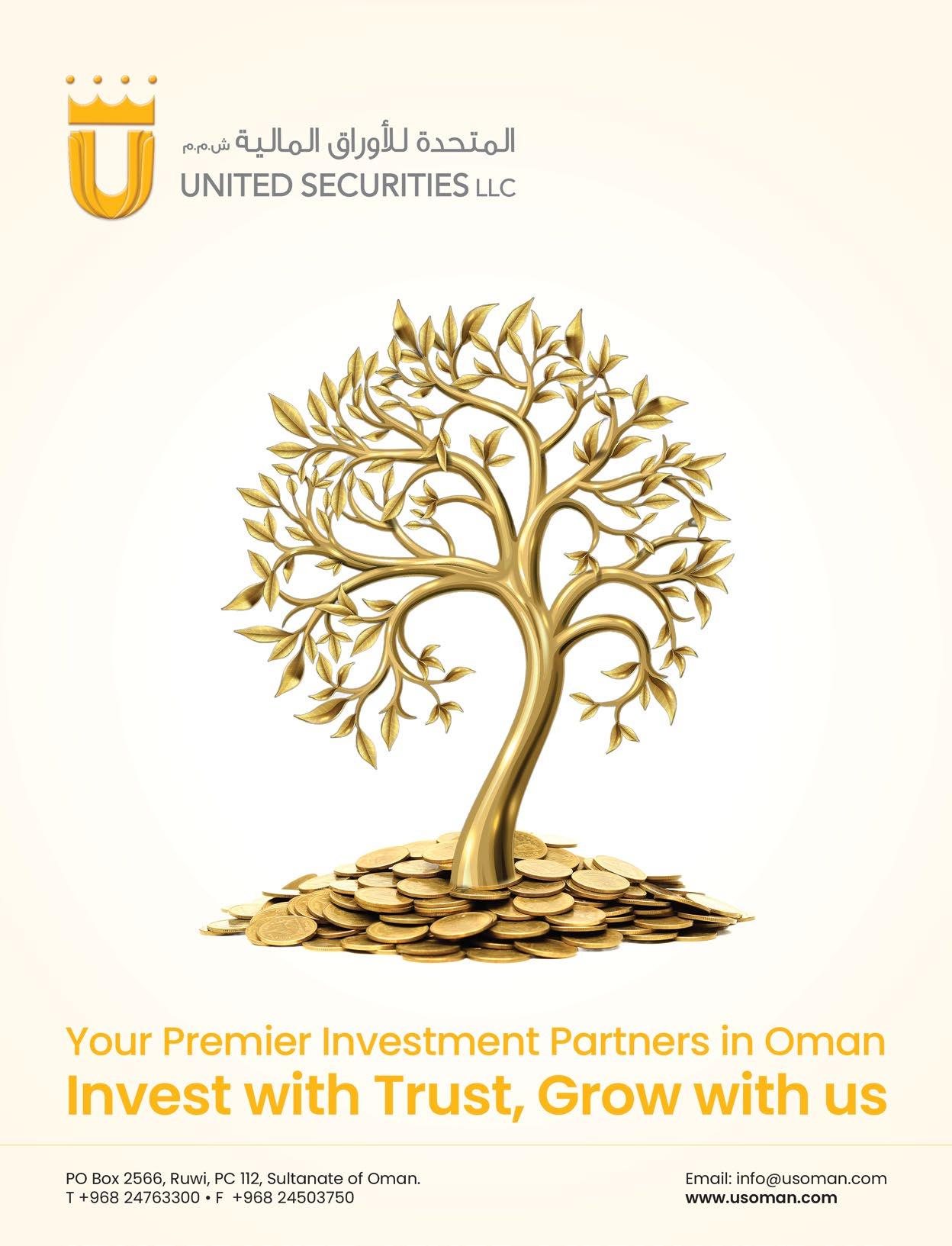

Bank Muscat, the leading financial services provider in the Sultanate of Oman, announced that it successfully managed series 9 of the Sovereign Sukuk Issuance launched by the Oman Sovereign Sukuk Company, with a total value of RO100mn. The sukuk carries a 7-year maturity and offers an annual profit rate of 4.65 per cent. Bank Muscat was appointed as the official issue manager and collecting bank for the subscription, in collaboration with other local financial institutions. This mandate reinforces the bank’s leadership in executing major investment transactions within the Sultanate and across GCC capital markets. The Oman Sovereign Sukuk Company had opened the subscription window from May 27 to June 1, 2025, with the sukuk settlement scheduled for June 4, 2025. The sukuk was priced within a competitive yield range, with an average yield of 4.625 per cent, a minimum yield of 4.57 per cent, and a maximum yield of 4.64 per cent, reflecting strong investor confidence and market stability. The sukuk payouts will be made semi-annually on June 4 and December 4 each year until maturity on June 4, 2032. The issuance witnessed participation from all categories of investors, retail as well as institutional. The sukuk is structured in accordance with Sharia-compliant principles and is fully tradable on the Muscat Stock Exchange (MSX) at prevailing market prices. All allocation details and investor records will be maintained and administered by Muscat Clearing and Depository Company, as the central registrar and depository for the sukuk.
Commenting on the occasion, Khalifa Abdullah Al Hatmi, Deputy General Manager, Investment Banking and Capital Markets at Bank Muscat, expressed
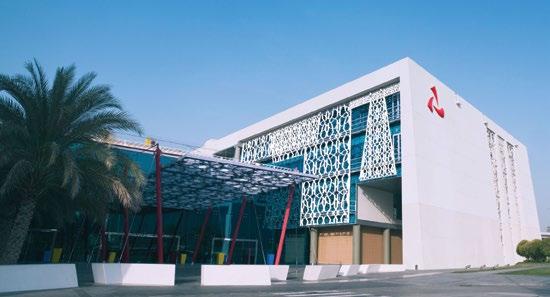
pride in collaborating with the team at Oman Sovereign Sukuk Company and the Ministry of Finance, Sultanate of Oman for this successful issuance. He noted, “The Bank’s appointment as the official issue manager for the sukuk issuance is a testament to the company’s trust in Bank Muscat’s capabilities and leadership in managing major investment transactions for a range of corporate and institutional clients. The Bank, represented through its Investment Banking and Capital Markets division, has extensive experience in structuring and executing large-scale capital market deals, both on debt as well as equity side, and its specialised team is wellequipped to navigate evolving market dynamics and complexities. Bank Muscat is committed to supporting the growth of local financial markets by offering a comprehensive suite of banking and financial solutions tailored to institutional and retail customers alike.” The selection of Bank Muscat as the issue manager underscores its strong local, regional, and international reputation among individuals, corporates, and financial institutions.
In line with its ongoing commitment to supporting sustainable development initiatives with lasting social impact, Bank Nizwa, the leading and most trusted Islamic bank in the Sultanate of Oman, has announced the signing of a Memorandum of Understanding (MoU) with the Health Endowment Foundation (ATHAR). This strategic partnership aims to enhance the role of the health endowment sector in promoting inclusive development, aligned with the national priorities outlined in Oman Vision 2040. The agreement was signed by Khaled Al Kayed, CEO, Bank Nizwa, and Ahmad Abdullah Al Khanji, Chairman of the Executive Committee, Board Member of the ATHAR Foundation, in the presence of senior officials from both institutions.
The memorandum aims to strengthen institutional cooperation between the two parties, with Bank Nizwa providing logistical and technical support to the ATHAR Foundation in implementing its strategic and operational plans— particularly in the areas of endowment investment and the development of health-related projects with sustainable impact. The collaboration also includes capacity-building initiatives designed to enhance professional competencies, as well as promoting ATHAR’s financial services and activities through Bank Nizwa’s various communication channels. Under the agreement, ATHAR will maintain its primary banking relationship with Bank Nizwa and recognize the bank as its strategic partner across all relevant media platforms. Commenting on the occasion, Khaled Al Kayed stated, “At Bank Nizwa, we firmly believe in
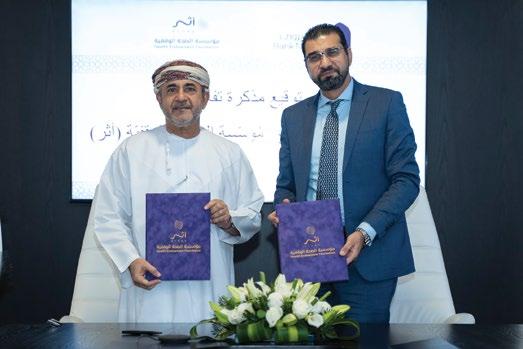
This partnership stands as a model for effective integration between Islamic finance and the endowment sector, reinforcing our shared commitment to sustainable development and delivering long-term value to Omani society.”For his part, Ahmad bin Abdullah Al Khanji emphasised that the MoU represents a strategic step towards developing an integrated health endowment model based on partnership and specialization. He stated, “We are committed to advancing institutional and professional health endowment services that benefit all segments of Omani society. This partnership with Bank Nizwa will further strengthen our capabilities and expand our positive impact.”



Reaffirming its position as a distinguished employer of choice in the region, Sohar International was recently awarded the prestigious ‘Middle East Best Employer Brand’ award, an accolade conferred by the World HRD Congress in association with the Employer Branding Institute. Known for its rigorous and multi-tiered selection process—comprising expert recommendations, independent research, and jury evaluation by global industry leaders—the Employer Branding Awards celebrates organisations that exemplify excellence in talent strategy and forward-thinking people practices. Sohar International’s recognition underscores its steadfast commitment to fostering a performance-driven, inclusive culture—anchored in the belief that human capital is central to long-term value creation and institutional growth. Representing the bank at the ceremony, Mahira Saleh Al Raisi, Chief People Officer at Sohar International, attended the event and received the award on behalf of the bank—further highlighting the leadership’s active role in driving the bank’s people agenda forward.
Commenting on the achievement, Mahira Saleh Al Raisi, stated, “Our people are integral to every milestone we achieve and every transformation we lead. At Sohar International, we believe that sustained performance stems from an environment where talent is nurtured, ideas are valued, and purpose is shared. We approach human capital with the same clarity and ambition that drives our business strategy—ensuring our people grow as the organization evolves. From fostering inclusive leadership to building next-generation capabilities, our focus on empowering individuals at every level is a strategic imperative that supports our broader goals of being a resilient and future-forward institution. This recognition reaffirms that the investment we place in our people is both meaningful and measurable.”
Sohar International’s selection for the award was based on its ability to
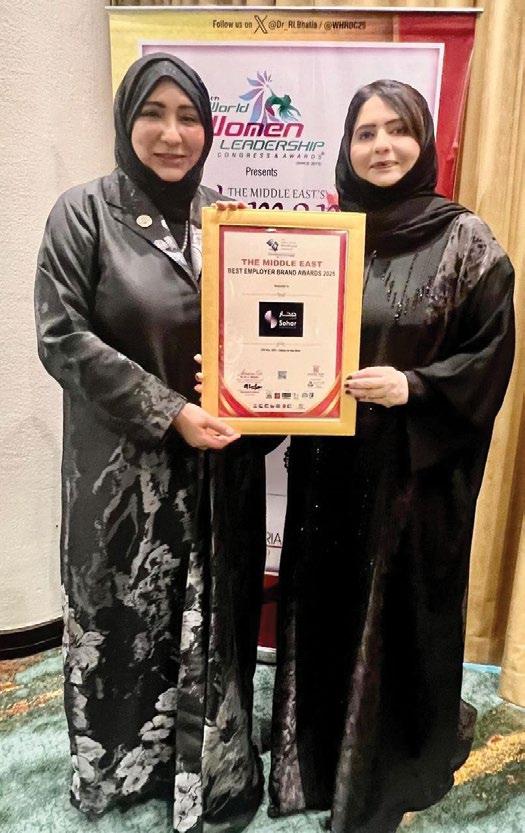
United Finance Company SAOG has announced the successful completion of its privately placed, senior unsecured bond issuance, which was oversubscribed by 71 per cent. Strong investor demand enabled the Company to upsize the offer from the originally targeted RO10mn to a final issue size of RO15mn.
The bonds carry a fixed coupon of 7 per cent per annum, payable semi-annually, and will be listed on the Muscat Stock Exchange (MSX). ahlibank SAOG acted as Issue Manager and Collection Bank, while Al Busaidy, Mansoor Jamal & Co. served as Legal Advisor. Nasser Al Rashdi, CEO, commented, “The overwhelming response
to this offering reflects investors’ confidence in UFC’s financial strength and strategic direction. The additional capital enhances our balance-sheet flexibility as we execute our growth roadmap and continue to deliver innovative, customer-centric financing solutions.” The proceeds will support UFC’s ongoing transformation initiatives, digital expansion, and selective portfolio growth—all aligned with prudent risk management and long-term shareholder value creation. With a strengthened capital base, the company is poised to capture emerging opportunities across its target segments while maintaining robust liquidity and capital adequacy ratios.
Built on trust, insight, and long-term perspective.

From transaction banking to research intelligence, Oman Investment Bank equips clients with tools to thrive in a changing world. Driven by innovation and guided by purpose, we’re redefining investment banking in emerging markets, empowering businesses with clarity, agility, and confidence.
Through one of the nation’s most ambitious campaigns – Space Samsoom – Bima is redefining how Oman experiences insurance: making it fun, personal, and boldly digital, with a clear five-year vision to transform industry norms. Alvin Thomas, Assistant Editor of OERLive sits down with Abdullah Al Kharousi, Marketing and Sales Manager at Bima

When you eye greatness, sometimes, the sky is the limit. But every so often, a bold idea challenges that very notion – daring not just to meet the sky, but to go beyond it. While most marketing campaigns chase attention with flashy visuals and catchy slogans, one Omani company quietly did something extraordinary. Not louder. Not flashier. Just… higher.
Bima, Oman’s leading digital insurance aggregator, charted a course that no brand in the Sultanate of Oman had dared to venture before – into space. Or more precisely, the stratosphere, some 130,000 feet above sea level, where the Earth curves and the blue fades into black. Their unconventional
hero? A tiny ant, affectionately named Samsoom – a nod to the Arabic word for ant, “Samsoon.”
In an unprecedented brand activation titled “Space Samsoom,” Bima launched Samsoom aboard a highaltitude balloon to the edge of space. The ant – symbolising endurance, determination, and small-but-mighty resilience – became an unlikely yet unforgettable ambassador of innovation and ambition. From that staggering height, Samsoom looked down on Oman in all its majestic glory – its deserts, mountains, and coastlines shimmering under the vast expanse of space. It was a moment that made people stop, smile, and wonder: Did an Omani ant just go to space?
It’s not every day that a brand dares to rewrite the rules of advertising and storytelling. And in doing so, Bima didn’t just promote a product but spark imagination. They proved that even in an industry as traditional as insurance, there is room for spectacle, for joy, for boldness. They reminded us that the smallest ideas – like a humble ant – can carry immense power. As we dive into the story behind this ambitious campaign, we speak with Abdullah Al Kharousi, Marketing and Sales Manager at Bima, to uncover how the idea was born, how it took flight, and what it means for marketing in Oman going forward. This is the story of Space Samsoom, an idea that quite literally reached new heights.
Bima has taken marketing to stratospheric heights – literally. Can you walk us through the inspiration behind the ‘Space Samsoom’ campaign? What did space represent for the brand, and how did this bold creative push tie into Bima’s core identity and message?
Absolutely. The Space Samsoom campaign wasn’t just about spectacle but rather about making a statement. At Bima, we’ve always believed in pushing boundaries, especially when it comes to accessibility and convenience.
It’s that idea – limitless accessibility – that sparked the concept of Space Samsoom. We asked ourselves: If people can buy insurance from literally anywhere on Earth, what’s stopping us from symbolically going even further? That’s how space entered the equation. What better way to demonstrate our “always available, always connected” promise than by launching a message, and a tiny ant, into space?
And beyond the brand message, there was another layer that meant a great deal to us. Space has always symbolised wonder, curiosity, and the boundless dreams of children. Every child dreams of reaching the stars – and in a way, Space Samsoom carried those dreams along with it.
We wanted this campaign to spark the imagination of the next generation, to show them that no idea is too small, and no dream too far-fetched. If a tiny ant from Oman can make it to space, so can the aspirations of a child watching from the ground.
We’ve seen people using Bima while studying abroad, insuring their cars from outside the country, or even during national holidays in the middle of the night. That level of 24/7 availability is rare in our industry.
So yes, the campaign was playful and unexpected, but it was also deeply symbolic. It was our way of saying: We’re here for you, no matter where you are, no matter how big your dreams.

The ‘Space Samsoom’ campaign is bold, imaginative, and unlike anything we’ve seen from a brand in the region. How did this campaign come to life – from the creative spark to the technical execution? And how does it fit within Bima’s broader, always-on brand storytelling strategy?
When we first launched Bima, our mission was clear: we wanted people to know that Bima existed. That was the starting point. Awareness was everything in those early days, getting the word out, showing up on billboards, and making sure people associated insurance with simplicity, speed, and digital access.
Fast forward to today, and we’ve achieved that initial goal. Bima is now a well-known name across the country. We’ve become part of the everyday landscape – whether it’s the quirky cups you see in some cafés, the Bimabranded cars weaving through city traffic, the rooftop signage standing tall above the skyline, or the iconic leopard-chase campaign that people still talk about. We’ve carved out our space.
But with recognition comes a new challenge: how do we keep surprising people? How do we remind them that Bima isn’t just known but innovative, fearless, and capable of doing things that others wouldn’t even consider?
That’s where Space Samsoom comes in. This campaign wasn’t just about doing something different – it was about creating a moment. It started with a simple, almost playful internal conversation: What’s the craziest campaign we could pull off to really show that Bima is everywhere? We threw around wild ideas. We considered insuring someone while they were on a rollercoaster. Then skydiving. We even got in touch with Skydive Dubai to explore possibilities.
But then someone asked: Why stop at the sky? Why not go beyond it? And suddenly, the idea of space wasn’t so far-fetched. After all, we constantly emphasise that Bima is accessible anywhere, anytime – as long as
there’s internet. So, what could make that message louder than sending it into space?
From there, the campaign evolved into something bigger than we could have imagined. We considered doing a realtime insurance transaction from space. It was technically possible. But then we thought, what if we sent a living being from Oman to the edge of space? Something symbolic. Something no one would forget.
That’s when Samsoom, the ant, entered the picture. Small in size, but massive in meaning. If a humble ant could make the journey, it would stand as a metaphor for every Omani dream: small beginnings, limitless ambition.
The technical execution was a whole other adventure. We chose a highaltitude weather balloon to carry our capsule to the stratosphere – one of the few realistic ways to reach up to 130,000 feet.
But it wasn’t just about sending something up. There were layers of planning involved: coordination with aviation authorities to ensure flight paths were clear, calculating payloads, estimating burst altitudes, and tracking wind speeds to predict where it might land. As the balloon ascends, the atmosphere becomes significantly thinner – at around 120,000 feet, we’re talking about just 1 per cent of the atmospheric pressure at sea level. Because of this, the balloon expands dramatically. A balloon initially inflated to about 1 meter on the ground can reach nearly 10 meters in diameter at that altitude before it finally bursts.
Now, predicting when and where that burst will happen is critical. It depends on precise calculations involving the amount of helium used, the size and elasticity of the balloon, and the prevailing wind patterns. We ran into a small hiccup during our launch: a problem with the helium meter. It wasn’t clearly indicating how much helium we were pumping in, and as a result, we ended up using less than intended.
That small miscalculation had a big impact. It extended the balloon’s flight
duration, altered its trajectory, and ultimately meant that it would land far from the originally planned zone. Once the helium is filled and all the numbers are crunched, the next step is determining the best launch location – not based on where you want to launch from, but where you want to recover it.
We had to reverse-engineer the route. Our goal was to land near Saham, so we chose a launch site that would work backwards based on wind predictions. Why Saham? Because it’s a safe, open area. The worst-case scenario would be the capsule crashing into a mountain, falling into the sea, or landing on a rooftop. That level of risk had to be accounted for.
Then came building the capsule. We gathered and built the payload container ourselves. We cut openings for the cameras, fixed in power banks, and designed the insulation to fight off the freezing temperatures of the upper atmosphere.
One of the big technical hurdles was ensuring the cameras wouldn’t freeze. We did our best, but one camera still shut down mid-flight; meaning, we lost some of the descent footage.
And then, of course, there was Samsoom. We had to build an air-tight, pressure-sealed chamber to protect him. Without the right environment, he wouldn’t survive. So we surrounded the chamber with heat sources – mainly power banks – to keep the interior warm, added a little sugar for sustenance, and prayed for the best.
Thankfully, the launch was a success. The mission achieved what we’d hoped it would, and more. It wasn’t just about visuals or reach. We realised that it became a moment of national imagination. Children were fascinated. Adults were intrigued. And across Oman, people were talking about how a digital insurance company had just sent an ant to space.
Can you walk us through the behind-the-scenes journey of your first space launch – what were your
expectations, the challenges you faced, and how the team responded in real time?
So this is actually interesting. Our successful launch was also our first and test launch. But even for a test, we went all in, fully equipped with Samsoom, onboard cameras, GPS tracking, the whole setup. Everything was built and loaded like it was the real deal.
We had actually prepared for two launches. That was the plan from the start: treat the first one as an experiment, and if anything failed, regroup and retry with the backup. We had two sets of equipment, two capsules – everything duplicated. We were ready for failure. Not hoping for it, obviously, but absolutely willing to embrace it if it meant learning.
There was even a discussion around making the second launch a public event, which would have been something big and open, where people could witness it live. That idea was floating in the background, but first, we had to see how this initial launch would go.
The launch itself was fast. Surprisingly fast. We barely had time to blink before the balloon shot up and disappeared into the sky. From there, the estimated flight time was around three hours – up to the stratosphere, and then drifting back down. So we went to grab lunch. Spirits were high. Everything seemed to be going smoothly. Initially, though, we had a bit of a scare.
The balloon drifted slightly offcourse from the planned route, and for a moment, we were nervous. But then the GPS showed that the winds at higher altitudes were behaving exactly as expected. Once it reached a specific height, it corrected itself and started heading in the right direction – crossing over the Haba desert, right on track.
Then things got interesting. First, the balloon’s horizontal speed increased dramatically. It was moving at about 80 kilometers per hour across the sky – much faster than anticipated. That made it harder to predict where it
would eventually come down. Second, the balloon just kept going... and going. We had predicted a certain burst altitude, the point at which the helium would expand and the balloon would pop, releasing the payload, but that didn’t happen when we expected it to. It climbed past that threshold and kept drifting further and further west.
Here’s the tricky part: our GPS device, a Garmin unit, only transmitted its location every ten minutes. So we were stuck in this pattern – waiting, checking, refreshing, holding our breath. Every ping felt like a suspenseful movie scene. “Is it still climbing? Is it coming down yet?”
Eventually, we started asking the big question: Do we give up? We were honestly that close to packing up and going home. It looked like it might end up all the way in Fahud. Or worse, cross into the UAE. We were mentally preparing ourselves for the idea that we might’ve lost it.
Then the balloon finally reached its max altitude: 130,000 feet. We received that reading from the GPS, though it’s possible it reached slightly higher before the data updated. It was pushing the limits.
At one point, it looked like it was going to land near the mountains between Sinaw and Adam – a terrifying possibility. If it landed there, we wouldn’t be able to retrieve it easily. But we were already brainstorming backup plans. We even considered reaching out to local tracking or rescue teams or chartering a helicopter if needed. That’s how committed we were. The anxiety was real. We just wanted to recover the capsule. Not for the gear or the cost. But to see Samsoom. To check the footage and to know what happened up there. The idea of it crashing onto some remote cliffside and disappearing forever was honestly painful.
Eventually, the burst did happen but not where we’d hoped. It exploded over a populated area. That was another wave of concern. The capsule might land on a house, a road, or worse. It
was also a windy day, and that added a new layer of unpredictability. Once the parachute deployed, the payload could drift significantly.
Thankfully, the wind carried it away from the populated area and into an open field. Not just open but remarkably clear and flat. Destiny, perhaps. It was the perfect landing zone. Suddenly, everything shifted. Now we were excited. We jumped in the car and raced to the projected landing site near Adam. But the conditions had turned surreal. It was raining heavily, with strong dusty winds. Visibility dropped to almost nothing; you couldn’t see more than a couple of meters ahead. The landscape was rough, filled with bushes and uneven ground, and we were driving blind in the storm.
We were bouncing across terrain, swerving around thorny shrubs, barely seeing through the fog. And then... we saw it. The capsule. On the ground. Safe. That moment was unbelievable. After all the uncertainty, the waiting and the close calls, there it was. Samsoom had made it to space and back.
Can you walk us through the most memorable moments and challenges you faced during the recovery of your high-altitude payload, and what you discovered when you finally opened the box?
Opening the sealed payload box was surreal. But what made it even more unexpected was discovering that we had actually captured footage of ourselves approaching the payload. That wasn’t planned at all.
Here’s what happened: one of the cameras, which hadn’t functioned properly at launch, somehow smacked the ground hard and turned on upon landing. It was pointed upward and ended up filming us as we cautiously approached the box, wide-eyed and reaching out. We had three different angles, but this particular shot felt cinematic – like the camera had been waiting for us.
It was a mix of bad luck and good luck, really. During launch, the conditions
were extremely windy. I was holding the balloon while we scrambled to secure the payload, parachute, and spacing rope, all in real time. The balloon itself is delicate: it can’t touch the ground, and even the oils from your skin can cause it to burst early. We were wearing gloves, but even a minor mishandling could jeopardise everything.
That day, while assembling the payload, one of the cameras was mounted facing downward. Unfortunately, the power button was located on the same side and was likely pressed during setup. So, while we got sideways and upward footage, we missed capturing the downward view during the flight. A bit of a loss – but what we got made up for it. Thankfully, Samsoom, our “space traveller,” made it back intact. So did the cameras. In fact, everything performed well enough that we questioned whether we even needed a second launch. We had already achieved what we set out to do: send a payload to the edge of space and bring back extraordinary footage. From that test flight alone, we had enough material and insights to move forward confidently.
And the footage? Incredible. We watched it while driving back to Muscat and it was mind-blowing. Crisp visuals from space, with black skies and a full view of the country below. It truly looked like space.
Bima has always been a bold disruptor in an otherwise traditional industry. But as your campaigns evolve and your market presence deepens, how has your brand ethos matured and how is that translating into customer perception today? A lot has changed and a lot has evolved. But one thing that has remained consistent is our mindset. We’ve always positioned Bima as a different kind of company. Some might call it disruptive; we think of it as ‘unusual’ in the best possible way.
That word really captures it. We don’t follow the rulebook for the sake of tradition. We’re willing to take risks,
push boundaries, and lean into ideas that might raise eyebrows at first but will absolutely be remembered. And we’ve seen the impact. Our campaigns have sparked conversations across the industry. We know other players are watching and, in many cases, recalibrating their own marketing approaches because of what we’ve done.
But taking risks also means managing cultural perception. A good example is our leopard chase campaign. It was unexpected, even shocking to some. There were parents who called saying it scared their kids. And we understood that. But we also believed that once people let it sink in, they’d see it for what it was: a fun, exaggerated metaphor. The man wasn’t terrified – he was almost smiling. The point wasn’t fear; it was familiarity. Life can be unpredictable and even chaotic but Bima is your comfort in that chaos.
We’re not in the business of fearmongering. You won’t hear us say, “You’ll crash your car tomorrow, so buy insurance today.” That narrative is outdated. We’re here to say: Things happen. We’re here for you when they do. We embrace the unpredictability of life but we also show how preparation, protection, and peace of mind can make all the difference.
But beyond campaigns, what really drives loyalty is the experience. And this is where our ethos shows up most powerfully. Let me share a quick story of our Founder and CEO of Bima. He was once at the airport, about to board an international flight with his family. They suddenly discovered his son’s passport needed a signature, which, on the new passports, means you need to get a completely new one. They were just hours from their flight.
He grabbed his son, jumped into a taxi, rushed to the ROP office, explained the situation, and thanks to their efficiency and kindness, managed to get a new passport and catch the flight. That moment stayed with him. It also taught him something: when time is saved in moments of stress, it changes everything.
That lesson is part of Bima’s DNA. Insurance used to be a painful, bureaucratic process. You’d take a token, sit for hours, part with your money and your mood. We changed that. Today, people compare our experience to ordering food online: quick, intuitive, and satisfying.
And we’ve heard that directly from customers. One senior executive at a major Omani company once told me that Bima quite literally saved his family’s weekend. He was headed to Jabal Al Akhdar when checkpoint police informed him his insurance had expired. He thought his entire trip was ruined. But a quick recommendation to try Bima changed everything. Within minutes, he had his new insurance and was back on the road. That interaction led to a strategic partnership with his company, because he saw firsthand the value we bring, especially when it matters most.
We’ve also built loyalty by being available when no one else is. In the early days, we operated 24/7 even when it wasn’t financially viable. Sometimes we’d get just a handful of sales in the middle of the night – but those were critical for the people who needed us then.
That’s how we earned trust. And it continues today. Just last Eid, we insured over 100 cars… on Eid Day. No one does that unless they urgently need help. And we were there for them.
This is what we mean when we talk about shifting the perception of insurance. We’re not just making it digital. We’re making it human, responsive, and emotionally intelligent. That’s the true ethos of Bima.
In a sector that’s typically seen as transactional and even tedious, Bima has brought deep disruption. How have you managed to build and retain such a strong and growing customer base? What does your retention rate look like, and are there any key figures you’re willing to share that speak to your market impact?
We’re proud to say our customer base has doubled – 2x growth – year-on-year since inception. Today, Bima holds nearly 20 per cent of the national motor insurance market, which means one out of every five cars on the road is insured through Bima. That’s a huge milestone, but retention in our industry is complex.
You see, while the raw retention numbers might not tell the full story, because vehicles change hands, names shift between spouses, or customers change cars. The real proof of loyalty lies in our customer sentiment metrics. And on that front, we’ve been very consistent.
After every transaction, we ask our customers for feedback. And over 95 per cent say yes. Not only that, but more than 95 per cent also say they would return to Bima again. That’s a number we’re deeply proud of.
In fact, we’re also the highest-rated service provider in Oman on Google – across all categories, not just insurance – with more than 10,000 reviews and a 4.9 out of 5 rating. That kind of validation from real users speaks volumes, especially in a service sector where expectations are high and things can go wrong fast.
What makes this more special is that, in insurance, people don’t wake up excited to buy a policy. No one says “Today’s the day I buy insurance!” But when we make that experience smooth, fast, even a little fun, that’s what builds loyalty.
To keep our customers engaged, we go beyond just fulfilling a transaction. We invest in personalised, human-centric operations – from reminders, followups, and 24/7 customer support, to sending birthday greetings in the form of AI-generated Omani cartoon videos. It’s a small but thoughtful touch that people remember. And yes, our team calls back unhappy customers one by one, to listen, resolve, and learn.
We’ve learned that in a low-margin industry like ours, scale and creativity are key. Rather than offer small
discounts that chip away at our margins, we focus on big, bold loyalty campaigns, like car giveaways and benefit programmes with 100+ local partners. It’s more impactful and aligns with our high-growth, high-loyalty model.
Bima is constantly evolving beyond just being a digital insurance platform. In that context, what are some of the ways you’re broadening your business offerings or deepening customer value?
We’re expanding in two key directions. One of them is through introducing adjacent, non-core services that enhance the insurance journey itself.
Just recently, for example, we launched a new Claim Assistance programme. If you’re insured through Bima, you now have the option to opt into this feature, where we handle your entire claims process… end-to-end. Got into an accident? You don’t need to run around coordinating with your insurance provider. Just raise the claim, and Bima steps in to handle the rest.
We’re offering this as a complimentary service during the launch month, but it will become a premium feature going forward. It’s our way of redefining what “peace of mind” means in the insurance world.
At the same time, we’re pushing deeper into customer engagement by reaching out not just to new users but also to serve our existing customers better, ensuring they’re aware of added-value features that enhance their experience with us.
The second area we’re expanding is in terms of audience reach. Today, the vast majority of our customer base is Omani, but we’re now actively positioning ourselves to engage the expatriate population as well through targeted outreach on popular local and ethnic channels, especially among communities like the Asian diaspora.
We’re also adapting to the realities of the market. While non-residents can’t insure vehicles unless they meet certain residency criteria, there’s still a
wide array of services – like domestic worker insurance or health policies – that can be tailored based on the individual’s residence status and needs.
The key is that our offerings are dynamic. Customers don’t just come to Bima to buy a fixed product, they come for a curated experience, personalised to their profile, preferences, and lifestyle.
As we look ahead, it’s clear that the insurance space is evolving rapidly digitally, operationally, and in terms of customer expectations. With that in mind, what’s the long-term vision for Bima? Where do you see the company in the next five years, not just in terms of market share, but in the role you aim to play within the wider ecosystem?
Volume-wise, Bima is already a dominant player, particularly in the motor insurance segment. But we’re not just chasing numbers. The real ambition is to lead a shift in mindset: to make insurance feel intuitive, accessible, and even empowering for everyday users.
Right now, there are still people in Oman who physically wait in line to get insured. That’s not acceptable in 2025, and definitely not five years from now. Our goal is to eliminate that friction entirely. We want Bima to represent comfort, convenience, and confidence in how insurance is experienced – from onboarding to claims.
Beyond motor insurance, we’re actively expanding into other verticals such as health, domestic, and more so that we’re not just a provider, but a trusted ecosystem. We want to guide customers through every step, making insurance feel less like a chore and more like a well-designed service.
And we’re lucky to have a sharp, forward-thinking team driving this. People in our team and on our leadership bench are pushing boundaries, not just following the playbook. That’s why we’re excited about what’s ahead.
Securado, a trusted cybersecurity partner for prominent organisations in banking, oil and gas, and manufacturing in Oman, has introduced a unique cybersecurity framework called the Digital Vaccine. Unlike traditional solutions that simply block threats, our approach targets their root causes and resolves them, says Krishnadas KT, Co-Founder and Partner in an interview with Oommen John
Can you share details of Securado’s operations in Oman?
Since we started in 2008, Securado has been a trusted cybersecurity partner for top organisations in banking, oil and gas, and manufacturing, logistics the public sector in Oman. We began as a system integration company, which gave us valuable insights into the changing technology landscape and the growing cybersecurity needs in the region. Noticing the growing importance of cybersecurity, we shifted our focus to delivering security as a service driven by value and results. This change helped us position ourselves uniquely in the market. We offer not just technology but a complete approach that combines services and solutions tailored to our clients’ risk environments.
Today, Securado is proud to be one of the top Managed Security Services Providers (MSSP) in Oman, accredited by the Ministry of Transport, Communications and Information Technology (MTCIT). We have two distinct service lines within our managed cybersecurity defence portfolio, supported by our proprietary Adaptive Cloud Security Stack.
What makes us different is our ability to combine governance, compliance, and risk management frameworks in our offerings. This delivers complete cybersecurity solutions that not only reduce threats but also address them. Our flagship framework, the Digital Vaccine, shows this approach by actively improving our clients’ digital resilience. With a solid foundation in both technology and services, Securado continues to lead the way in securing Oman’s digital future.
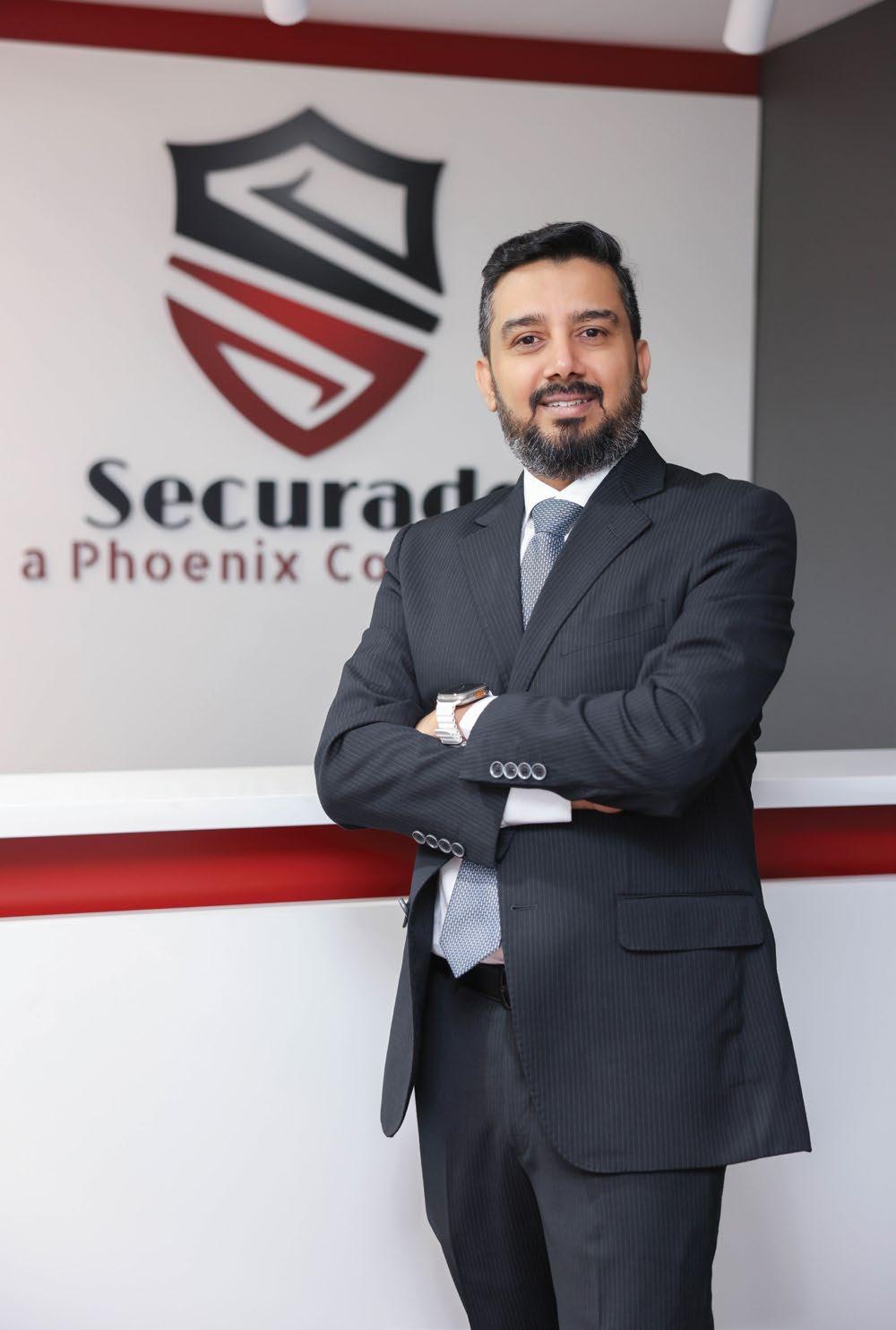
What specific technologies does Securado utilise in its cybersecurity offerings?
At Securado, we developed a unique cybersecurity framework called the Digital Vaccine. Unlike traditional solutions that only focus on stopping threats, our approach goes a step further. It also helps fix the root causes of those threats. To do this, we combine smart technology with expert services. Our solutions are built on a strong foundation of compliance and governance. This means they are designed to meet both technical and regulatory needs. What makes our approach stand out is how we work closely with our clients. We don’t just install tools. We help them build fast, effective responses to today’s complex and ever-changing cyber threats. This hands-on method ensures that our clients are not only protected but also prepared.
What sets Securado apart from other cybersecurity providers in the region?
In today’s world, cybersecurity is no longer just a business issue. It has become a national priority. With cyberattacks increasingly used in modern conflicts, every country needs its own “cyber army” supported by strong local skills and infrastructure. What makes Securado truly unique in the region is our locally hosted cloud security gateway, the only one of its kind in Oman. This allows our customers to use advanced cybersecurity controls through a simple subscription model, without needing complex setups. It offers plug-and-play security, designed for speed and ease. But technology alone is not enough. That is why we have invested heavily in developing national talent. Through our Abtikar platform, we train and grow the cybersecurity skills needed in the market. Today, we proudly operate with one of the most skilled local cybersecurity workforces, providing 24/7 services entirely from within Oman. This combination of local infrastructure, national expertise, and a commitment to skill development is what sets Securado apart and explains why we are trusted by some of the most critical sectors in the country.
Can you describe the key cybersecurity challenges currently
facing organisations in Oman?
As Oman moves forward with its digital transformation, organisations are facing a new set of cybersecurity challenges that are complex and fast-paced. One major challenge is the use of multicloud environments. Data is no longer limited to a single system; it is spread across various cloud platforms. This makes it tough for organizations to keep strong and consistent security measures in place, raising the risk of gaps and weaknesses. Another big concern is the rapid growth of Artificial Intelligence (AI). While AI improves the ability to spot and respond to threats quickly, it also provides cyber attackers with sophisticated tools to launch quicker and more complex attacks. This ongoing struggle between defenders and attackers is changing the cybersecurity landscape. Additionally, the widespread use of AI tools, particularly large language models (LLMs), brings new risks. Organisations may unintentionally leak sensitive data while using these systems, effectively training public AI models with private or confidential information. This can make managing data and ensuring privacy more difficult than ever.
What emerging cybersecurity threats do you predict for the next few years?
Cybersecurity threats are expected to become more intelligent, targeted, and harder to detect in the future. One major development is the use of Artificial Intelligence by cyber attackers. AI allows them to launch faster, more adaptable attacks that can get around traditional security systems. Another rising concern is deepfake technology. These hyperrealistic fake videos and audio can be used to impersonate trusted individuals, making people more susceptible to social engineering scams. As these tools become easier to access, the risk of deception increases significantly. Phishing attacks are also changing. Attackers now create highly personalized emails using relevant information instead of sending generic messages. These smarter phishing attempts are harder to recognize and need better security measures to defend against. Critical infrastructure is becoming a prime target as cyber warfare grows. Systems that support essential services,
like energy, water, and transportation, face an increasing risk, making their protection a national priority.Looking ahead, quantum computing is emerging as a serious threat. Although still in the works, attackers are already collecting encrypted data today to decrypt it later when quantum technology becomes practical. This poses a long-term danger to sensitive communications, especially in areas like finance, government, and national security. In short, as the digital world becomes more connected and smarter, the risks increase. Organisations in Oman need to embrace innovative cybersecurity strategies that tackle current issues, such as cloud security, AI governance, and quantum resilience, while also getting ready for future challenges.
How is Securado planning to adapt its strategies to meet future cybersecurity challenges? At Securado, we are focused on staying ahead in the changing world of cybersecurity. Our strategy combines Artificial Intelligence and human expertise. This approach ensures our defenses are both smart and flexible. Our AI analysts play a key role in improving threat intelligence. They continuously train localised AI models that grasp the unique context of our clients’ environments. This leads to faster and more accurate detection of anomalies and possible threats.
At the same time, our automation team has created a solid library of over 100 playbooks. These playbooks are designed to respond to and fix the latest and most complex cyber threats. They help us significantly cut down the Mean Time to Detect (MTTD) and Mean Time to Respond (MTTR).We are also leading the way with digital vaccines. These are automated, pre-emptive measures that protect systems against known vulnerabilities and new threats. We continuously update and deploy these digital vaccines across our infrastructure. This adds another layer of proactive defense. By combining insights from AI, expert human judgment, and effective automation, Securado is not just dealing with cybersecurity challenges. We are anticipating and neutralising them before they can do any harm.
To understand global financial markets today, one must acknowledge that asset allocation has become a threedimensional chessboard—or perhaps more accurately, a high-stakes poker game—between three key players: US President Donald Trump, China’s Communist Party General Secretary Xi Jinping, and Federal Reserve Chairman Jerome Powell.
In just six months, The Economist went from calling the U.S. dollar “the envy of the world” to asking “how a Trump dollar crisis would unfold.” And on April 25, 2025, Bank of America made headlines by advising investors to “dump the U.S. dollar while they still can.” In foreign exchange markets driven by momentum, perception can quickly become reality.
As technical analysts say, “The trend is your friend”—until it is not. For decades, traditional U.S. centric portfolio models assumed the dollar and U.S. assets to be risk-free. Gold, not yielding cash flows, was often sidelined. But those models were built on assumptions of American economic stability, legal predictability, and geopolitical dominance. Today, all three are being questioned.
On April 2, 2025, Trump proclaimed “Liberation Day” with the announcement of sweeping new tariffs, declaring an end to “decades of unfair trade practices.” It was positioned as a declaration of U.S. economic independence. But for global investors, it was a declaration of risk. Legendary investor George Soros once said, “I am looking for changes in the rules of the game.” Trump and Senator J.D. Vance appear determined not just to change the rules of global trade—but to rewrite
them altogether. That has serious implications for gold, silver, bitcoin, and even the euro. The notion that the U.S. is the undisputed anchor of global trade is under review. Pension funds, global investors, and central banks— particularly in the Gulf and Asia—are revisiting the assumption that the U.S. dollar is a “risk-free” asset. When fundamental assumptions collapse, capital market dislocations—sometimes known as crashes—often follow.
Bitcoin, once dismissed by most major banks, soared from under $1,000 to nearly $80,000. Ironically, it was the very institutions that dismissed crypto that failed to recognise the shift in investor trust. Meanwhile, silver’s performance, weighed down by its industrial links, diverged from gold, which surged to all-time highs amid global uncertainty. Investors are now asking: Is the United States still a zero-risk country? HSBC Private Bank once ran a campaign with the tagline: “Assume nothing.” That advice may be more relevant than ever, as the idea of U.S. exceptionalism— and the sanctity of the dollar—faces unprecedented scrutiny.
Trump’s tariffs disrupted more than just global stock markets—they rattled the global economic order. Silver, heavily used in solar and electronics, remains economically sensitive and vulnerable to any trade-driven slowdown. While silver dipped by over 5 per cent in the last month, gold climbed to new highs— up nearly 11 per cent—fuelled by investor demand for a safe haven amid geopolitical and economic stress. Gold’s resilience underscores its role as a store of value. In times of fiscal, geopolitical, and market uncertainty, that demand spikes. And uncertainty, today, is in no short supply.
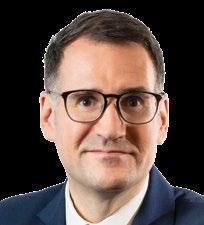
Meanwhile, China is actively preparing for a post-dollar world. Beijing is ramping up gold accumulation, promoting trade settlement in yuan, and seeking greater influence in global gold pricing. Xi Jinping’s regional diplomatic tour underscores China’s strategy to strengthen non-dollar trade ties across ASEAN and beyond. It is a contrast in symbolism as well as policy: the U.S. dollar still bears George Washington’s image, while the Chinese yuan features Mao Zedong—a reminder that China’s Communist legacy is still firmly imprinted on its currency and policies.
Nowhere is the cost of dollar dominance more evident than in Africa. Though the U.S. represents less than 9 per cent of Africa’s trade, over 50 per cent of transactions are still settled in dollars. This disconnect costs the continent over $5bn annually in conversion fees, exchange risks, and over-reliance on foreign financial infrastructure. The Global South, led by African nations, is beginning to realise that currency independence is not just a political goal—but an economic necessity.

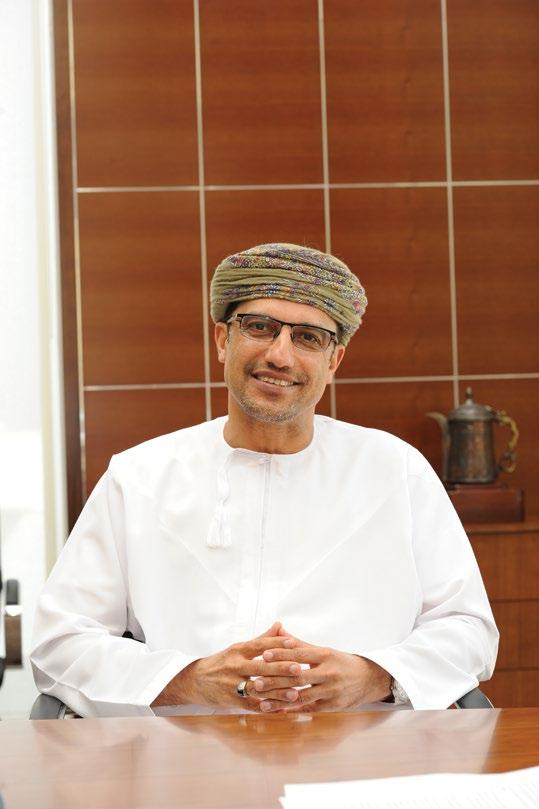
Group CEO, Oman International Development and Investment Company (Ominvest)
AbdulAziz Mohammed Al Balushi serves as the Group CEO of Oman International Development and Investment Company SAOG (Ominvest). With over 39 years of professional experience in financial services sector, he possesses a profound understanding of global market dynamics. Since joining Ominvest in 2014, AbdulAziz and his management team have successfully implemented a transformative vision articulated by the Board of Directors, reshaping the company’s culture, structure and policies.
Under his leadership, the team executed the merger between Ominvest and ONIC Holding, establishing Oman’s largest publicly listed investment company. His tenure
CEO, National Bank of Oman
Abdullah Zahran Al Hinai is the CEO of NBO. Having held a number of senior management positions in the banking sector, he is an industry veteran with over two decades of experience. Prior to his current role, he was the Chief Wholesale Banking and Strategic Growth Officer at a leading financial institution, and was credited for setting up the organisation’s Strategic Growth function and architecting a number of ground-breaking transactions in both investment and commercial banking. Al Hinai serves as a Board Member of Oman Banks Association. He has also held several board memberships

also saw several significant initiatives, including the IPO of its flagship insurance company National Life, the development of the Ominvest Business Centre, and the merger of National Finance and Orix Leasing Company. Furthermore, he spearheaded capital-raising efforts, including a perpetual bond issuance, and played a vital role in the merger of Oman Arab Bank with Alizz Islamic Bank, which facilitated Oman Arab Bank’s listing on the Muscat Stock Exchange as an SAOG. AbdulAziz also led NLGIC’s acquisition of RSA Middle East, positioning NLGIC among the top ten insurance companies in the region. Currently, he holds the position of Chairman of Ubhar Capital, Chairman of Oman Real Estate investment and services LLC, Deputy Chairman of Jabreen International Investment Company SAOC. Additionally, he is a board member of Oman Arab Bank SAOG, National Finance Company SAOG, and LIVA SAOG Bahrain, as well as Injaz Oman.
across various industries including manufacturing, investment and urban development. Al Hinai holds an Executive Masters in Business Administration from the International Institute for Management Development (IMD) in Lausanne, Switzerland, a Postgraduate Diploma from Manchester Business School, UK, and a B.Sc. in Business Administration from Boston University, USA.
He also attended the Advanced Management Program (AMP) at INSEAD, Fontainebleau, France, the General Management Program (GMP) at Harvard Business School, Boston, MA, USA, and is a holder of Chartered Financial Analyst designation as well as being a Certified Public Accountant (USA).
Group CEO, Asyad
Abdulrahman Salim Al Hatmi is the Group CEO of ASYAD, Oman’s flagship logistics and supply chain group, offering end-to-end solutions from ports, free zones, maritime shipping and last-mile express delivery. Abdulrahman is a logistics pioneer and a business-growth leader; building startups, establishing competitive businesses and advancing homegrown companies to become global brands. Al Hatmi was a key player in the development of Oman’s National Logistics Strategy 2040 – now overseeing
CEO, Sohar International
Abdul Wahid Mohamed Al Murshidi is the CEO of Sohar International. He has over 18 years of extensive experience in various banking functions, including Audit, Finance,
Investment, and Islamic Banking. He joined Sohar International in July 2019 and previously served as Deputy General Manager at a prominent local Islamic bank. Al Murshidi is spearheading the bank’s initiatives aimed at achieving exponential and sustainable growth. He holds an Executive MBA from the London Business School and a Bachelor of Science from Sultan Qaboos University.

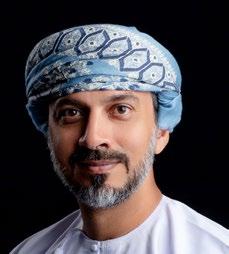
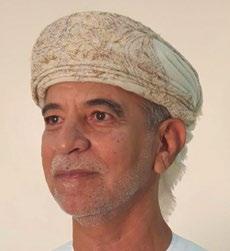
Abdullah Nasser Al Hadhrami is the CEO of Gulf Mushroom Products Company. He has served over 30 years in the government and private sector in Oman. He has travelled extensively across the globe and attended numerous seminars and workshops for senior corporate executives on industry, business and management practices and corporate governance. He has a Master’s
CEO, SalamAir
Adrian Hamilton-Manns is the CEO of Oman’s budget airline SalamAir. With a career spanning over eight years as a CEO in the aviation sector, HamiltonManns brings a wealth of experience and a fresh strategic vision to the airline. Hamilton-Manns’ appointment marks a significant phase for SalamAir,
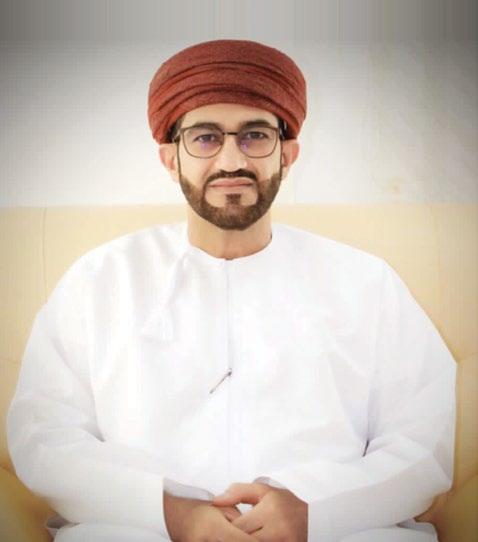
CEO, Al Omaniya Financial Services
degree in Science from University of New Haven, USA. The Gulf Mushroom Products Company is an Omani public company listed on the Muscat Stock Exchange.
Established in 1997, it has its head office and flagship mushroom farm in Barka besides a state-of-art compost factory in Thumrait and a branch in UAE. The company is largely export oriented and moves about 90 per cent of its production to markets outside Oman.
as the airline seeks to expand its horizons and enhance operational efficiencies. His career spans 28 years in aviation executive management, with a notable 14 years dedicated to the low-cost airline industry.
His previous roles at renowned airlines such as South African Airways, Virgin Australia and FlyArystan highlight his capability to drive significant growth in challenging market environments.
Managing Director, Petroleum Development Oman (PDO)
Dr Aflah al Hadhrami was recently appointed as the managing director of Petroleum Development Oman (PDO). He is the first Omani national to head the company. Dr Aflah has been working in the Oil and Gas sector for almost three decades starting in the early 1990s and has excelled in executive, operational and commercial roles, in multinationals and government. Prior to his appointment at PDO, he served as the CEO of Integrated Gas Company (IGC). He also served as the CEO of Alshawamikh Oil Services, where he drove exponential business growth. His professional career started with Petroleum Development of Oman (PDO), and thereafter
Aftab Patel is the founding member, promoter, and CEO of Al Omaniya Financial Services, the premier non-banking financial institution in the Sultanate. Al Omaniya has evolved from a humble beginning in 1997 to a pioneer and unequivocal leader in its industry. Aftab Patel is a commerce graduate and a chartered accountant. He started his career with AF Ferguson and Co in Mumbai and then moved to Associated Cement Company. He moved to Muscat in 1984 and was with Omar Zawawi Establishment (OMZEST). In 1990, he was appointed profit centre head for Bank Muscat. In 1997, he helped found Al Omaniya along with a group of investment bankers and pension funds. Patel was listed among 50 best CEOs in the GCC in

followed increasingly important and senior leadership roles at various oil and gas organisations namely in senior supply chain management positions at Oman Refinery LLC, Schlumberger Overseas S.A, and Occidental Oil and Gas Corporation where he was VP of Middle East Supply Chain Management (VP ME SCM). Dr. Aflah also worked in BP, managing the Middle East Region as Regional Director for BP Exploration Middle East.
He holds a PhD from the University of Liverpool (UK) in Business Management. He is also a member of the Royal Chartered Institute (MCIPS UK) and CILT. In addition to his work in Oil and Gas, he lectured for 5 years at Sultan Qaboos University as an adjunct lecturer at the College of Economy and Political Science.
a ranking by INSEAD Business School and Deloitte for the year 2016, and was conferred with Lifetime Achievement Award at the GCC Banking Summit in 2016. Under his stewardship and vision, the company has been rated as the number one Non-Banking Financial Institution by Ernst & Young in 2006, 2008, 2010, 2011 and 2012.
The company has also been rated as number one Non-Banking Financial Institution by OER and GBCM, when they first instituted this award in the year 2012. Patel is on the board of directors of Dhofar Cattle Feed SAOG and also chairs the board Audit Committee. He is a board member of Oman India Friendship association since its inception in 2020 and has also been nominated as the Board member of Indo Gulf chamber of Commerce Oman Chapter (under formation).


Eng. Ahmed Al Amry is the CEO of Oman Airports. He has extensive leadership experience in several major companies, with a proven track record in managing strategic projects, implementing governance frameworks, and leading institutional transformation programs in multiple sectors. He also oversaw the execution of several major projects in the oil and gas sector during his tenure as Vice President of Project Delivery at OQ, Additionally, he led and executed technical and operational projects at both Oman LNG and Qalhat LNG, gaining
Managing Partner EY Muscat and MENA Tax Leader
Ahmed Al Esry is the Managing Partner of EY Muscat office and MENA Tax Leader. Ahmed’s experience spans across servicing oil and gas, construction, manufacturing and financial services industries where he has led tax advisory, audit, and consulting assignments across the region. He has assisted with the acquisition of new businesses for both
deep expertise in managing large-scale projects.
Throughout his career, he has held a number of prominent leadership positions, including Chief Transformation Officer at Oman Air and Oman Airports, and Acting Chief of Commercial Operations Unit at Oman Airports.
Eng. Al Amry holds a Master’s degree in International Construction Management and Engineering from the University of Leeds – United Kingdom, in addition to a Bachelor’s degree in Civil and Structural Engineering from the University of Bradford.
local and multinational companies, leading on multi country tax due diligence projects. Ahmed was actively involved in introducing Islamic Banking in Oman, working closely with the banking industry and Central Bank of Oman. He joined EY over 20 years ago from Petroleum Development Oman, the national oil company of Oman. Ahmed holds a Bachelor of Commerce Degree from the University of Nairobi, Kenya. He is also a member of the ACCA, UK.
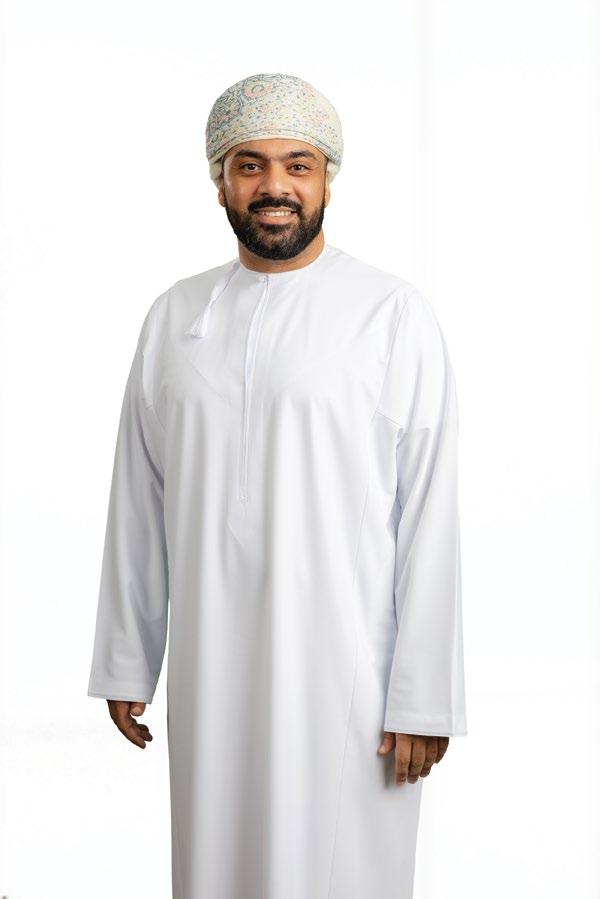
Group CEO, Nama Group
Ahmed Amur Al Mahrizi is a transformative leader at the helm of one of Oman’s most vital national groups. As Group CEO of Nama, he spearheads the strategic oversight of the Sultanate’s electricity, water, and wastewater sectors— industries central to the country’s economic resilience and future readiness. Renowned for driving bold reforms and unlocking long-term value, Al Mahrizi has led Nama through one of the most ambitious restructuring and privatisation programs in the region. His leadership has been instrumental in modernising utility governance, optimising
operational performance, and setting a new benchmark for public-private collaboration in critical infrastructure.
Prior to joining Nama, Al Mahrizi held senior executive roles in the telecommunications industry, including more than a decade with Virgin Mobile Middle East & Africa. There, he played a foundational role in launching and scaling disruptive mobile ventures across highgrowth markets. His approach to leadership is shaped by global exposure and executive education from leading institutions including IMD, reinforcing his commitment to governance excellence and sustainable transformation.
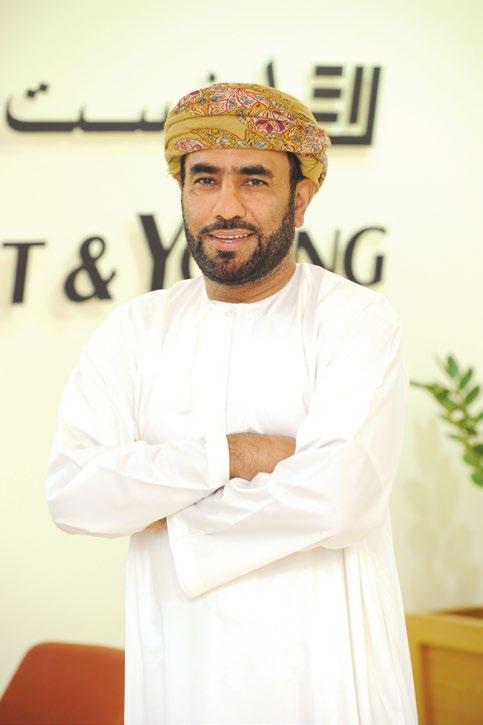
and inventory in OQ and was the CEO of Oman Logistics company SAOC (Khazaen) before joining OQ.
He is the board member of Abraj Energy Services and Musandam Power Company, with previous board appointments as the chairman of OQGN, OQ logistics, a member of the board of trustees in the International Maritime College, a member of the Sultanate of Oman Logistics Strategy 2040. He holds a BSc. in Physics from Imperial College London and an MEng in Petroleum Engineering from Heriot-Watt University, Edinburgh.
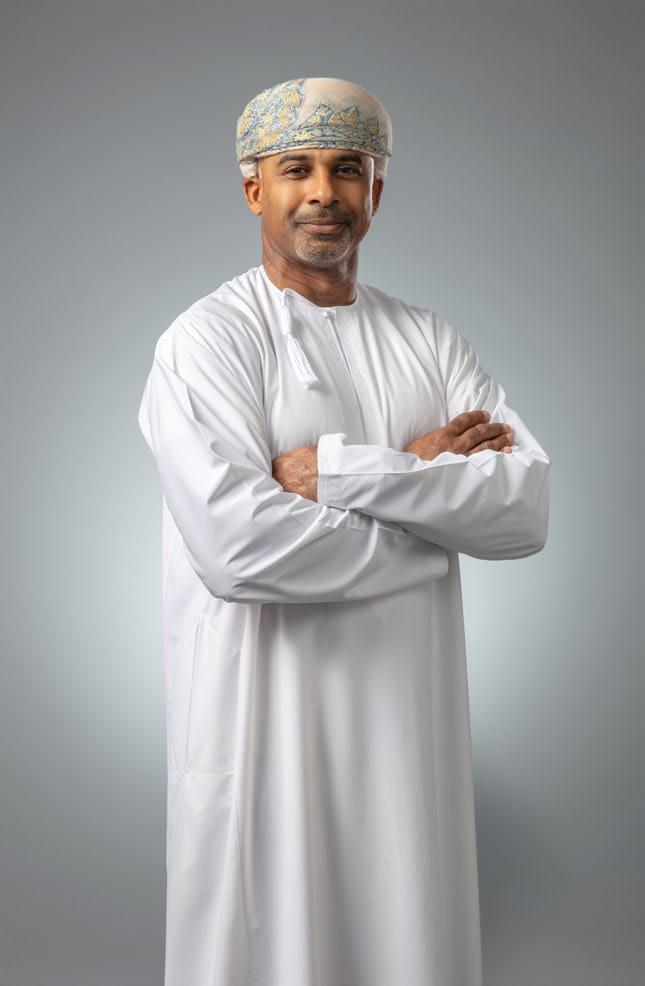
CEO, Muna Noor
Ahmed Barwani is the CEO of Muna Noor, a leading Omani manufacturing company specialising in advanced piping systems and innovative water solutions. With a strong engineering and business administration background, Ahmed has spearheaded numerous initiatives to enhance sustainability and efficiency within the industry.
CEO, Nama Power and Water Procurement
Ahmed bin Salim Al Abri is the CEO of Nama Power and Water Procurement Company, the exclusive procurer of all electricity and desalination projects in Oman. He previously served as the General Counsel for the same company. His background includes extensive experience in corporate and commercial legal work, as well as expertise in various areas like contract drafting, negotiation, and
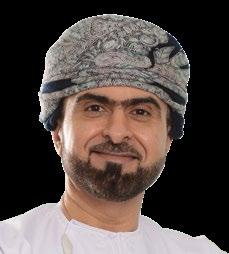
Under his leadership, Muna Noor has expanded its market reach, embracing cutting-edge technologies and fostering a culture of continuous improvement. Ahmed’s vision and strategic acumen have positioned the company as a key player in the region’s infrastructure development, driving progress and contributing to the economic growth of Oman.
litigation. He holds a Master’s degree in International Business Law and a Bachelor’s degree in Law.
Ahmed has been actively involved in discussions and initiatives related to Oman’s sustainability agenda and the development of renewable energy.
Country Leader for Oman & Yemen-CISCO

Ali Al Lawati is the Country Leader for Oman and Yemen- CISCO. With more than 20 years of experience in the Omani ICT market, Al Lawati has held various roles within the sector, including as CEO and Consultant and Head of Projects, in addition to having served on the Board of Directors for a commercial data centre entity. Prior to joining Cisco, Al Lawati was the CEO of Nasma Telecommunications and the Head of
CEO, Mazoon Dairy Company
Ali Al Buali, the CEO of Mazoon Dairy SAOC, is an accomplished C-level professional with over 16 years of experience in private equity, oil and gas, food, financial management, and audit. He has been the CEO of Mazoon Dairy SAOC since September 2022. He has a strong background in finance and accounting with experience in various companies, including

IT and Telecommunications Projects at Petroleum Development Oman. Ali holds a double master’s degree: one for communications systems and signal processing from Bristol University in the UK and the second in business administration (MBA) from the Strathclyde University, also in the UK. He earlier received his bachelor’s degree in electrical and electronics engineering from Sultan Qaboos University in Oman.
Fisheries Development Oman, Oman Investment Fund, and Shell. Ali completed their Bachelor’s degree in Accounting from Sultan Qaboos University.
Ali then pursued a Master of Business Administration (M.B.A.) with a specialisation in Business/Managerial Economics from Sultan Qaboos University. Ali also holds a certification as a Certified Public Accountant (CPA) from the American Institute of Certified Public Accountants.

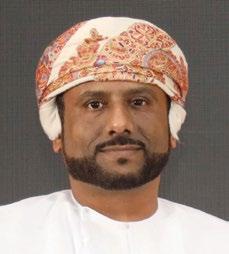
CEO, Salalah Mills Group SAOG
Eng. Ali Bakhit Hassan Kashoob is the CEO of the group. He has about 20 years of experience in strategic management, growth planning, and management of change, Strategic marketing and corporate communications.
Prior to joining the group, Eng. Kashoob was the CEO of Atyab Food Industries. Eng. Kashoob has a Master’s degree in Business Management from Strathclyde Business School in the UK. He also has a Bachelor of Science
CEO, Alizz Islamic Bank
Ali Al Mani is the CEO of Alizz Islamic Bank. Ali has over 22 years of experience in the Finance and Banking industry in both Islamic and Conventional banks, with expertise across areas of Corporate Banking, Retail Banking, Operations, Finance, Project Management and Technology.
He has held various leadership positions at major local banks and prior to joining Alizz Islamic Bank,
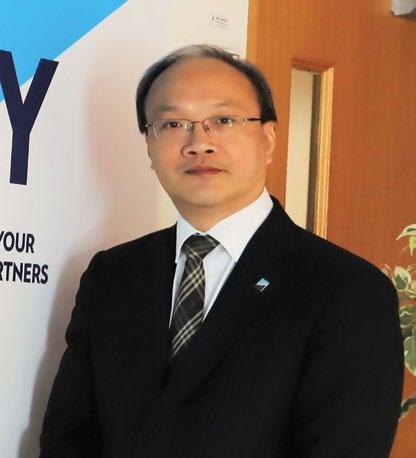
degree from Sultan Qaboos University. In addition, he graduated the CEOs Programmes from IMD Institute in Switzerland. In his capacity as the CEO of Salalah Mills Group, Eng. Kashoob aspires to lead the group to a new phase of innovation, operative excellence, and strategic expansion and to further its role in supporting food security and industrial progress in Oman.
Al Mani was the Deputy CEO of National Finance Company overseeing the performance of one of the largest finance companies in Oman.
Ali Al Mani holds a Master’s degree in Innovation, Leadership and Management from York University, United Kingdom. He also has a Bachelor’s of Arts in Computer Applications and Internet from the University of Bedfordshire, United Kingdom, in addition to a number of specialised qualifications in Banking and Finance.
CEO, Hutchison Ports Sohar
With an impressive work history and knowledge of three decades in the maritime logistics industry, Anacin Kum started his career in the shipping business and held various senior executive positions in P&O Nedlloyd before joining Hutchison Ports in 1998. Kum was assigned to its investment in the Sultanate of Oman as the CEO of Hutchison Ports Sohar since 2018, overseeing the container terminal business. Prior to Sohar Port, Kum held various CEO and senior management positions of
Group CEO, OQ
Ashraf Al Mamari has over 19 years of experience in various organisational leadership roles, including Human Resources, Corporate Affairs, and Strategic Management.
He holds a Bachelor’s degree in General Management from Sultan Qaboos University and is currently enrolled in a Doctor of Business Administration (DBA) programme with Coventry University. Al Mamari has held multiple leadership positions in the energy

Yantian & Hong Kong in China. Hutchison Ports is the port and related services division of CK Hutchison Holdings Limited (CK Hutchison). Hutchison Ports is the world’s leading port investor, developer and operator with a network of port operations in 52 ports spanning 26 countries throughout Asia, the Middle East, Africa, Europe, the Americas and Australasia.
sector in Oman and abroad. He joined OQ in 2013 as a Learning and Development Manager in one of the Company’s legacy companies, Takatuf Oman.
He then worked in OQ Exploration and Production and OQ Chemicals in Germany before leading the People, Technology and Culture function of OQ. He is also a member of the Board of Directors of Abraj since 2017 and a member of the Board of Directors of Marafiq since 2023. He was previously a member of the Board of Directors of OPAL and InstOG.

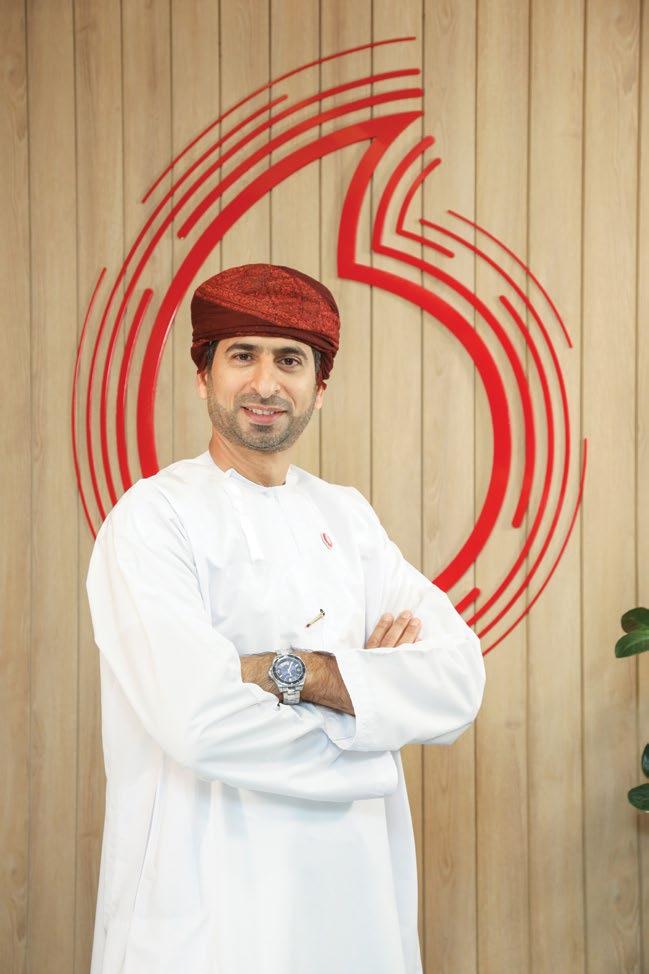
CEO, Vodafone Oman
Bader Al Zidi was appointed CEO of Vodafone in Oman in October 2021, with almost two decades of experience working in ICT. His business and strategic acumen, coupled with a forward-thinking digital perspective, helped him navigate the successful set-up and launch of the third telecom operator in the Sultanate of Oman.
Al Zidi’s career started with Omantel, before moving to Oman Broadband, where he ascended to become CEO in 2020. Under his leadership, the company surpassed targets and achieved several operational milestones, including the introduction of new products
CEO, Mwasalat
Badar Mohammed Al Nadabi is the CEO of Mwasalat, Oman’s national transport company. He has experience that spans over 26 years in senior leadership positions, including Marketing, Technology, Finance, Human Resources, Supply Chain & Corporate Affairs. He also has extensive experience in developing corporate culture and driving change & digital transformation projects.
Oman National Transport Company “Mwasalat,” a member of ASYAD Group, has been engaged in
such as Leased Capacity services; significant growth of its annual revenues to more than RO18mn; and increased sales volumes to more than 150,000 active broadband connections across Oman, in line with the Sultanate’s National Broadband Strategy. During his time at Oman Broadband, he represented the company as a Board Member in the FTTH MENA council and chaired the Policy and Regulation Committee. Al Zidi holds a Bachelor of Applied Science (BASc) and a Master’s (MBA) in Business Administration and Management from the University of Strathclyde, UK. In addition, he has a certification in Corporate Finance and Strategy from London School of Economics, UK, and a Master of Program Management from George Washington University, United States.
offering a modern and efficient public transport system. Mwasalat is reshaping its business units to ensure they are equipped to take advantage of emerging trends in public service sector.
These steps are targetted at making Mwasalat more agile, cost-efficient with the focus to improving safety, reliability, and quality of public transport services. Mwasalat has invested in developing intelligent transportation system, with the aim of creating additional values and enhancing customer satisfaction and is working on a daily basis with its stakeholders to provide a World-Class Public Transport service.
CEO, Oman Air
Con Korfiatis is the CEO of Oman Air. He has extensive aviation experience, including leadership roles across Asia Pacific and the Middle East. A highly accomplished leader with over 30 years of experience in the aviation industry, he is set to steer Oman Air’s ongoing transformation, which aims to turn the airline’s financial operations around.
CEO, Madayn
Eng. Dawood bin Salim Al Hadabi is the CEO of Madayn. With his Master in Business Administration and Information Technology from Coventry University and Bachelor of Science in Civil Engineering from Glasgow Caledonian University, Eng. Dawood Al Hadabi has over 24 years of expertise


His three-decade-long career includes numerous CEO appointments across Asia-Pacific and the Middle East, with notable accomplishments including founding four start-up initiatives in Saudi Arabia, Indonesia, Singapore and China. He has also held a string of other executive management roles in finance, strategy, commercial, alliances, operations, network, branding and marketing, across some of the world’s most successful airlines.
and fruitful track record in various fields.
Al Hadabi served as the Director General of Samail Industrial City during the period from 2010 to 2023, and as the Director of Technical Affairs and Acting Director General of Al Rusayl Industrial City during the period from 2008 to 2010.
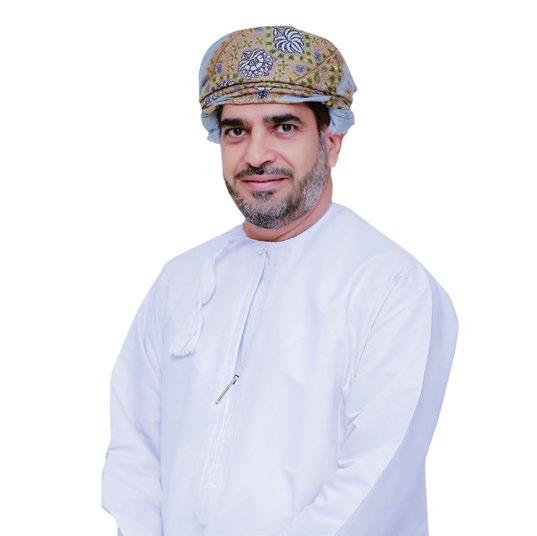
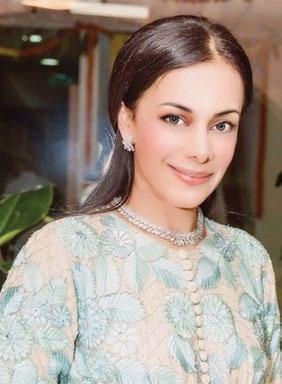
Group CEO, Bahwan CyberTek Group
Executive Director, Al Tasnim Group
Devaki Gulabsi Khimji’s journey in Al Tasnim Group began in 2012 and has been an extremely dynamic one so far. Upon joining, she restructured the group into manageable divisions and with focused approach and sheer dedication navigated and propelled the group in the right direction through the introduction of new product lines.
She has led the group to become one of the most diverse, dynamic, professional, ingenious and successful business conglomerates in Oman and other GCC countries. Khimji combines her passion for fitness with
S. Durgaprasad is the co-founder, director and group CEO of the Bahwan CyberTek Group, a global provider of digital transformation solutions. In his experience, spanning over 30 years, he has led several organizations in their growth journeys making them strategic business partners. A people-centric leader, Durgaprasad brings a unique combination of intense focus on value delivery, business acumen, and hyper customer centricity that have been instrumental in elevating Bahwan CyberTek Group’s standing in the global IT landscape. His hands-on leadership has carried the organisation from strength to strength, facilitating its growth and today
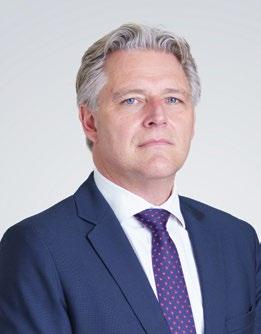
CEO, Oman Cables Industry
a keen business sense, which has made her one of the most successful entrepreneurs in the fitness industry.
She is solely responsible for the smooth functioning of all K11 projects, which have grown from a band of 11 people to a company with almost 400 employees due to her vision and management abilities.
She has served as the managing director and partner of India Circus, a company dedicated to online retail of lifestyle products in India. Her business acumen and foresight were essential to India Circus’ launch and financial growth.
stands tall as a 4000+ member-strong organisation, catering to over 1,000 global customers. Durgaprasad’s deep understanding of the market and his passion for creating a world-class IP-driven organisation have led to the launch of BCT’s flagship product suites, joint ventures and multiple global business initiatives.
Based on the growth and evolution of BCT, the company was featured in two case studies by Stanford University making Bahwan CyberTek the only organisation from the region to be featured by Stanford University. An Engineer from College of Engineering (Anna University), Chennai, DP did his management development programme at Kellogg and XLRI.
CEO, SOHAR Port
Emile Hoogsteden is the CEO of SOHAR Port, a joint venture of the Port of Rotterdam Authority and ASYAD Group. Emile has worked for the Port of Rotterdam Authority for 15 years and served as VicePresident Commercial. Emile brings a solid track record of building and managing robust business strategies in the global logistics’ industry.
His stellar background will continue to pave the
Erkan Aydogdu is the CEO of Oman Cables Industry. Aydogdu, coming from his recent position as the CEO of Oceania and Southeast Asia at the Prysmian Group, brings a wealth of experience from his various roles within the Prysmian Group. He holds a Global Executive MBA from SDA Bocconi University in Milan, earned between 2015 and 2017. Oman Cables Industry holds a prominent position among the top 100 global
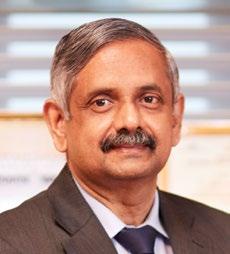
way for more growth opportunities for the port and tenants at SOHAR. Under this new leadership, SOHAR will continue to be one of the fastest-growing Port and Freezone complexes in the world.
To date, the company has attracted close to $30bn in investments by serving diverse industries including metals, raw materials, and plastics to name a few. As a future-ready port capable of welcoming the world’s largest container vessels, SOHAR will take a leading role in achieving the national economic priorities within the Oman 2040 Vision.
wire and cable producers. It is recognised for its advanced facilities and outstanding services, offering a comprehensive range of electrical products.
These products include medium voltage power cables, low voltage power and control cables, instrumentation cables, pilot cables, overhead power transmission line conductors, and building wires. Aydogdu has strong capabilities in areas including logistics, continuous improvement, research and development, quality assurance, and management.
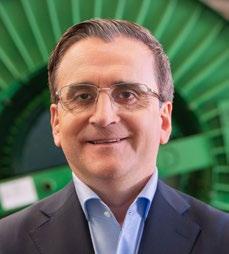

Acting CEO, BankDhofar
Karumathil Gopakumar is the Acting CEO of BankDhofar. He joined BankDhofar as Deputy CEO in November 2021. He is a veteran finance professional with more than 31 years of experience in various leadership roles in Wholesale Banking, Retail Banking, Treasury & FI, Investment Banking, Asset Management, Private Banking,
CEO, Oman Flour Mills
Haitham Mohamed Al Fannah was appointed as CEO of Oman Flour Mills (OFM) in April 2018. Prior to joining OFM, Al Fannah spent 17 years at Al-Sulaimi Group, and had been CEO of the company since March 2016. He was earlier the chief operations officer.
Al Fannah received a bachelor’s degree in business administration from the University of Missouri,

Financial Control and Operations with renowned financial institutions. Prior to joining BankDhofar, Gopakumar held several leadership positions at banks in Oman. He is a Chartered Accountant, Cost Accountant and Company Secretary from India, a member of the Chartered Institute of Management Accountants, London, Member of the ACI - The Financial Markets Association, London and a Member of the Corporate Treasurers, London. He also holds an MBA from IMD Lausanne, Switzerland.
St Louis, USA, and a master’s degree in business administration from the University of Strathclyde, UK.
Oman Flour Mills is engaged in the milling and food processing sector. The company’s primary activities are milling of wheat and other cereals, flour sales, and the processing and sale of animal feed. The company’s flour products are sold under the Dahabi brand, while its feed products are marketed under the Barakat brand.
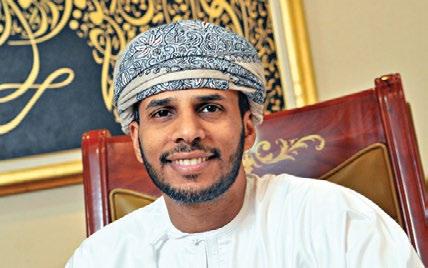
CEO, Oman LNG
Hamed Al Naamany is the CEO of Oman LNG. Hamed assumed charge at a time when Oman LNG embarked on a two-pronged strategy designed, on one hand, to boost output through a major debottlenecking exercise coupled with the power project to reduce Greenhouse Gases (GHG) footprint; and on the other, to extend the life of the LNG business well beyond its current concession that expires in 2025. He has over 20 years in the industry, including working at Oman LNG and
CEO, Al Maha Petroleum Products Marketing Company
Hamed bin Salim al Maghdri is the CEO of Al Maha Petroleum Products Marketing Company. Since joining, Al Maghdri has been utilising his significant oil and gas experience to strengthen the company’s foundations and grow sales revenues and profits, while delivering a high-value added service to its primary customers throughout Oman.
international roles in LNG Ventures in Europe, the United States and Canada. During his tenure, Hamed held diverse roles in Technical Operations, Production and Project Management, and Business Development.
In 2016, Hamed returned to Oman LNG from international assignment to lead the LNG plant rejuvenation, Power Project and the Debottlenecking Project prior to his appointment as Oman LNG’s Chief Strategy and Transformation Officer.
Al Maha supplies high-quality fuel and petroleum-based products to the retail, industrial and aviation markets. Its network of over 195 service stations is supported by an effective and efficient distribution organisation. As one of the three major petroleum products marketing companies operating in the Sultanate, Al Maha offers first-class customer service while providing value for money. The company strives to continually develop and improve its products and services.

CEO, Muscat Bay
Sheikh Hamood Sultan Saif Al Hosni is the CEO of Muscat Bay, a luxury community nestled in a picturesque natural cove at the foot of the Al Hajar mountains. Muscat Bay, previously known as Saraya Bandar Jissah, was formed in 2008 through a partnership between Saraya Oman Holdings and the Government of Oman’s tourism development and investment arm, Omran. In his current role, Al Hosni provides direction and guidance in the strategic development and execution of the project, as well

CEO, Liva Insurance
as building and enhancing relationships with regulatory bodies, government agencies, industry specialists, key account clients, and the public at large. In addition, Al Hosni oversees all matters related to marketing and sales, financial modelling and project finance, and nurtures a work culture that places integrity and personal growth at the centre of its ethos. Al Hosni began his career in 1994 as a civil engineer at Muscat Municipality, where he went on to become director general of technical affairs in 2007. He graduated with a Bachelor of Science in civil engineering from Sultan Qaboos University in 1994.
CEO, Galfar Engineering and Contracting Company
Dr. Hammoud bin Rashid Al Tobi is the CEO of Galfar Engineering and Contracting Company.
Dr. Al Tobi is an accomplished CEO with a track record of working or complex assignments and
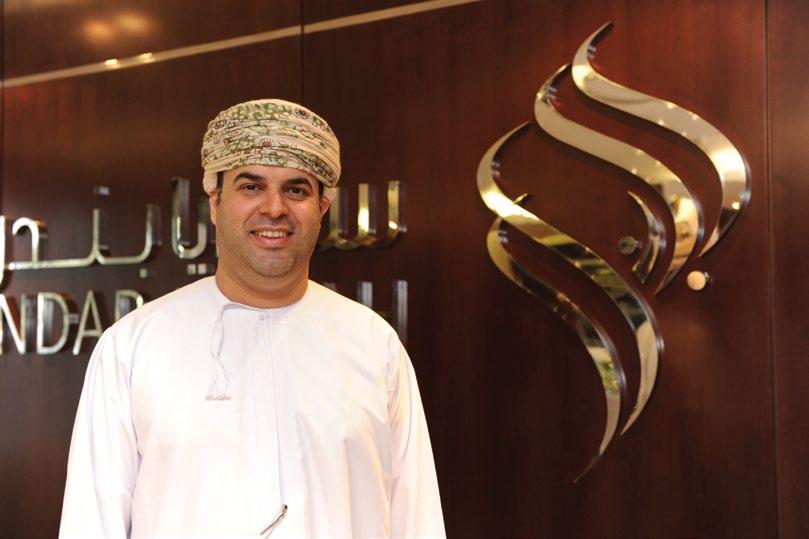
leading organisational transformations. Al Tobi has spent over 16 years working within the oil and gas industry, having served with Petroleum Development Oman (PDO) and Royal Dutch Shell. Over the past six years, Al Tobi had been spearheading Al Shawamikh OiI Services as CEO, making significant achievements and reforms during his tenure.
Hanaa Al Hinai is the CEO of Liva Insurance, one of the leading insurance players in Oman. She began her career over two decades ago in the banking industry in one of Australia’s largest banks, Westpac, in the field of Financial Advisory for a couple of years, followed by 16 years in the banking sector in Oman. This diverse background provided a strong foundation in retail banking, investments, digital transformation, strategy implementations, product innovation, and understanding of regulatory frameworks. In 2021, she joined RSA Middle East as the Deputy CEO for UAE and Bahrain operations

before joining Al Ahlia Insurance in Oman as the CEO. She has participated in numerous leadership programmes, including the Oman National CEO programme with IMD, London Business School, Queen University to name a few.
These educational and leadership trainings have been instrumental in shaping her strategic vision and contributed to receiving awards such as the ‘Premium Insurtech CEO of the Year’ and ‘Insurance CEO of the Year’ and “Woman of the Year.” A significant milestone in her career was overseeing the successful integration of NLGIC and Al Ahlia Insurance.
CEO, Jindal Steel Sohar
Harssha Shetty is the Chief Executive Officer of Jindal Steel Sohar. Located in Oman and with a capacity of 2.4 million tons per annum, the company is one of the largest integrated steel producers in the Gulf of Arabia, and has one of the lowest carbon footprints in the international steel industry.

Harssha has 20 plus years of diversified leadership experience in Aluminium, Zinc and Steel industries. His past leadership roles include Chief Marketing Officer with Jindal Steel & Power Ltd India, Chief Marketing Officer-Aluminium business (BALCO & Vedanta Aluminium) and Chief Marketing Officer- Hindustan Zinc Ltd (Vedanta Group) and member of the Executive Committees in the Vedanta group companies.
Group CEO, Raysut Cement Company
Dr. Hilal Al Dhamri is the Group CEO of Raysut Cement Company since May 14, 2024. He has over 24 years of experience in the Cement industry. RCC is the largest Cement Company in Oman that has capacity production of 6.5-million-ton cement annually having several subsidiaries in Oman and internationally.
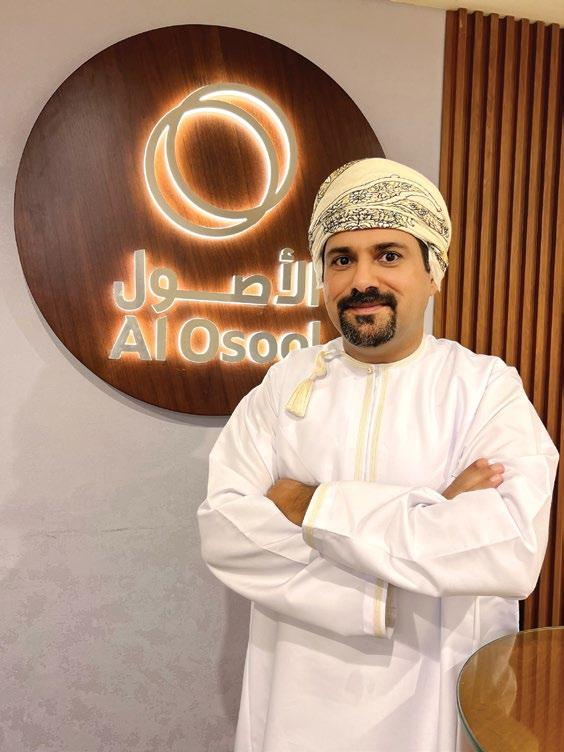
Dr. Hilal received his MSc in Chemistry from Sultan Qaboos University, Oman in 2010 and PhD in
Civil Engineering from University of Leeds, United Kingdom in 2019. He was awarded MBA from Hut International Business School in London in 2021. He has made significant contributions towards the growth of the cement industry in Oman. His work has helped elevate the cement sector to lead in circular economy practices and integrate industries in Oman to achieve best-in-class waste management. He has published extensively in international journals. His research has been applied in industry, including the utilisation of byproducts from aluminum smelters, petroleum refineries, and oil drilling operations.
Chairman and Managing Director, Al Osool Group
Hassan Mohammed Juma is the Chairman & Managing Director of Al Osool Group. With over 25 years of leadership experience in various aspects of business management, including real estate, industry, project management, banking, and business development; he oversees the Group’s strategic direction and
CEO, Oman Qatar Insurance Company (OQIC)
Hasan Yaseen Al-Lawati is a prominent figure in the insurance industry, serving as the CEO of Oman Qatar Insurance Company (OQIC) since 2020. His leadership has been instrumental in shaping the company’s success. Under his guidance, OQIC seamlessly integrated its operations with Vision Insurance, solidifying its market presence and showcasing Hasan’s strategic vision and ability to navigate complex business environments. This achievement earned him recognition as one of the top 100 CEOs in the Middle East, highlighting his exceptional leadership and impact on the industry. Hasan’s academic background and professional experience highlight his

continual growth. He has also chaired Oman Real Estate Association in the past and has acted as a Mentor in the Public Authority for SME Development (Riyada).
He is also a member of the Entrepreneurs Organization, as well as a Member of the International Real Estate Federation for Arab Countries(FIABCI). Additionally, he was awarded Business Leader of the Year of 2018.
commitment to achieving exceptional results. He possesses a Bachelor’s degree in Banking and Finance and Institutional Risk Management from Monash University. Further demonstrating his dedication to continuous learning, he has pursued certifications from renowned institutions, including Strategic Decision Making and Risk Management from Stanford University USA, ACII from the British Insurance Institute, and Institutional Innovation Certificate from Stanford University USA. Hasan actively contributes to the industry’s governance through his board positions. He serves as a Director for the Oman Insurance Association and a Vice Chairman for the Board of Directors of Omani Unified Bureau of the Orange Card. Hasan combined expertise, strategic thinking, and leadership have positioned him as a driving force shaping the future of the insurance industry.

CEO, OMRAN Group
Hashil Al Mahrouqi spearheads the OMRAN Group, as its CEO. Under his able leadership, OMRAN Group, the executive arm for tourism development in the Sultanate of Oman, is on a consistent path towards the development, and progress of the tourism sector, viably contributing to drive growth, economic diversification, and boost investment returns, in line with the objectives of Oman Vision 2040 and the National Tourism Strategy. Al Mahrouqi’s distinguished experience in the management of a range of mixed-use real estate developments and tourism investments, managing local and international real
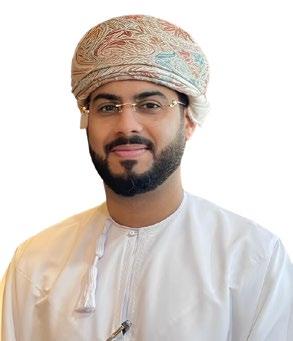
estate investment portfolios in the sectors of hospitality, entertainment, logistics, retail and multi-purpose projects, has helped enrich the OMRAN Group’s strategic direction, and way forward business plans. He has held many senior positions in the Oman Investment Authority and named to a number of Boards of Directors and associated committees within the Authority’s real estate investments in both the United Kingdom and the Republic of Germany. Al Mahrouqi holds a PHD in Philosophy - Information Studies from Sultan Qaboos University, in addition to multiple academic and professional qualifications in the fields of investment, real estate management and leadership from prestigious institutions, including the Harvard Business School, and the INSEAD International Business School.
Director and CEO, Business Gateways International LLC (BGI)
Hemant is actively involved in the IT Industry for over 30 years, having extensive background in implementing and overseeing National level IT-related Projects. As a seasoned Management and IT Professional, he has varied experience in multiple development platforms. Hemant has led several teams on Local Content (ICV), Procurement, Subsidy Deployment and FDI Implementation Strategies in Oman.
He is one of the Founders of BGI that he helped establish in 2010. As the Chief Architect of the award-winning

Portal www.businessgateways.com, Hemant has also consistently played significant roles in successfully implementing multiple Governmental IT Platforms in Oman.
Hemant currently leads BGI as its Director & CEO, with operating offices in Oman and India. As an IT Platforms specialist company, BGI operates important IT projects in Oman, in line with Government of Oman’s strategic objectives. Hemant is a passionate champion of Local Content and is a sought-after Panel Speaker around the world on various IT and Governance related topics. With Hemant at the helm, BGI is also architecting two major platforms of global impact related to Trade Corridors and Net Zero enablement.
Group General Manager, Al Tamman Investments LLC
Himansu Mohapatra is the Group General Manager of Al Tamman Investments LLC, which is primarily engaged in investment activities including security portfolio and other businesses through the subsidiaries and associate companies. Himansu has over 18 years’ experience that spans into investment banking, portfolio management, private equity, real estate development, strategic management and organisational development. He has set up, acquired and managed multiple new businesses and projects for the Group in real estate, education, healthcare, industrial, aquaculture, media &
CEO,
Development Bank
Hussein bin Ali Al Lawati is the CEO of Development Bank. Al Lawati has over 18 years of experience in the banking and finance sector with expertise in planning, innovation, growth and strategic partnerships. His most recent role was as the Chief Executive Officer of Muscat Finance Company. Prior to that, Al Lawati held senior management positions at BankDhofar, serving as
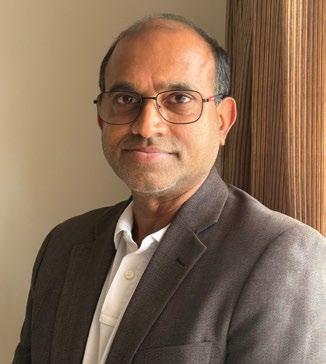
communication, entertainment and hospitality sector. He holds directorship in several companies including Gulf Investment Services Company SAOG, Deepak Oman LLC, Al Tamman Group Limited, MOG Holding Limited and English Education Management Company LLC.
He is also a member of the Executive Committee of Muscat Overseas Group Companies. His key fortes are investment evaluation, fund raising, deal structuring and negotiation, strategic tie-ups, setting up new ventures and executing exit strategies. He holds a Master Degree in Commerce (Advance Accountancy) and a Post Graduate Diploma in Business Management (Finance).
Deputy General Manager and Chief Corporate Banking Officer. In these roles, he managed substantial assets and fostered strong relationships with partners and customers. Development Bank (DB) is at the forefront of financing development and economic diversification in the Sultanate of Oman. Through the provision of tailored business loans and working capital for start-ups, SMEs and large enterprises in sectors key to Oman Vision 2040, DB plays a vital role in promoting sustainable economic growth and prosperity across the nation.
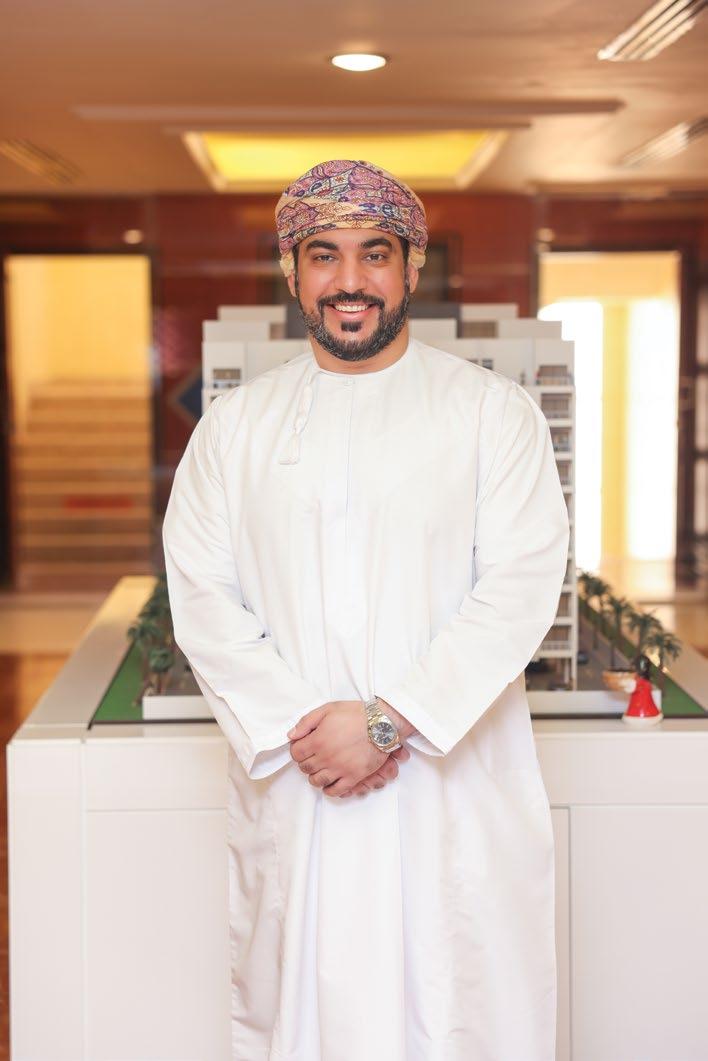
CEO, Al-Sulaimi Group Holding
Ibrahim Al Sulaimi is the visionary CEO of Al Sulaimi Group Holding, a role he has excelled in for several years. His leadership has been pivotal in guiding the Group Companies through significant transformations and driving remarkable growth. Under his stewardship, Al Sulaimi Group Holding has become a dominant force in its sector, achieving notable milestones in strategic expansion and operational excellence. Ibrahim’s strategic foresight and business skills have been instrumental in enhancing the company’s market leadership and broadening its portfolio of products and services. Before
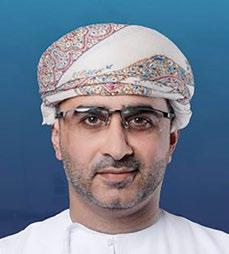
assuming his current role, Ibrahim held key positions including CEO of TTC, General Manager, Divisional Manager, Marketing and Business Development Manager.
Throughout his career journey, he has shown a strong commitment to forging strategic partnerships and implementing innovative business strategies that drive organizational success. Ibrahim’s leadership philosophy prioritizes customer satisfaction, operational efficiency, and sustainable business practices. He continues to lead Al Sulaimi Group Holding towards new heights, solidifying its reputation as a forward-thinking industry leader committed to excellence and innovation.
CEO, Siemens Oman
Jamie Hoyzer is the CEO of Siemens Oman. He joined the Siemens apprenticeship programme in 2002 and continued to work for the company in various roles in Germany, the UAE and Oman over the course of his career. He became the General Manager of Siemens in Oman in 2021 and CEO of Siemens in Oman in October 2022. Hoyzer is a seasoned manager with broad experience across the Siemens portfolio. In the past two decades, he has held multiple positions of
increasing responsibility in management, production, finance, controlling, sales and tendering, customer relationships and project management. As a business executive, Hoyzer is an advocate of implementing technologies in infrastructure and industries that transform our lives and protect our planet.
These days his focus is on melding technologies – such as artificial intelligence, cybersecurity, additive manufacturing, 5G and the future of automation – into a cohesive bundle that will create immense value for Siemens’ customers.
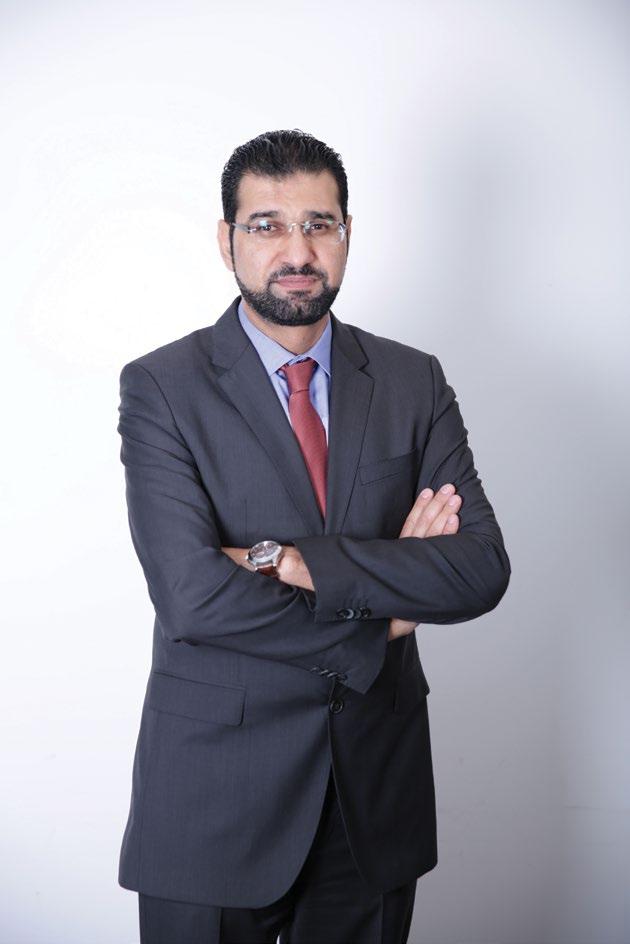
Khalid Al Kayed who is the CEO of Bank Nizwa is a financial industry veteran with over 25 years of experience. Al Kayed was the chief finance officer of the bank before taking on the current responsibility. As the CEO, he is responsible for spearheading the bank’s overall business growth and strategies. He won the Best Islamic Bank CEO at the New Age Banking Summit (NABS) and at the Global Islamic Finance Awards (GIFA) and was selected among
CEO, QNB Oman
Khalid Al Barwani is a seasoned banking professional with over 22 years of diverse experience across international, regional, and local banks. His expertise covers Corporate and Institutional Banking, Investment Banking, Treasury, and Islamic Banking. Khalid holds a Master’s degree in Economic and Business Policy
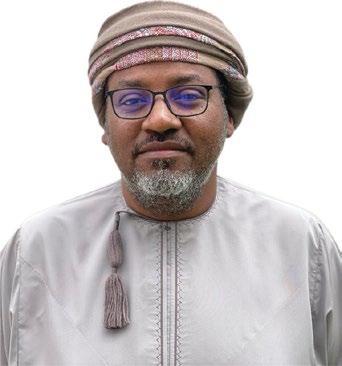

the top 500 leaders in Islamic Finance. Al Kayed holds a master’s in international accounting and finance from Liverpool University. He is also a Certified Management Accountant and Certified Financial Manager from Institute of Management Accountants and an alumni of Columbia Business School. Prior to joining Bank Nizwa, Al Kayed held various posts in a host of well-respected financial institutions including deputy CEO and chief financial officer at Jordan Dubai Islamic Bank, chief financial officer at Standard Chartered Bank Jordan and financial controller at offshore banking unit of Jordan National Bank Cyprus.
from the United Kingdom and has completed several prestigious executive leadership programs, including University of Cambridge and Wharton Business School. Khalid currently serves as the CEO of QNB Oman where he is spearheading the bank’s growth strategy. His strong leadership, in-depth market knowledge, and commitment to excellence have positioned him as a trusted leader in the banking sector, driving growth and innovation across multiple financial disciplines.
Khalid Al-Araimi is an experienced top-level executive who has made a significant and lasting contribution to business operations management. Boasting over 24 years of experience in the energy sector, his skills and knowledge are in high demand by notable local and international organizations, serving regions across the MENA, Southern Asia, Africa, GCC, and the UK. Al-Araimi’s strategic approach to business has consistently resulted in increased revenue generation, showcasing his adeptness at seizing strategic opportunities and implementing high-value business strategies. His leadership roles in companies such as Future Pipe Industry, Zenith Oilfield Technology, MI-SWACO, and Gulf Energy SAOC have been pivotal in driving business transformation and restructuring.
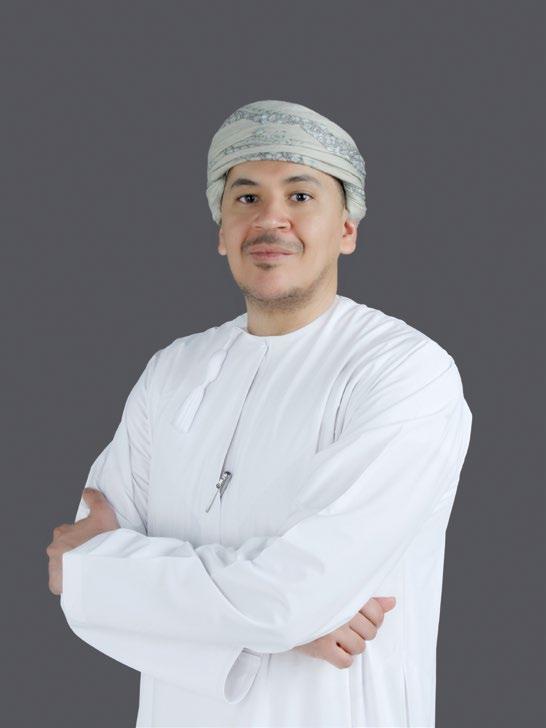
business growth. This hands-on experience in the startup ecosystem has been invaluable in strengthening his strategic decision-making and leadership abilities.
Sheikh Khalil Al Harthy CEO, Credit Oman
Khalil Al Harthy is an experienced leadership practitioner with a demonstrated history of working in the financial and management consulting industry. He is skilled in business planning, operations management, HR consulting, coaching, and entrepreneurship. From 1992 to 2003, he worked as a portfolio Manager for

General
Manager
- HONOR GCC
the Central Bank of Oman and from 2003 to 2010 as Assistant General Manager for Al Ahlia Insurance Oman. In 2010, he co-founded the Performance Factory, a management consulting firm. He joined Credit Oman SAOC which is Oman’s ECA on 2019 till date as a CEO. He holds a bachelor’s in finance from the University of New Orleans with a double-minor in MIS and management, insurance professional certification, and fellowship in International Compliance Association.
CEO, Towell Auto Centre (TAC)
For over two decades, S. Kasthurirangan has been at the helm of Towell Auto Group (TAG), one of Oman’s most prominent automotive distributors. Since taking charge as CEO in 2001, he has played a pivotal role in transforming TAC into a diversified business, representing iconic brands such as Mazda, Geely, JAC Lynk & Co., King Long, Bridgestone, TotalEnergies, Petronas & the premium segment of luxury and commercial vehicles.
Laurance Li brings 18 years of extensive experience in the mobile phone industry, with a decade dedicated to overseas assignments. His career spans a range of critical roles, including front-line channel sales, go-to-market (GTM) strategies, e-commerce, and retail management. Laurance currently oversees HONOR’s operations in the GCC region. Based in Dubai offices he manages multi-country
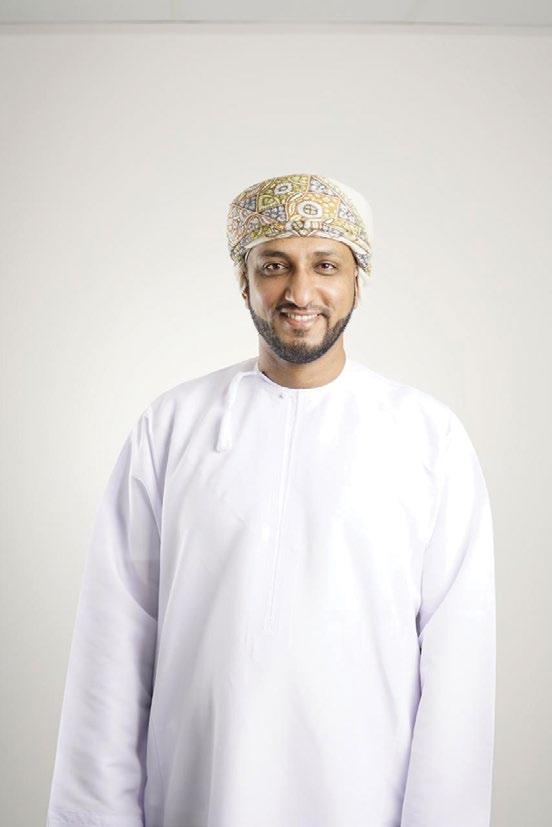

Under his leadership, TAG has expanded its national footprint through a robust network of showrooms, service centers, and spare parts facilities & Leasing —delivering seamless experiences across the automotive value chain. His strategic foresight has seen the company successfully partner with next-generation global brands like Geely and other EV brands that are soon to enter the market. In recognition of his contributions to Oman’s automotive landscape, Kasthurirangan was named “CEO of the Year – Auto” at the CXO Awards 2024.
business activities in the United Arab Emirates, Oman, Qatar, Bahrain, and others. Laurance played a pivotal role in establishing HONOR’s e-commerce presence from the ground up, significantly contributing to the brand’s recognition and growth among overseas consumers. Prior to his tenure at HONOR, Laurance was instrumental in the growth of Huawei’s
Consumer Business Group (CBG) in Latin America. He witnessed and contributed to Huawei’s ascent from an emerging player to a market leader in the region.
CEO, Thawani Technologies
From his early years, Majid Al Amri was inspired by the limitless possibilities offered by computers, innovative software platforms and emerging technologies. Guided by his spirit of innovation, Majid enrolled with Sultan Qaboos University and graduated as a Computer Engineer in 2003. He has since been using technology to augment and improve every facet of his daily life, be it personal or in the workplace. An individual with deep experience gained in roles across numerous sectors, Majid has been involved in the start-up and establishment of few businesses in the past prior to setting up Thawani
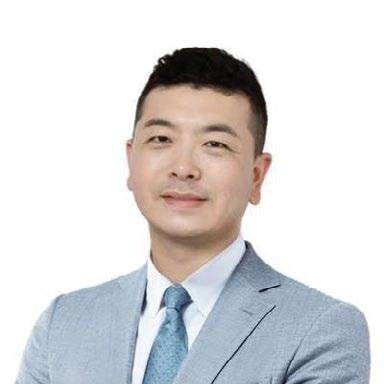
as the first Omani Mobile Payment Platform in Oman and one of the few in the region and taking up his position as Chief Executive Officer at the company.
Finally, after 10 years spent planning, Thawani Technologies LLC was established in March 2016 and app released in March 2018. Since then, it has been successfully providing smart innovative payment solutions through mobile phones and other electronic channels. The system has been tailored to meet local market requirements and comply with local and global regulations and standards such as PCI-DSST for ensuring a secure environment for the system and the work environment.
Mazin al Lamki is the CEO of Energy Development Oman (EDO) – the newly established state-owned energy firm to fund the expansion of the Petroleum Development Oman operated Block 6 concession area and the Sultanate’s energy offerings, including renewables. Lamki, who was serving as the chief operating officer of Mubadala
Petroleum earlier started his tenure as the CEO of EDO in the first quarter of 2022. Lamki has over 22 years of global experience in diverse technical, managerial and operational roles in the oil and gas industry.
He holds a Bachelor’s Degree in Mechanical Engineering from the University of Manchester, Institute of Science and Technology, UK.

Mahmoud El Kordy is the CEO of GBM Oman. El Kordy has over 30 years of experience in the IT industry internationally, and joined GBM from IBM Middle East and Africa where he held several sales and leadership positions across Systems and Big Data & Analytics.
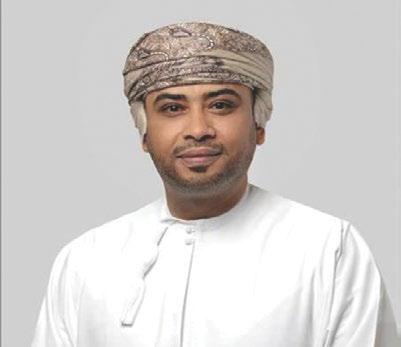
Prior to this appointment, El Kordy was in IBM Europe for several years leading Services Sales. As GBM’s General Manager, he will lead GBM’s Oman operations to drive the company’s strategy aimed at accelerating the Oman digital transformation and aligning with Oman vision 2040. Mahmoud holds a bachelor’s degree in Engineering and a master’s degree from Maastricht School of Management in the Netherlands.
Maqboul Al-Wahaiby is the CEO of Oman Data Park (ODP). He joined ODP as deputy general manager in 2012 and was part of the executive management and founding team of the company. Prior to joining ODP, he worked with the government of Oman for over 20 years on strategic national IT initiatives and projects in the area of information security. Al- Wahaiby holds a Master’s degree in computer software engineering from the University of York. After graduating in 2003, he
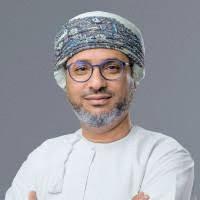
worked in the government sector as a project manager and provided consultancy to organisations in the public sector such as the Information Technology Authority (ITA), Royal Oman Police and Ministry of Justice. In 2004, Al-Wahaiby was promoted as an IT infrastructure section head to manage different pillars, which were software development, IT infrastructure, and information analysis. In 2010, he was appointed as deputy head of department in the government sector where he was responsible for strategic planning, resource management, software development, information technology and so on.
Mansoor Al Abdali has close to 30 years of experience in operations, maintenance, and engineering of oil and gas facilities, with skills in pipeline management. Before joining OQGN in 2009, he spent 15 years at PDO, overseeing the inspection and maintenance
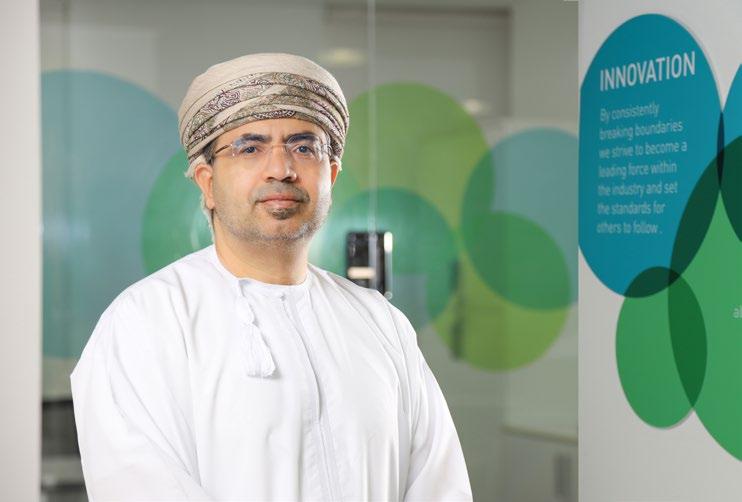
of all PDO assets and operational sites, including oil and gas pipelines and terminal facilities. As its CEO, Al Abdali has led OQGN’s asset acquisitions of PDO and Madayn (PEIE). He has a Bachelor’s degree in Mechanical Engineering from the University of Manchester Institute of Science & Technology, UK.

CEO, Amouage
Marco Parsiegla was appointed as CEO of Amouage in 2019, marking a new chapter in the brand’s acclaimed legacy. With a vision of global expansion, Parsiegla is transforming the business model ensuring that Amouage’s passion for beautiful creations can be experienced around the world. Not too long after his appointment, Marco had to face what has proved to be one of the most challenging times for people and businesses all over the world, COVID-19. Yet under his leadership, Amouage was able to navigate the new normal where many companies faltered, launching several highly
Oman (MDO), where he leads the company’s strategy, operations, and growth to unlock Oman’s mineral wealth. With a focus on sustainable development, Mattar oversees exploration, investment attraction, and the execution of large-scale projects—ensuring value creation for stakeholders and fostering positive community impact. Prior to joining MDO, Mattar spent over 15 years with
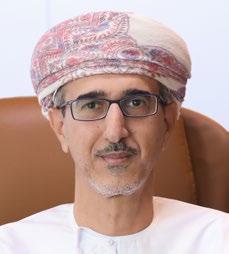
successful products and adapting its services to cater to the ever-increasing demands for online service.
With over two decades of experience in the fragrance and cosmetics industry, Parsiegla has a track record that spans marketing, sales and strategy across the luxury market. Parsiegla holds a Swiss and German nationality and has been living in various countries across Europe, in the Unites States and Australia before relocating to Oman. He holds a Master’s degree in Industrial Engineering and Economics from the Technical University Karlsruhe, Germany, and is a graduate of the Harvard Business School.
Vale, rising through key leadership roles including Chief Operating Officer, Chief Pelletizing Operations, and Chief of Port Operations. Mattar holds an EMBA from HEC Paris and executive certifications from Babson College and the Shingo Institute, with a strong foundation in mechatronics engineering. He is recognized for driving continuous improvement, system design, and cultivating a culture of operational excellence. With a proven track record in both public and private sectors, Mattar Al Badi is dedicated to advancing Oman’s mining industry while prioritising sustainability, innovation, and community development.
CEO, Infoline
Mohamed Hamed Al Maskari is the CEO of Infoline LLC. With over 25 years of senior management experience, Maskari has held various executive positions in his previous roles. His last assignment was as the Director General of Knowledge Oasis Muscat, Oman’s First Technology Park.
Prior to this, he was heading the Information Center, Public Establishment for Industrial Estates (PEIE-
CEO, Automotive, Construction Equipment & Renewable Energy (ACERE) MHD
Mohsin Hani Al Bahrani, is the CEO of Mohsin Haider Darwish LLC’s automotive division, which has been integrated with various other functions and named as ACERE (Automotive, Construction Equipment and Renewable Energy). A business management graduate from Brunel University, London, Mohsin Hani Al Bahrani was the Director of MHD’s Automotive and Commercial Vehicles Division, before being named as the CEO of MHD ACERE. MHD is the sole distributor of brands Jaguar, Land Rover, McLaren, MG Motor, Ashok Leyland, Ford Trucks, CMC, Jetour, Hongqi, Michelin, BF Goodrich, Riken, Terex Finlay, XCMG, Mitsubishi Forklift Trucks, Abus,

Madayn) supervising all the ICT applications and as a software developer in one of the leading IT firms- Oman Information Technology (OITC). He was on the board of Oman Telecommunication Company (2007-2019) and has served as a board director in The Research Council (TRC) from 2005 until 2016. He was also appointed as the regional president of the West Asia and North Africa, WANA in the International Association of Science Park and area of innovation, IASP 2012-2014. He holds Masters in Business Administration from Bedfordshire, UK and Bachelor’s degree in Science from the Sultan Qaboos University.
and Drager in Oman. He completed his Masters of Arts in ‘Middle Eastern Studies’, achieving a distinction, at Kings College London; and has learnt the nuances of the automotive industry, by working with various stakeholders in order to bring synergies for operational efficiencies.
Mohsin is also the founder of MHD Leasing LLC, which targets the tourism sector and AutoExpert, providing a range of car accessories to auto enthusiast in Oman. He has set up 13 new sales facilities in Oman and expanded after-sales from three facilities in 2019 to 11 in 2022, which has led to MG securing the third position in car sales volume in Oman as per MEAC report. He has overseen the newly-formed HospiCare division of MHD ACERE bringing world-class medical instruments. Mohsin is the youngest person to ever chair a Sports club in Oman.


CEO, Shell Oman Marketing Company
Dr Mohammed Mahmood Al Balushi, CEO of Shell Oman Marketing Company SAOG, brings over 32 years of leadership experience across various sectors. He comes with a diverse expertise in corporate banking, equity financing, projects management, social investment, government relations in addition to energy sector. He is also currently serving as a board director in Shell Pakistan Limited, and was serving as an executive board member in Shell Oman Marketing, representing Global Shell Gas BV, as well as several government advisory boards and executive committees. Before becoming CEO, he was Shell Retail Country Manager and Senior Management Team member. Dr. Al Balushi has been pivotal in driving Shell Oman’s growth and innovation in downstream technologies, while upholding the highest standards of HSSE, ethics, compliance, and sustainable ICV practices. He has led the company’s energy transition strategy, focusing on reducing carbon emissions and investing in renewable energy. His leadership aims for a sustainable energy future, balancing economic goals with environmental stewardship. Through the Powering
CEO, Phoenix Power Company
Mohammed Said Al Shuaili serves as the CEO of Phoenix Power Company since April 2022. He has over 15 years of experience in the field of electricity and water production. Mohammed has worked extensively in the
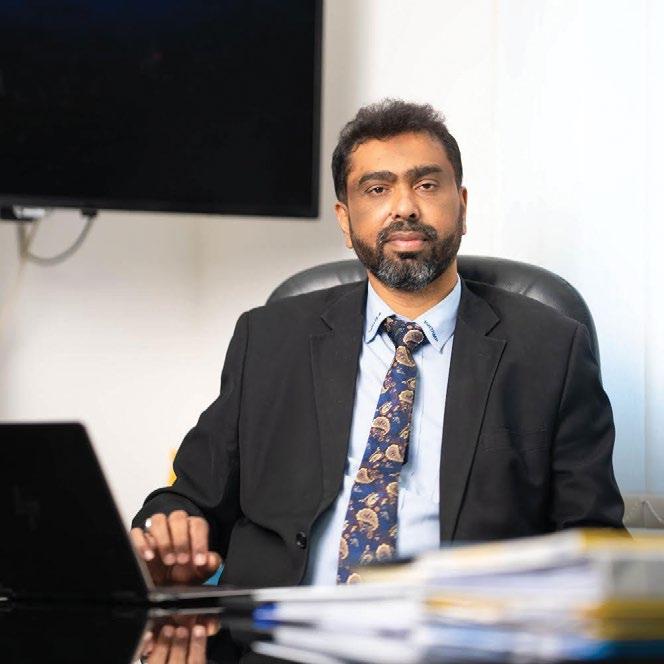
Progress strategy, which is aligned with the country’s net zero emissions goal by 2050, his initiatives include the first solar-powered fuel station, the first EV chargers at service stations, and the introduction of carbon-neutral lubricants. He is spearheading the launch of the first green hydrogen fuel service station in Oman, which will be the first of its kind in the Middle East. His leadership has been key in the profitability of Shell Oman while navigating through different challenges, regulatory changes, internal restructuring and change programmes. Dr. Al Balushi has Doctorate in Business Administration from the UK, where he also received his MBA and a diploma in management. Additionally, he holds degrees in industrial credit and banking and financial studies.
Dr. Mohammed Al Balushi has been honoured with numerous awards, including The Exemplary Leadership Award in Oman Business Excellence Award (2020), Top Middle East CEO Award by INSEAD Business School (2019), the Best Arabian CEO in the sector by Arab Best Awards in 2018, Named among the top 50 CEOs in Oman (2018) and was awarded Shell Retail Global EVP Award in operation Excellence (2009).
Oman electricity generation and water desalination sector, most recently as the PGM of the Ibri I IPP project and Ibri II Solar PV IPP Project. Mohammed holds a Bachelor’s degree from Sultan Qaboos University in Mechanical Engineering and a Master’s degree in Maintenance Management from Caledonian Engineering University.
Ajmal Basha CEO, Voltamp Energy
With over 29 years of experience in various business operations across India and the GCC region, Mohammed has spent more than 16 years working in Saudi Arabia and Oman. He has been associated with reputed multinational companies. His responsibilities ranged from business operations, project management, quality, testing, manufacturing, and customer services, progressing from engineering roles to leadership positions.
Starting his career in the GCC region as a General Manager, Mohammed has established a distribution transformer facility in Saudi Arabia and later advanced

to become the Assistant Vice President leading the transformer and switchgear businesses. Mohammed also served as a director in multiple joint ventures. In 2019, Mohammed joined Voltamp Energy SAOG as General Manager for the Power Transformer Unit in Sohar. He progressively took on roles such as Chief Operating Officer and Acting Chief Executive Officer, eventually becoming CEO on January 1, 2023. In this role, he reports to the board and oversees the entire business operations and profitability of the company as an authorised leader from the management team. Mohammed has a background in founding and developing companies, introducing new technologies, turning around businesses, and engaging in mergers, acquisitions, and the localisation of business entities.

CEO, Oman Housing Bank
Moosa Al Jadidi is the CEO of Oman Housing Bank. Al Jadidi is a seasoned banker with extensive industry knowledge armed with more than two decades of experience in the banking and financial industry across the Sultanate of Oman and the GCC. As an award-winning banker, he is renowned for having expert knowledge of both conventional and Islamic Banking, notably retail banking, corporate credit, wealth management and private banking investments coupled with his focus on continuous improvement and exemplary performance. He is also an expert in digital customer experience and strategic operational management and planning. Prior
CEO, Al Baraka Oilfield Services
Eng. Musallam Al Maashani is a safety-conscious veteran of the oil and gas industry who easily earns the confidence and respect of engineering teams, project crews, drilling contractors, service company representatives, peers, and key decision-makers. Musallam has executive experience in both start-up and growing organisations, with a proven track record of successfully leading project operations from start to finish, both technically and commercially. He possesses extensive knowledge of current economic, social, and regulatory issues in Oman.

Chief Executive-Alternative Energy, OQ
to joining Oman Housing Bank, Moosa Al Jadidi was the Chief Operating Officer of Alizz Islamic Bank.
Al Jadidi has extensive international and regional banking experience as he previously worked for the Royal Bank of Canada, the European Financial Group Bank as Vice President – Global Private Banking, Dubai Bank as Vice President – International Business Development and several local banks such as Bank Muscat and National Bank of Oman (NBO). Al Jadidi has a Master’s degree in Business Administration from the University of Bedfordshire and is a graduate of the Senior Executive Program from London Business School in the UK. He is also an associate of the Canadian Institute of Bankers and a certified private banker.
Eng. Musallam has been the CEO of Al Baraka Oilfield Services, SAOC, Oman since January 2016.
Single-handedly, he has been responsible through his dedication and hard work to have fueled the growth of the company over the last decade from fledgling pipeline maintenance and conventional workover rigs into one of Oman’s most respected oilfield services contractors today running elaborate pipeline/flowline erection, construction, commissioning activities along with EPC projects whilst managing a ten-strong fleet of workover Hoists in the southern oilfields in the PDO concession area.
Chairman and CEO, United Securities
Mustafa Ahmed Salman is the Chairman and CEO of United Securities. He is also the director of Muscat Depository and Securities Registration Co., Oman Chamber of Commerce and Industry and Oman United Insurance Company as well as a committee member of Oman Kuwait Investment Company.
Salman holds an advanced diploma in accounting, and is a holder of the International Capital Markets
Najla is the Alternative Energy CEO. She has more than 23 years of professional experience in various onshore and offshore upstream Oil and Gas operational roles, and managerial consultancy positions at globally recognised companies including Vale, Schlumberger, IHS Energy, Shell and Petroleum Development Oman (PDO). Prior to her current role, Al Jamali was appointed as Acting Executive Managing Director of Takamul

Qualification from the Securities Institute of London. He is also a registered broker with advisory license from MSM. He has close to three decades of experience in finance-related activities, of which nine years have been in government service in positions responsible for financial activities and 20 years in the Omani capital market.
United Securities initiated operations with just four employees in 1994 as a limited liability company, offering local brokerage services. Currently, the company provides a full spectrum of investment services in the local and regional markets.
Investment Company in 2016, and in 2020 she helped set up OQ’s Alternative Energy team where she became responsible for all Green Molecules Ventures.
Najla holds a Bachelor of Science degree with honours in Mathematics with Applied Mathematics/ Mathematical Physics from Imperial College, London, and attained a Master of Science degree in Financial Management from the University of London and participated in Schlumberger’s leadership programme at INSEAD, in France.
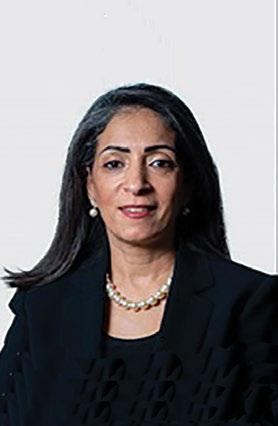
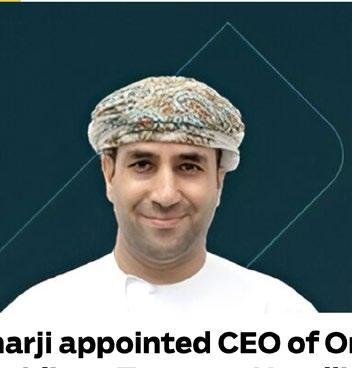
CEO, Transom Handling
Nasser Al Sharji is the CEO of Transom Handling, a subsidiary of Oman Airports. Nasser brings with his over 25 years of distinguished executive leadership, operational excellence, and business transformation experience across key sectors, including aviation, logistics, and government services.
He has held senior leadership positions in prominent
CEO, Al Mouj Muscat
Nasser Al Sheibani is the CEO of Al Mouj Muscat, Oman’s premier waterfront development; a position he held since October 2015. Al Sheibani joined the company in 2007 and served as chief financial officer prior to his appointment as CEO. Al Sheibani takes great pride in delivering results, and throughout his career he has demonstrated a strong commitment to excellence. He was awarded the Chairman’s Award for Excellence during his tenure at Petroleum Development Oman

CEO, Takaful Oman Insurance
organizations such as ASYAD Group, OQ and Nama Water Services, where he successfully spearheaded major national projects and organizational transformations. In addition to his extensive professional experience, Nasser holds an Executive MBA.
He has also served as a Board Member and Chairman of various committees across multiple sectors, further underscoring his strategic acumen and leadership versatility.
company from 2000 to 2007 as a finance professional.
Prior to this, Al Sheibani started his career at National Bank of Oman in the treasury department from 1998 to 2000. Al Sheibani is also a non-executive board member of Oman Investment & Finance Company (a publically listed company) and chairman of its audit committee since September 2014. Al Sheibani holds a Bachelor degree in finance (with honours) from Sultan Qaboos University, and a graduate of Oman’s National CEO Programme delivered by IMD & McKinsey.
CEO, United Finance Company SAOG
Nasser Al Rashdi is the CEO of United Finance Company SAOG and a driving force behind its strategic transformation. With extensive experience in the financial sector and deep expertise in credit, risk management, and corporate strategy, Nasser has led the company into a new era of growth and innovation.
Under his leadership, UFC has embraced a bold, customer-first vision rooted in digital enablement,
Neelmani Bhardwaj is the CEO of Takaful Oman Insurance SAOG. He is a senior general insurance professional with 25 plus years of extensive international experience in the Financial Services industry of which 18 years were with American International Group (AIG) in varied roles and geographies across South Asia, GCC, Africa, Russia and Europe.
Prior to joining Takaful Oman, Neelmani was the Business Executive Officer (Insurance) at Ominvest. Bhardwaj has successful experience at startups, scaling up businesses
operational excellence, and sustainability. Known for his decisive leadership and forward-thinking approach, Nasser has successfully aligned business execution with long-term value creation.
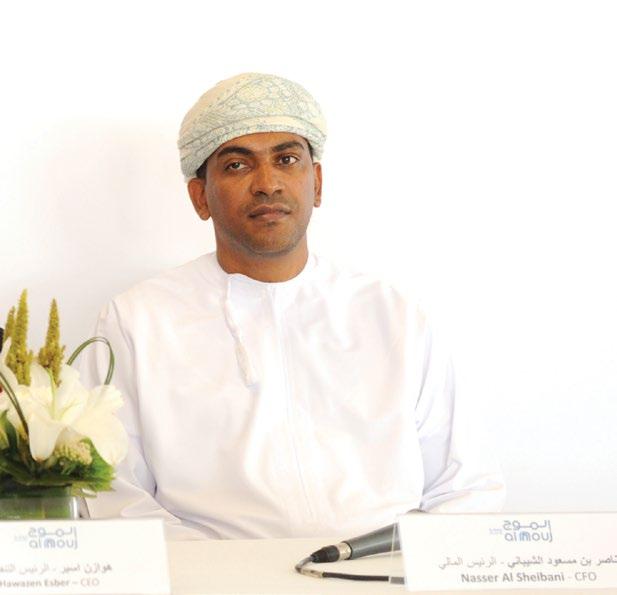
His ability to anticipate market shifts and implement agile strategies has not only strengthened UFC’s market position but also earned him wide respect across the industry. As a dynamic leader with a clear vision, Nasser continues to shape the future of financial services in Oman and beyond.
and is now leading the charge of turnaround of Takaful Oman, He has been highly successful in building a collaborative and effective working environment across culturally diverse teams and geographies. He has been effective in leading teams to high performance amidst a rapidly changing external and internal environment.
He is an MBA Masters in Business Management from Amity Business School, India. Bhardwaj has served on various boards including Director of National Life and General Insurance Company SAOG and a Member of the Overseas Security Advisory Council, Oman and has also served on the Development committee as Oman American Business Council.
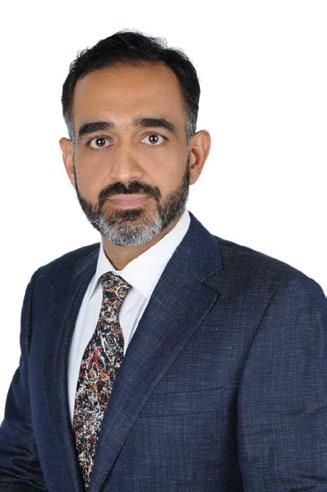

Group CEO, The Zubair Corporation
Niels Bormans is the Group CEO of The Zubair Corporation. Niels had earlier served as Deputy Group CEO at Ghobash Group and CEO of Aban Investment. Bormans, originally from the Netherlands had been working in the region for the past five and a half years. Bormans is responsible for each of
the Corporation’s subsidiaries and has been tasked with future proofing the business in its entirety.
The Zubair Corporation is one of the leading business groups in the Sultanate. Grown from the humblest of beginnings, with a small office run by Mohammad Al Zubair in Muttrah Souq, the corporation today is one of Oman’s foremost family enterprises.
Change Management, Performance Management, Organizational Development and more, he leads the company in a new chapter of growth and prosperity, building upon the success of ASYAD Ports’ operational efficiency and supply chain optimisation.

CEO, Techno Plastic Industry
Eng. Omar Ahmed Salim Qatan, is a well-known name in the business sector. A skilled Omani business leader who works with a clear vision and values. He had the honour of receiving the prestigious “Dahabeeyah” Gold medal and certificate signed by His Late Majesty Sultan Qaboos on the National Day Celebration in 1985. Eng.Omar Qatan has 20 years of Board experience. Currently he is the CEO of Techno Plastic Industry and the Chairman of Muscat

Gases Company SAOG. Omar Ahmed Salim Qatan holds MSC (Eng.) Tropical Public Health, University of Leeds, BSC in Civil Engineering, University of California – Davis, and an International Board Director from INSEAD, France. Engineer Omar Qatan has 32 years of working experience, as he worked as CEO of Oman Oil Marketing Co. SAOG, GM of Gulf Stone SAOG, GM of Dhofar Vegetable SAOG, Senior Manager of Projects Galfar Engineering, and Senior Manager with Royal Oman Police for 11 years. Through his journey of success as the former CEO of Oman Oil Marketing Co., he was awarded ‘CEO of the Year’ in 2014.
Qais is the CEO of Nama Water services. With more than

project since 2016 as a member of the water and wastewater restructuring steering committee. He started his career as an Economist at the Telecommunications Regulatory Authority before joining the Authority for Electricity Regulation as a Regulatory Advisor in the Office of the Executive Director in 2007. He graduated from the University of Oxford’s Said Business School with a Master’s in major programme management and holds a second Master’s degree in utility regulation from the London School of Economics.
CEO, Dhofar International Development & Investment Holding Company (DIDIC)
Ramez El Amoudi is the CEO of Dhofar International Development & Investment Holding Company, DIDIC, one of the largest investment holding companies in the Sultanate. Since its establishment in 1987, DIDIC has played a prominent role in sponsoring the establishment of some of the most prominent financial services
companies in the country, including BankDhofar and Dhofar Insurance, where it remains the largest shareholder.

Ramez is a commerce graduate from Canada and holds a number of professional certifications such as CFA, CAIA and PRM and has occupied the role of CEO at DIDIC since February 2020. Before joining DIDIC, Ramez had spent 16 years in the GCC where he oversaw investments across the region in industries such as real estate, tourism and hospitality, and financial services.
CEO, Port of Duqm
Reggy Vermeulen is the CEO of the Port of Duqm. He joined the port in 2012 and served as the commercial director for three years before being appointed as the CEO.
Prior to coming to Oman, he was the CEO of the Port and Industrial Zone of Haiphong in Vietnam. The Port and Industrial Zone of Haiphong attracted over $1.5bn of investment on his watch and was elected among the
top five companies in Vietnam. Vermeulen was also positioned in Nigeria for launching the port and industrial zone of “OK Free trade zone” next to Lagos. Vermeulen started his career as a consultant at Deloitte Consulting with a specialization in supply chain optimisation and companies restructuring. Situated on the southeastern seaboard of the Sultanate of Oman, overlooking the Arabian Sea and the Indian Ocean beyond, Port of Duqm is fast becoming an important reality of the Middle East region’s rapidly transforming maritime landscape.

Assuming the role of CEO in June 2018, Said Abdullah Al Hatmi has taken leaps and overcome hurdles on his path to attain ahlibank unprecedented success. His legacy and forward-thinking vision underscore his talent as an exceptional leader whose unwavering commitment is showcased in his illustrious career as a driving force in the Sultanate of Oman’s banking sector. Al Hatmi ascended multiple senior management positions, gaining expertise in corporate banking, risk management, finance, and banking operations, equipping him with a stout foundation that steered ahlibank towards several remarkable achievements. Al Hatmi won the ‘CEO of the Year’ at the Banking and Finance Awards 2023; one of
Said Ahmed Safrar is the CEO of Oman Investment and Finance Company (OIFC) since 2014. He was a member of the OIFC board prior to his appointment as CEO. He is a professional with more than 20 years’ experience in the banking and telecom sectors. His previous job was as chief customer experience officer with Ooredoo. Safrar serves on the boards of various companies in both the private and public sectors. He holds an MBA from the University of Hull, Yorkshire, UK. Established in 1979,


the many substantial accolades he has received over the years as the harbinger of a new age at the helm of ahlibank. Al Hatmi embodies a leadership style that encourages collective decision-making, fostering a critical thinking team and empowering individuals to shape the bank’s future. His approach ushered a collaborative, inclusive, and transparent work environment, developing the skills of ahlibank’s team members and nurturing future leaders capable of driving holistic change.
At the core, Said Abdullah Al Hatmi plays an instrumental role that exemplifies his prowess as a true leader. Under his guidance, ahlibank adapted to market shifts and set industry standards, thus embodying the values of forward-thinking leadership, customer-centricity, and technological innovation.
OIFC is one of the leading investment and services companies, specialising in billing, collection and debt factoring for electricity, water and telecom services in the Sultanate over the last three decades. OIFC is the single largest private sector listed company dedicated to this line of business in the Sultanate. OIFC factors bills and debts for the Public Authority of Electricity and Water, Oman Telecommunications Co (Omantel), Oman Wastewater Services Company (Haya) and provides meter reading, billing and collection services for Muscat Electricity Distribution Co, Muscat Municipality and Omani Qatari Telecommunication Company (Ooredoo).
CEO,
Said Mohammed Al Masoudi is the CEO of Sohar Aluminium Company since February 2011. Prior to joining Sohar Aluminium, he was the head of business development at Oman Oil Company (OOC) and led three key investment sectors namely infrastructure, power and shipping as part of OOC’s growth strategy.
Al Masoudi has also held the post of director of resources and energy sectors development at the
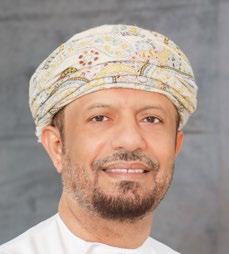
Ministry of National Economy and was responsible for oil, natural gas and minerals development planning.
Al Masoudi graduated in 1991 from the Sultan Qaboos University, Oman, with BSc in Petroleum and Minerals Engineering. In 2001, he completed his MSc in Energy Studies from the University of Dundee, Scotland, UK. His strengths lie in his business acumen marked by the significant results attained by the business under his leadership. Sohar Aluminium is a 380,000 tonnes per annum aluminium smelter situated in Sohar, the industrial hub of the Sultanate.
Acting CEO, Ooredoo Oman
Saoud Al Riyami is the Acting CEO of Ooredoo Oman. Al Riyami, had served as Ooredoo Oman’s Chief Business and Wholesale Officer, prior to assuming the role of Acting CEO. He has over 18 years of industry experience and has been an integral part of Ooredoo Oman since 2009. Over the years, he has held key leadership positions, including
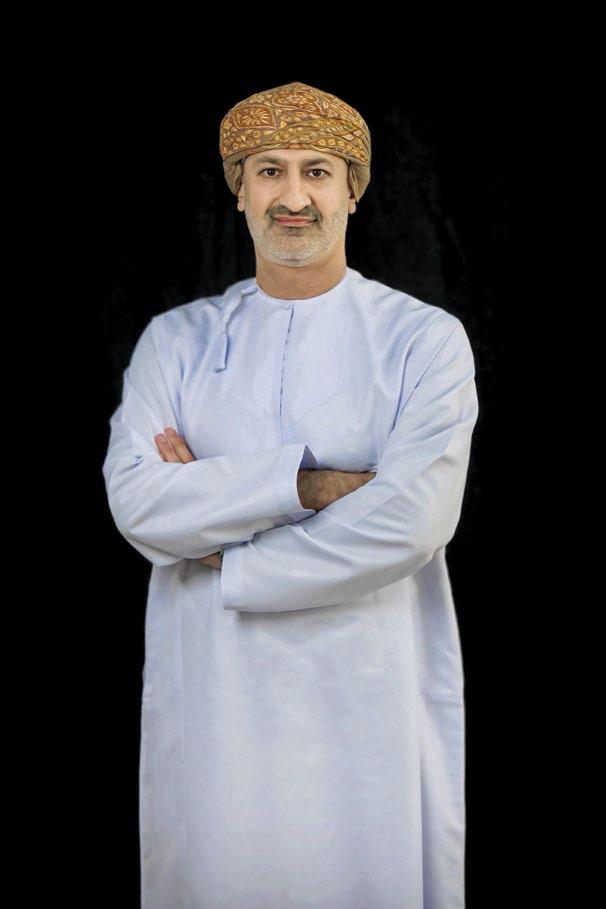
Head of Business Sales and Director of Business Sales and ICT Solutions, before being appointed to his current role. A seasoned professional in the telecommunications sector, he has a strong background in business strategies, sales planning, and wholesale operations. His expertise spans direct and indirect sales channels, account management, and market data analysis. He also holds a Bachelor’s degree in Education from Sultan Qaboos University and an ILM Diploma in Leadership.
Said Nasser Al Rashdi is the founder and CEO of Bima, Oman’s pioneering online insurance platform. With a Master’s degree in Information Engineering and E-Business Technology from the UK, he has led Bima since 2019, transforming the insurance industry through digital innovation. Said is also the Chairman
CEO, Oman Convention & Exhibition Centre
Eng. Said Al Shanfari is the CEO of Oman Convention and Exhibition Centre, the Sultanate premier events venue. An expert in the business event industry, Al Shanfari also represents the wider region as Chairman of the Global Association of the Exhibition Industry (UFI) for the Middle East and Africa chapter. This regional perspective along with his achievements at the OCEC led him to be recognised by Forbes Middle East as one of the Top 100 Travel and Tourism Leaders in 2024.
With over ten years in senior management roles, Al Shanfari started his career in the telecommunication sector, managing large marketing projects for Omantel and Oreedoo. In 2017, Al Shanfari completed Oman’s
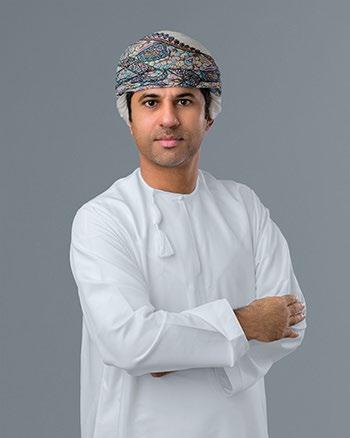
of the Board at VentureOne and Al Nasr Investment and Development Company, Deputy Chairman at Infoline LLC, and a member of the Digital Economy Committee at the Oman Chamber of Commerce and Industry.
His previous roles include CEO of Sandan Development and the Omani Industrialists Association, showcasing his leadership across various sectors.
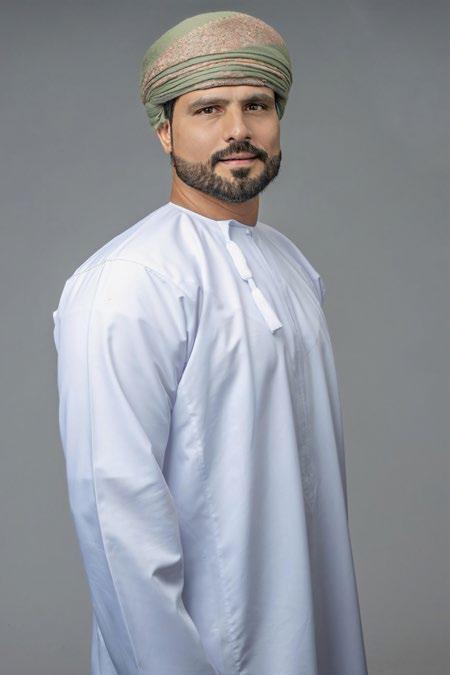
National CEO Programme which prepared Oman’s brightest talent to compete in the global marketplace with an aim to build the next generation of Omani leaders . A leading voice in Oman, Al Shanfari was selected as one of the Top 100 Most Influential CEOs in Oman & OER Innovative CEO of the year in 2023.
Al Shanfari holds a Master of Business Administration from the University of Hull and a double Bachelor’s from Southern Illinois University Edwardsville, in Computer Management and Information Systems, as well as Business Administration and International Business. He has completed additional leadership and management courses from the London Business School and the IMD Business School and is a qualified Associate Certified Coach with the International Coaching Federation.
CEO, Abraj
Saif Said Al Hamhami is the CEO of Abraj Energy Services, where he is responsible for implementing the company’s robust growth strategy and reinforcing its position as a leading oilfield and gas services provider. Al Hamhami is a well-rounded leader with more than two decades of experience in the energy sector, covering end-to-end processes in production, drilling, contracts, procurement,

technology, and innovation. Prior to joining Abraj, Al Hamhami held senior positions in Petroleum Development Oman (PDO), where he played an instrumental role in the development and implementation of the company’s strategic projects. Throughout his distinguished career, Al Hamhami has led several business development mandates, with particular focus on bottom-line cost optimization and complex organizational efficiency.
CEO, Khazaen Economic City
Eng Salim Al Thuhli is the CEO of Khazaen Economic City. He has 25 years of experience working in diverse institutions. Prior to joining OIC Group in 2018, he worked with a number of reputed institutions including the Ministry of Regional Municipalities and Water

Resources, Petroleum Development Oman (PDO) and Oman Tourism Development Company (Omran).
He is a graduate of the Oman’s National CEO Program. Eng. Salim holds training certificates in leadership from the London Business School, the Japanese Haida Center and Singapore’s Youyoing University.

CEO, Areej Vegetable Oils and Derivatives
Salem Nasser Al-Bortmany joined Areej Vegetable Oils and Derivatives SAOG (AVOD) in 1996, as an Executive Engineer, where he worked closely along with International Consultant Firm, USA to implement business rationalisation programme, process optimisation and overall lean management. He became Business Development Manager in 2000 and was handling international and export markets, product development, overall business development and monitoring overall competitiveness. Additional responsibilities were given to him thereafter, to develop sustainability, business growth, supply chain and logistics when he became an Executive
Appointed as Chief Executive Officer of Mercedes-Benz Oman in early 2020, Shaun Michael has taken on the mammoth task of guiding the company’s next phase of strategic direction, building upon the long-established partnership between ZTC and Daimler whilst fulfilling the customer satisfaction objectives across the sales, service and parts operations. An experienced executive with over 28 years premium brand automotive retail experience in Mercedes-Benz, and other luxury automotive brands such as BMW and Audi, Shaun has held a variety of roles throughout the industry, from entry-level to the
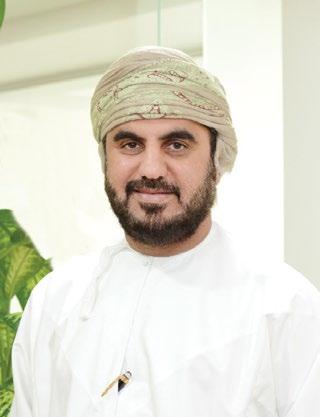
Director. As a CEO, Salem aims to identify, develop and implement AVOD’s Corporate Strategy with major function in implementing the best business practices in order to achieve AVOD’s vision and objectives of utilising capacity, profitable growth and overall business sustainability. He has contributed immensely to the manufacturing sector in Oman for the past 20 years. He was a Chairman of Export Development Working Group of Ithraa and contributed to promote Oman products outside Oman through Oman Product Exhibition (OPEX).
Salem Nasser Al-Bortmany graduated from the United Kingdom with BEng in Chemical Engineering and obtained his MBA from UK. He further attended the Senior Executive Programme at HBS, USA.
highest levels of senior management. Prior to joining Mercedes-Benz Oman, he was Chief Operating Officer at Sandown Motors Mercedes-Benz in South Africa. During his career, he has been credited with a number of professional awards and has been recognised for his ability to rise to new challenges and the everchanging trends of demanding market conditions.
His diverse experience and track record have earned him, among many others, the Mercedes-Benz SA Dealer of the Year Chairman’s Award and the Mercedes-Benz SA Best Performing Sales Large Volume, both in 2019. He holds a Business Management Diploma (MAP) from WITS Business School, University of Witwatersrand.
CEO, SME Development Fund (Inma)
Sheikh Salah Bin Hilal Al Maawali is the CEO of SME Development Fund (Inma). He has more than two decades of work experience in the government and private sectors. He has served as the Director General for the Development of SMEs (DGSME), at the Ministry of Commerce & Industry (MOCI). He was also the Advisor for the Board

of Public Authority of SME Development (RIYADA). The SME Development Fund (Inma) has been established with the objective of developing entrepreneurship and financing small and medium enterprises in the Sultanate. Inma provides various kinds of financial facilities to the SME customers across the Sultanate.
Al Maawali received his master’s in international business and management from Sheffield Hallam University (UK) and his bachelor’s in business administration from Arkansas State University (US).
CEO, Port of Salalah
Steven Yoogalingam is the CEO of Port of Salalah Services. Steven comes from the position of Managing Director of the Suez Canal Container Terminal (SCCT), Port Said, Egypt. Prior to his appointment with SCCT, Steven worked with APM Terminals in
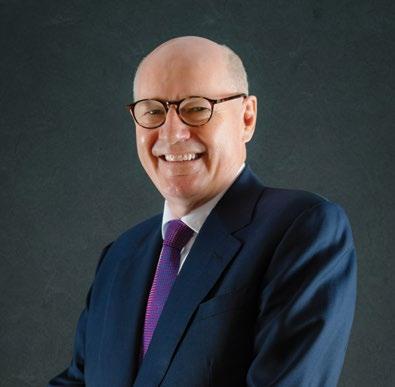
CEO, Oman Arab Bank
Aqaba Container Terminal, Jordan and Port of Tanjung Pelepas, Malaysia. He also has previous international experience working with ports in Jebel Ali, Dubai and Busan, South Korea. Steven is a Malaysian National and graduated with a bachelor’s degree in law from King’s College London. He has completed several executive management programs with APM Terminals.

CEO, Renaissance Services
Stephen R Thomas is the CEO of Renaissance Services since 1998. Thomas who joined the company in 1988 has a wealth of international experience, originally working with Grand Metropolitan Group.
He has also served as chairman of the Oman Society for Petroleum Services (OPAL). In 2010, he was appointed OBE for services to business abroad and services to the community in Oman.
Sulaiman Hamed Al Harthi is the CEO of Oman Arab Bank. He has over 35 years of banking experience with board level expertise and a proven track record to develop robust and sustainable business models, creating an
environment where creativity is unleashed, talent is nurtured and energy of the workforce is harnessed. Sulaiman has occupied several leadership roles at major local banks. He has demonstrated exceptional capabilities and has been a key contributor to the various organizations he has served. Sulaiman has an MBA in Finance from University of Leicester.
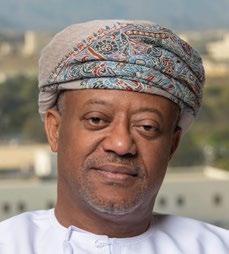
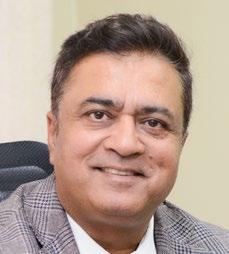
CEO, Dhofar Insurance
Sunil Kohli is the CEO of Dhofar Insurance since April 2019. With experience of more than 29 years, Sunil has in-depth knowledge of global insurance and reinsurance industry.
At Dhofar Insurance, he is spearheading the transformation initiative to digitise processes, customer centricity, optimising resources and creating value for all stakeholders. Under his leadership, Dhofar Insurance has been awarded the following
awards- “Most Innovative Insurer in Oman,” “Most Trusted Brand,” and “Excellence in Insurance.”
Prior to joining Dhofar Insurance, Sunil was Head of Reinsurance and Liability underwriting at Reliance General Insurance from 2015 to 2018 and was instrumental in developing large risk portfolio to pitch fork Reliance as a leader in Commercial lines insurance in India. Sunil Kohli holds a Master of Business Administration in Finance from the University Business School, Punjab University, Chandigarh, Bachelor of Engineering (Electronics and Communication) from National Institute of Technology, Durgapur and a Fellow of Insurance Institute of India.
Talal Said Al Mamari is the CEO of Omantel since June 2014. He has 22 years of experience in telecom sector working for Omantel. Prior to his appointment as CEO, he held several leadership positions including his last stint as chief financial officer of Omantel.

Tariq Mohammed Al Junaidi is the CEO of Oman Oil Marketing Company (OOMCO). He brings 22 years of progressive experience in different fields. His earlier stints include Deputy CEO of Oman Shipping Company and subsequently CEO. Prior to joining OSC, he worked for HSBC and before that at Global Enterprise looking

Al Mamari played instrumental role in different initiatives and projects carried out by the company including its IPO in 2005, the restructuring of Omantel by bringing the mobile and fixed operations together and later the full legal merger of Oman Mobile with Omantel. He sits on the boards of several companies and investment funds. Al Mamari holds a degree in Business Administration from Duquesne University, Pittsburgh – Pennsylvania.
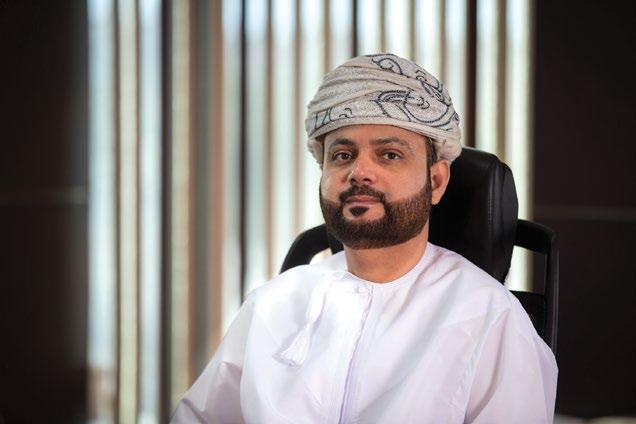
Furthermore, he has been instrumental in the establishment of Islamic banks such as Noor Bank in Dubai, Al Hilal Bank in Abu Dhabi, and Bank Nizwa in Oman. Al Farsi holds leadership qualifications from Harvard University, INSEAD, and the Sheikh Mohammed bin Rashid Center for Leadership Development. He earned his Bachelor’s degree in Business Administration and Hotel Studies from The Arab Academy for Science, Technology & Maritime Transport and is a certified Chartered Financial Analyst. As an award-winning business luminary, Al Farsi has made a significant impact on the country’s business landscape, continuing to propel National Finance to new heights and inspiring future leaders.
after sales and marketing. In 2013, he completed an Executive MBA in shipping, finance, and offshore from BI Management School in Norway and Nanyang Technological University in Singapore. In 2004, he completed an MBA from The University of Western Australia. He also holds a BSc. in international business and marketing from Florida Atlantic University, US.

Venkat is an engineering graduate in Metallurgy from IIT- Roorkee, India, with additional management and financial qualification from Xavier School of Management (XLRI), Jamshedpur, India. Venkat has more than 30 years of experience in the international steel industry at various management levels across the globe, with a special focus on GCC, the Middle East, and India. In his previous engagement, he worked as Vice President –Sales at Emirates Steel Company, Abu Dhabi, the UAE. As a part of the Emirates Steel executive management committee, he was instrumental in overseeing the company’s growth into a 3.5 million tonnes completely
unique blend of product & market knowledge. Al Jazeera Steel Products Company is an Oman-based manufacturer of steel products. The company located close to Sohar Port, operates through two business divisions namely tube mill and merchant bar mill. They manufacture and markets various types of steel products, including black pipes, galvanised pipes, hollow sections, merchant bar mill products and rebars. Its new merchant bar mill has a production capacity of 300,000 metric tonnes per annum. Apart from Oman, the company’s key markets include the UAE, Saudi Arabia, and other export markets.

CEO, Muriya Tourism Development
CEO, Bank Muscat
Sheikh Waleed K. Al Hashar is the CEO of Bank Muscat. He is a member of the Board of Directors of the Oman Center for Governance and Sustainability, and the College of Banking and Financial Studies. His experience over the past 28 years spans in Banking as well as the Oil and Gas sectors. Before joining Bank Muscat, he held senior positions in a number of leading corporates including Petroleum Development Oman and HSBC
Wael Al Lawati is the CEO of Muriya Tourism Development, including the award-winning destinations, Jebel Sifah and Hawana Salalah. In support of Orascom Development’s ambition to be a pre-eminent, multinational developer, Al Lawati is responsible for setting the business agenda for the Group’s Oman destinations, including leading the overall strategy in alignment with Orascom Development’s strategy, facilitating delivery against the annual business plans and instilling best practices throughout these destinations. He has held
Bank Middle East. Sheikh Waleed K. Al Hashar joined Bank Muscat in 2004 and has since held various senior positions including Group General Manager –Corporate Services and Deputy Chief Executive Officer. He assumed the role of Chief Executive Officer of the bank in January 2019. He holds a postgraduate diploma in General Management from Harvard Business School as well as a BSc and Masters in Business Administration from California State University in Sacramento, USA.
several other leadership positions including CEO of Oman Tourism Development Company (OMRAN) and founder of The Wave Muscat (AlMouj). He also served as Chief Operating Officer for a real estate advisory and spearheaded international growth at DAMAC Properties. Additionally, Al Lawati was a board member of Muriya between 2008 and 2015.
Al Lawati was selected as a member of the Young Arab Leaders, a group of the top 500 Arab leaders, and was a board member of the Middle East Leadership Academy (MELA). He previously served on the boards of the Oman Society of Engineers and the Oman Society of Contractors.

Youssef Ezzikhe is the CEO of Oman Refreshment Company. A dynamic and an entrepreneurial executive with 20 plus years of service, Ezzikhe has demonstrated success, driving multimillion-dollar sales growth while providing award-winning leadership in highly competitive markets. Ranked 270 of the listed companies in the 2014 Mena Forbes 500, and with annual revenue of $170mn, ORC is among the top 20 private companies in Oman. The company is listed in the Muscat Stock Exchange.
President, BP Oman
Yousuf Al Ojaili is the President of BP Oman. Al Ojaili graduated with a mechanical engineering degree from the University of Tulsa (US) and also obtained his MSc in industrial engineering from Sultan Qaboos University.
He remains active in academia serving on Sultan Qaboos University’s industrial advisory boards in
Currently having two business categories (beverages and snacks) representing 1000 employees, ORC markets leading brands such as Pepsi, mountain Dew, 7up, Lays, Doritos. ORC’s vision is to be the leading player in the four categories where it operates (CSD, Water, Juice and Snacks). Over the past few years, ORC has been growing steadily on all fronts, revenues, volumes and shares.
The company is dominating a record high market share of over 90 per cent in the carbonated soft drink segment, thanks to the trust of consumers and customers in the products quality and image.
the College f Engineering, as well as the mechanical and industrial engineering departments.
Prior to joining BP Oman, Ojaili was the CEO of Oman Gas Company from 2005 to 2015. He also had a long stint with Petroleum Development Oman (PDO) where he worked from 1987 to 1996 and as head of gas concept engineering from 2000 to 2005. In between, he served as senior project engineer with Shell at Brunei Darussalam.

The UMS editorial board selected 100 most influential CEOs in Oman based on the following criteria:

Influence: The influence that a person wields within his company and the business community at large.
Size: The turnover of a company or the number of people employed by it has been taken as a measure of influence of the person at the helm.
Finances: The financial performance of the company over the years.
Leadership: The stature of a person based on his contribution to the development of his industry or the overall economy.
Larger good: The mentorship and encouragement provided by a person to a large workforce including young Omanis.
Vision: The vision and foresight exhibited by a leader.
Entrepreneurship: An ability to lead and grow a business conglomerate.
Honorary role: Honorary positions held by a person in government, public sector or other organisations based on his statesmanship abilities.
Years in business and expansion abilities: The number of years spent by a person in business and his ability to take the organisation beyond Oman.
As the first in Oman to start online trading and introduce digital client onboarding, how does United Securities ensure that its technology remains secure and user friendly for clients?
This is part of our proud legacy. United Securities was the first company in

term investors to manage their portfolios efficiently. We were also the first to implement digital client onboarding in Oman which has now become a standard industry practice. What used to take days to complete now takes less than thirty minutes, with full regulatory compliance. But even as we expand our digital footprint, we are deeply mindful of the risks. Security remains a top priority. Our technology infrastructure is among the most advanced in the market. We have built it with multiple layers of protection including robust firewalls, encrypted environments, real time threat monitoring, and regular independent audits. We always aim to balance sophistication with simplicity. Our clients do not see the complexity behind the scenes, and that is by design. They experience a clean, fast, and reliable platform. That is the standard we set and continue to maintain.
How does United Securities plan to navigate potential economic volatility, and what proactive measures are in place to mitigate risks?
Risk management is central to our operations. At United Securities, it is not an annual exercise but a daily discipline. We operate in a dynamic market environment and managing volatility is part of our culture. We are fully regulated by the FSA and MSX, and ensure strict compliance with all regulations. Internally, we have built several layers of oversight. Our internal audit function reports directly to the board of directors providing full independence and transparency in monitoring risk exposures and internal controls. Alongside this, we have a highly skilled compliance team that oversees every step of the client lifecycle from onboarding to trade execution and settlement. Beyond internal governance, we actively monitor macroeconomic indicators and sector specific trends locally and internationally. This allows us to identify risks early whether they relate to interest rate changes, geopolitical developments, or sector headwinds. We also conduct regular stress testing on client portfolios and trading systems to ensure resilience under different scenarios. Clients trust us not just for execution but because
we manage risk systematically. This consistent and proactive approach gives us and our clients confidence even during periods of uncertainty.
How do you balance innovation in your services with compliance to regulations?
At United Securities, innovation and compliance are complementary. We do not see them as conflicting priorities. We have a strong track record of being first movers. We were the first to launch online trading in Oman, the first to introduce digital onboarding, and among the earliest licensed market makers in the country. Today, a large portion of foreign institutional trades on the MSX are routed through United Securities. We also provide direct market access to regional and international clients and were early adopters of the Tabadul platform which facilitates seamless cross border trading within the GCC markets. All of these innovations have been developed in close partnership with regulators. We engage in ongoing twoway dialogue to ensure our solutions are fully compliant and support the long-term growth of Oman’s capital markets. Our commitment goes beyond business interests. As a market leader, we consider ourselves partners in advancing Oman Vision 2040. Whether it is through financial inclusion, digital transformation, or regional integration, our innovations align with the country’s broader economic goals. We do not simply build features; we build trust and integrity.
What specific sectors do you see as most promising for diversification, and how do you assess potential risks associated with these sectors?
Oman Vision 2040 sets a clear direction to diversify the economy away from hydrocarbons and develop sectors such as logistics, tourism, manufacturing, renewables, and technology enabled services. Our investment strategy closely follows this vision. We see strong potential in the services sector, financials, and power generation. These areas are supported by growing demand, regulatory backing, and long-term growth prospects. Our recent launch of the United US Market Mutual Fund received overwhelming
support, reflecting increasing investor appetite for geographic and sector diversification and confidence in our asset management capabilities. Diversification does not eliminate risk but helps manage it. Each sector carries specific challenges. Manufacturing is vulnerable to fluctuations in input costs and global demand cycles. Tourism can be impacted by geopolitical tensions and seasonal variations. Power generation, especially renewables, while promising, face risks related to financing, regulation, and adoption timelines. Our investment approach is data driven. We combine macroeconomic analysis with detailed sector research and risk adjusted portfolio construction. We focus on fundamental value and longterm sustainability rather than short term trends.
What is the company’s investment strategy for the remainder of the year?
We remain optimistic about the opportunities in the MSX. Oman’s equity market offers attractive valuations, strong earnings momentum in select sectors, and one of the highest dividend yields in the region. Our strategy is to focus on companies aligned with Oman’s economic growth drivers. We are particularly positive about the banking and financial services sectors, which are supported by robust balance sheets, steady credit growth, and improving profitability. The power generation sector also presents opportunities, especially companies with long term power purchase agreements and stable cash flows. The services sector is recovering gradually as the economy normalizes after the pandemic and government reforms take effect. Recent successful IPOs have added depth to the market and broadened sector representation. This development improves access to key parts of the economy. Looking forward, we expect the MSX to benefit from a potential upgrade to emerging market status as early as 2027. This would likely attract foreign institutional investment and support a market re-rating. Our investment approach will remain disciplined, research focused, and geared towards sectors with attractive valuations and growth prospects.
Dhofar Insurance Company increased its workforce by adding over 10 per cent young Omani professionals in 2024. The company is committed to job creation and comprehensive training, ensuring these new hires thrive and contribute to success, says CEO, Sunil Kohli in an interview with Oommen John
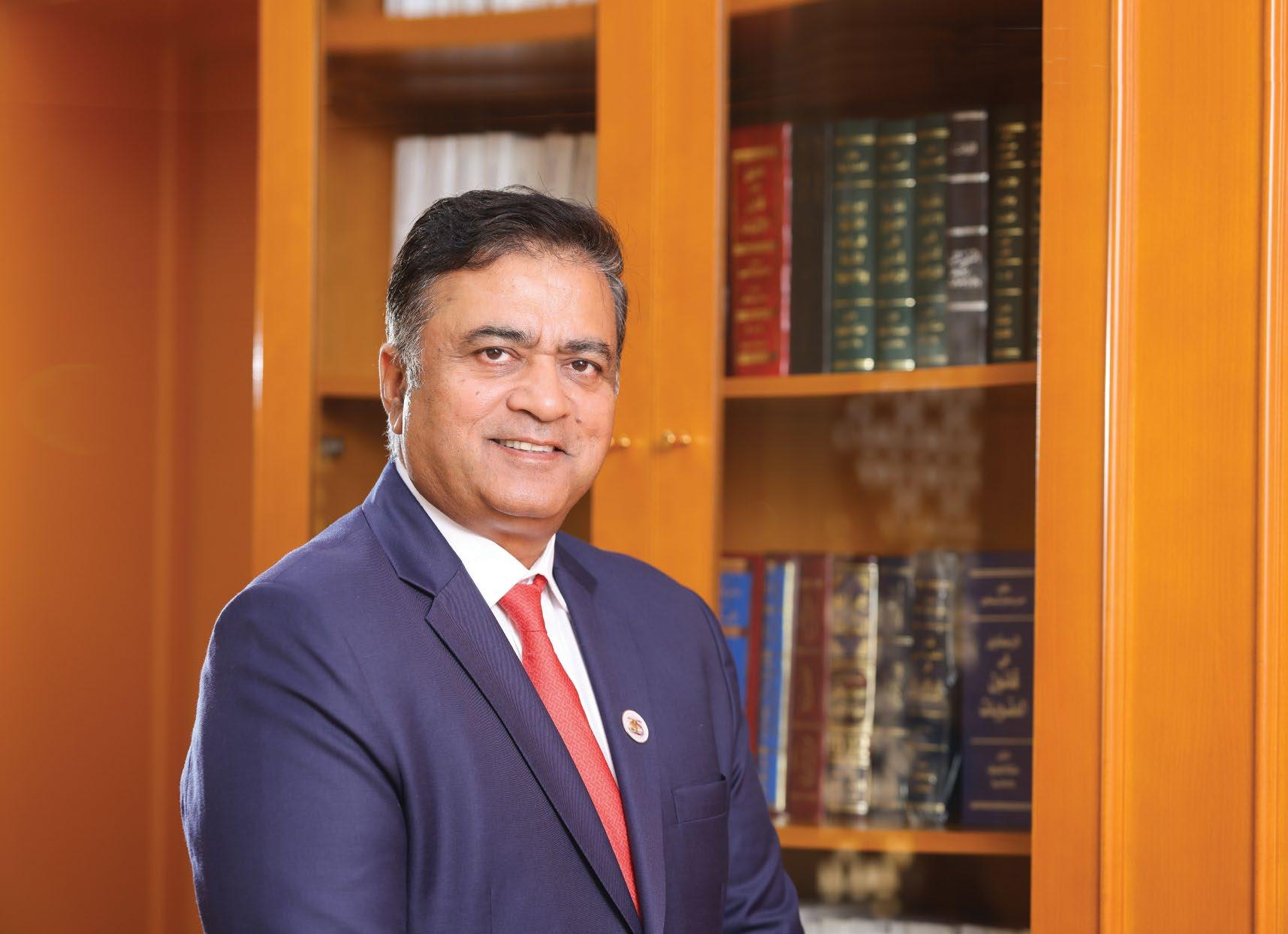
understand customer needs and provide a seamless service experience. A smooth purchasing process not only satisfies initial expectations but also sets the tone for the entire relationship. Once customers are onboarded, the efficiency and user-friendliness of the claims process play a crucial role in building trust and fostering positive relationships. When customers experience straightforward and timely claims settlements, it encourages them to renew their policies, reinforcing their loyalty to our brand. Further, providing hassle-free service for policy changes is equally essential, as it demonstrates our commitment to customer convenience and satisfaction. By excelling in these areas, we aim to significantly enhance our customer retention ratio.
Dhofar Insurance achieved an impressive 23 per cent growth, which is much higher than the average insurance industry growth. This remarkable figure clearly indicates that we are successful in bringing new customers, as our growth is not solely reliant on policy renewals. Our strong reputation for service quality, efficient claims processing, and user-friendly digital channels are key factors that contribute to our ability to attract new clients.
How do you plan to leverage technology and innovation to enhance customer experience and operational efficiency in the coming years?
Three years ago, we embarked on an ambitious digital transformation journey aimed at revolutionising the way our customers interact with us. This initiative has empowered customers to purchase motor policies through various convenient channels, including online platforms, WhatsApp, and a dedicated mobile app. By offering these options, we have significantly simplified the purchasing process, allowing customers to engage with our services in a manner that best suits their preferences. In addition to enhancing the purchasing experience for our customers, we have developed digital portals. These portals facilitate easier access to our products, ensuring that our offerings are readily
available to a wider audience. This digital approach not only elevates the overall customer experience but also streamlines our operations. By reducing the need for manual intervention in various processes, we have improved operational efficiency, allowing our team to focus more on delivering exceptional service to our clients. As we evolve and adapt to the changing landscape of the insurance industry, we also prioritise the importance of nurturing new talent. At Dhofar Insurance, we have successfully added at least 10 per cent new young Omani professionals to our workforce in 2024. We recognise the value of creating job opportunities and are committed to providing comprehensive training programmes to equip these new hires with the skills they need to thrive in the industry. Our focus on developing young professionals reflects our dedication to fostering a robust and capable workforce that can contribute to our continued success.
How can young professionals effectively differentiate themselves in a saturated job market within the insurance sector?
Young professionals entering the insurance sector are encouraged to invest their time and effort in obtaining globally recognised insurance certifications. These certifications play a crucial role in not only enhancing their competencies in their current roles but also significantly boosting their career progression opportunities. By acquiring these credentials, individuals can demonstrate their expertise and commitment to the industry, making them more attractive candidates for advanced positions and specialised roles.
We understand the importance of professional development and actively support our employees in their pursuit of these certifications. Dhofar Insurance also partners with reputable training centres that offer comprehensive programs tailored to the insurance industry. To further facilitate this process, we cover the fees associated with these training courses, thereby removing financial barriers that might hinder our employees from advancing their qualifications. This commitment
to professional development not only enriches our workforce but also fosters a culture of continuous learning and growth within our organisation. By empowering our young professionals to enhance their skills, we contribute to their personal and professional success while simultaneously strengthening our company’s capabilities in an increasingly competitive market.
What are the company’s projections for growth in 2025, and how do you intend to achieve them given the competitive landscape?
While I am unable to provide specific projections for the future, I can confidently state that we anticipate growth for Dhofar Insurance. Our strategic focus will continue in key areas that are vital for our success in an evolving marketplace. Primarily, we are committed to enhancing our service delivery, ensuring that every interaction our customers have with us is not only satisfactory but also memorable. By prioritising exceptional customer service, we aim to build lasting relationships that foster loyalty and trust.
In addition to our emphasis on service, product innovation remains at the forefront of our strategy. We recognise that the insurance landscape is continuously changing, and to stay relevant, we must adapt and introduce new products that meet the evolving needs of our customers. This commitment to innovation allows us to differentiate ourselves from competitors and cater to diverse market segments effectively.
Further, our dedication to technology adoption is crucial in maintaining our competitive edge. By leveraging advanced technologies, we streamline operations and enhance customer interactions, making it easier for clients to access our services. Embracing digital solutions not only improves efficiency but also positions us to respond swiftly to market demands and customer expectations. Together, these focus areas will enable us to navigate the challenges of the market, ensuring that we remain a strong and competitive player in the insurance industry.
United Finance Company’s CEO,
Nasser Al Rashdi, shares insights into the company’s forward-looking strategy focused on leveraging AI-driven customer engagement tools and enhancing its digital capabilities
Can you highlight the key achievements of United Finance Company (UFC) in Q1 2025?
UFC achieved a successful oversubscription of its corporate bond by 70.5 per cent, reflecting strong investor confidence in our transformation journey and future outlook. A major milestone was the opening of our new branch in Maabeelah—strategically positioned within Oman’s leading car and SME trade hub—to enhance customer proximity and operational efficiency.
Our digital transformation initiatives have led to greater adoption of self-service kiosks and internal process automation, significantly reducing turnaround times and errors. These enhancements have delivered measurable improvements in operational efficiency and customer satisfaction, aligned with our transformation pillars: People, Process, and Customer Focus. We recorded a net profit growth of 16.2 per cent in Q1 2025, with total assets increasing by 10 per cent.
The Non-Performing Loan (NPL) ratio improved to 15.14 per cent from 17 per cent at the end of Q1 2024. Notably, we were awarded Best Auto Finance Company Oman 2025 by Global Banking and Finance Awards.
What key strategies will UFC adopt to differentiate itself in the regional financial services sector?
We are focused on enhancing customer experience by simplifying and streamlining access to financing. Our strategy is built on transformational leadership, with clear Objectives and Key Results (OKRs) deployed across the organization to foster alignment, accountability, and agility. Our relationship-based branch network is strategically located to serve key markets, particularly the automotive and SME sectors. We also leverage advanced data analytics and sophisticated risk scoring models to refine our underwriting and credit assessments, empowering better decision-making and service delivery.
How is UFC addressing the risks tied to SME lending, especially in the automotive sector?
We have implemented a robust credit underwriting model featuring enhanced credit checks and multi-layer verifications to manage key risk factors. This includes deeper insights into PDC (post-dated cheque) dependencies and responses to regulatory changes. Our strategy also includes regular stress testing, close collaboration between risk and compliance teams, and adaptive mitigation approaches tailored to fluctuating market conditions.
What technologies or innovations are being adopted to enhance customer service?
We prioritise technology-led convenience through self-service kiosks, digital loan origination, and post-sale service digitisation. We are also streamlining and automating key workflows, such as loan booking, disbursement, and collections, to enhance turnaround times and SLA adherence.
Looking ahead, we are exploring AIpowered customer engagement tools and expanding the capabilities of our digital platforms to deliver a more seamless customer journey.
You recently launched the Maabeelah branch. Are there more expansion plans, and how is UFC ensuring sustainability in this growth?
Yes, UFC is actively identifying new growth corridors based on customer demand and commercial viability. Expansion is supported by operational digitisation and data-driven decisionmaking to ensure sustainability.
Our strategy includes reducing paper usage and shifting to digital processes, integrating transformation goals such as paperless operations and workflow automation into all new branches.
UFC is prioritising technology-led convenience through self-service kiosks, digital loan origination, and post-sale service digitisation. We are also streamlining and automating key workflows, such as loan booking, disbursement, and collections, to enhance turnaround times and SLA adherence

Oman Vision 2040 provides the national framework guiding all our strategic decisions, says Ali Abdul Rasool Ahmed Al Buali, CEO, Mazoon Dairy. An OER interview
“I believe in results-driven leadership, grounded in integrity, professionalism, and robust governance. I am committed to aligning institutional performance with strategic objectives by instilling a culture of responsibility and excellence, and by enhancing team effectiveness across all levels.”
Ali Abdul Rasool Ahmed Al Buali, brings over 19 years of executive experience in business leadership and development across the investment, energy, and food sectors. Since September 2022, he has served as Chief Executive Officer of Mazoon Dairy, leading the company’s institutional transformation and sustainable growth with a sharp focus on enhancing national food security. Prior to joining Mazoon, Al Buali held senior leadership positions in sovereign entities and international corporations, including the Oman Investment Authority, Fisheries Development Oman, and Shell. He holds a bachelor’s degree in accounting and an master’s in business administration from Sultan Qaboos University. He has also completed Certified Public Accountant (CPA) examinations, which is accredited by the American Institute of Certified Public Accountants. He is known for his results-oriented leadership approach, strong emphasis on governance and integrity, and ability to drive institutional performance in line with strategic goals. Excerpts from an interview:
What are Mazoon’s key growth plans for the next three to five years, and how do you plan to achieve them?
At Mazoon, our priority is to strengthen our position as a national and regional leader in the food security sector. We’ve developed ambitious growth plans that focus on both horizontal and vertical expansion. These include the development of new production lines, scaling up our distribution networks, and enhancing our export capabilities into selected regional markets. Simultaneously, we are investing in operational efficiency through technology and digital transformation
while improving the consumer experience and expanding our product portfolio to match evolving consumption trends.
How is Mazoon addressing market volatility and rising operational costs in light of regional economic conditions?
We have adopted an agile and datadriven approach that enables us to make informed, timely decisions. This includes
restructuring certain cost components, optimising inventory and supply chain management, and reducing waste. We have also renegotiated terms with our strategic partners to ensure long-term, sustainable agreements. Our objective is to strike a balance between cost control and maintaining the high quality of products that our consumers expect.
How aligned is your strategy with
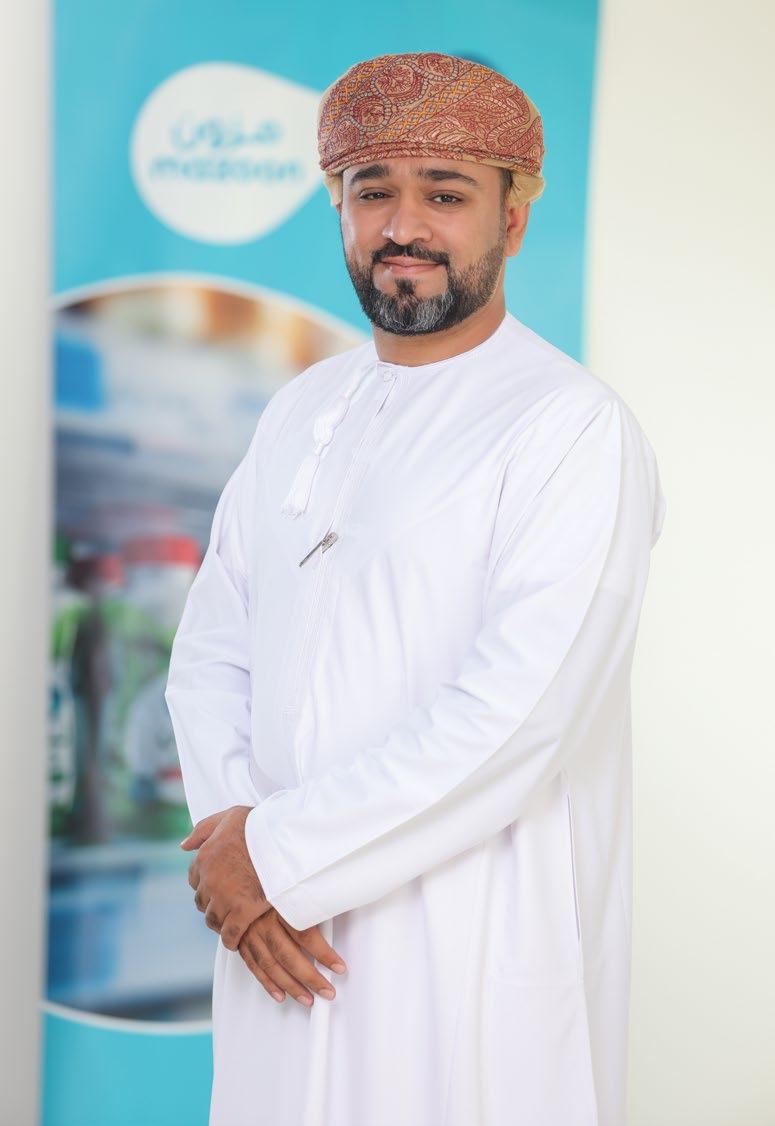
Oman Vision 2040, and how do you contribute specifically to achieving self-sufficiency in the food sector?
Oman Vision 2040 provides the national framework guiding all our strategic decisions. We aim to contribute meaningfully through three key pillars: employment, industrial localisation, and sustainability. In terms of food self-sufficiency, our strategy focuses on increasing the production capacity of core products such as fresh milk, dairy derivatives, and juices, while strengthening national value chains and reducing dependency on imports. We are also committed to supporting local producers and fostering longterm partnerships with them to secure production inputs and materials supply. Additionally, we invest in advanced agricultural and food production technologies to ensure a stable and resilient local food supply.
We firmly believe that food security is not solely achieved through production, but also through cross-sectoral integration and rapid responsiveness to demand principles Mazoon applies consistently and responsibly.
What message would you like to send to shareholders following this phase of transformation and restructuring?
I extend my sincere appreciation to our shareholders for their unwavering support during this critical transition. Their trust has been a cornerstone of the successful implementation of our transformation programme, which is now bearing fruit. We reaffirm our commitment to transparency, financial sustainability, and operational excellence, and we pledge to continue driving value and long-term stability for the business.
How does Mazoon balance production expansion with environmental sustainability, given water scarcity and climate challenges in the region?
We are fully aware of our environmental responsibilities, which is why sustainability principles are embedded across all our operations. We utilise advanced water management and recycling systems and continuously work to reduce our carbon footprint and optimise energy consumption in our facilities. This balance between growth
and environmental stewardship is a foundational element of our long-term strategy.
What are the key local content initiatives that you prioritise?
Local content is a strategic priority for us. In 2024, we exceeded 42% in local procurement, but our efforts go further. We support local suppliers through long-term partnerships and provide continuous training and development opportunities.
How do you assess the effectiveness of corporate governance at Mazoon, and which performance indicators do you personally monitor?
We operate within a robust corporate governance framework that emphasises transparency, accountability, and evidence-based decision-making. Personally, I closely track financial performance, productivity levels, customer satisfaction, supply chain efficiency, and Omanisation rates. Additionally, I review internal audit and risk reports regularly to ensure swift response to any deviations.
What are the top institutional risks you are prioritising, and how are you preparing for them?
Key risks include fluctuations in raw material prices, climate-related challenges, and shifts in consumer behaviour and innovation dynamics. Our mitigation strategy focuses on diversifying supply sources, adopting resilient risk management systems, and investing in product innovation. We are also enhancing our predictive analytics capabilities to remain proactive and ready for potential disruptions.
If you could highlight one achievement you are most proud of during your leadership at Mazoon, what would it be?
I take great pride in the successful execution of our institutional transformation programme. This transformation went beyond financial restructuring to include organisational culture, operational efficiency, and rebuilding stakeholder trust. It marks a pivotal turning point in our journey towards sustainable growth and resilience.
How do you evaluate Mazoon’s adoption of advanced technologies such as AI and IoT, and what are your aspirations in this area?
We view technology as a strategic enabler, not a supplementary tool. We have already started implementing AI for demand forecasting and IoT solutions for real-time monitoring of production lines. Our vision is to fully digitise our supply chain and customer service operations, thereby enhancing efficiency and creating a strong competitive edge in the market.
What is your strategy for responding to consumer shifts toward plantbased and healthier product alternatives? Are there any plans to launch new products in this space?
At Mazoon Dairy, we firmly believe that dairy is already a wholesome, naturally nutritious choice. Our products are crafted to meet the highest standards of health, safety, and quality; rich in essential nutrients like calcium, protein, and vitamins that are fundamental to a balanced diet. As consumer preferences evolve, we welcome the conversation around health and wellness, because that’s the space we already operate in. Our commitment remains focused on providing nutrient-dense foods that support the wellbeing of families across Oman and the region. Nonetheless, we are closely monitoring consumer trends, particularly in the area. Our R&D team is actively working with partners to ensure that we bring innovative, high-demand products to market.
How would you assess the regulatory environment in terms of protecting the competitiveness of local products, and what role does Mazoon play as a national leader in this sector?
Oman’s regulatory environment has seen positive developments in supporting local products through well-structured protection policies and initiatives that empower the private sector. At Mazoon, we are fully compliant with all regulatory requirements and actively engage in national dialogue to support the advancement of the food manufacturing sector. As a national leader, we see it as our duty to advocate for and reinforce the competitiveness of the local industry both domestically and regionally.
Business Gateways International (BGI)’s long-term objective is to become a global provider of nationwide strategic services in areas such as local content (ICV), B2B, FDI facilitation, says Director and CEO, Hemant Murkoth
In a rapidly evolving tech landscape, how does Business Gateways International LLC (BGI) ensure that its platforms remain relevant and responsive to changing market demands?
The global technology landscape is experiencing various disruptions, which are also evident in Oman. The emergence of advanced technologies and rapid development models is altering market dynamics at unprecedented speeds. Business models are incorporating and utilising technologies more extensively than before. With each new platform designed and implemented by BGI, we invest heavily in studying, analysing, and adapting technologies that best fit these platforms since each has distinct objectives, stakeholders, and operational requirements. Once implemented, we focus equally on the sustainable lifecycle continuity of these platforms over time, to ensure they remain relevant and can adapt to changing market needs and user demands. This is achieved through a model of ‘Innovation Driven Enhancement Cycles.’ These enhancement cycles involve compulsory reviews of the platforms over specified periods to evaluate their strategic and operational alignments with user expectations, business dynamics, and technology trends. Such effective methodologies have played an essential role in the success stories of platforms managed by BGI over long periods of time while maintaining critical value to its stakeholders.
What challenges do you face in scaling your solutions to meet the diverse needs of various stakeholders, and how do you plan to overcome them?
Every platform developed and managed by BGI is guided by specific short-term and long-term objectives. BGI oversees these platforms through sophisticated
business processes, continuously aligning with stakeholder needs while prioritising the user base of each platform. We acknowledge that each platform can have multiple stakeholders with active requirements that must adapt to evolving government policies, address priorities, and ensure that end-result objectives are measurably achieved. BGI employs a multi-layered governance model that includes key stakeholders in the decision-making process throughout the entire lifecycle of the platforms. Our platform governance structure is meticulously designed, consisting of a strategic top-tier that supports stakeholders in identifying and approving policy-driven needs, a mid-tier monitoring body that ensures alignment with diverse stakeholder requirements, and an operational end-tier team that engages deeply with performance metrics. BGI’s role within this organised governance model is to ensure operational excellence through consistent dialogue, collaboration, reviews, and reporting systems amongst all stakeholders to maintain smooth operation of these complex platforms. This requires extensive monitoring and coordination, demanding round-theclock engagement.
What are the company’s longterm goals in terms of technology innovation and community impact?
BGI’s existence over the past 15 years is based on a foundation of sustainability, recognised through the success of several complex platforms built in Oman. We acknowledge that our platforms need to be made future-proof without significantly revamping fundamental technology structures in both development and hosting environments. Therefore, we continuously review new technologies disrupting businesses worldwide and selectively integrate some based on their

to optimize performance and value.
Riding on its current success in Oman, BGI’s long-term objective is to become a global provider of nationwide strategic services in areas such as Local Content (ICV), B2B, FDI Facilitation, and Procurement models. As platform enablers, BGI aims to assist worldwide governments in digitising these critical functions by building and operating large digital ecosystems. Additionally, BGI has plans to enhance global sustainability by developing and launching a comprehensive Net Zero Platform, aimed at helping countries meet their NDC targets through an extensive framework. Team BGI, which is committed to global ambitions, is enthusiastic about expanding its operational reach in the coming years. Our primary focus remains on delivering core value to our stakeholders.
HE Vladimir Putin, President of Russia took part in the plenary session of the 28th St Petersburg International Economic Forum. This year’s theme is ‘Shared Values: The Foundations of Growth in a Multipolar World.’
HE Putin was joined by a host of dignitaries on the dias for a discussion. These included HE Prabowo Subianto, President of the Republic of Indonesia; HH Nasser bin Hamad Al Khalifa, Representative of His Majesty the King for Humanitarian Work and Youth Affairs; HE Ding Xuexiang, Vice Premier of the State Council of the People’s Republic of China, and HE Paul Mashatile, Deputy President of the Republic of South Africa. The discussion was moderated by Nadim Koteich, General Manager and presenter at Sky News Arabia. In his opening speech HE Putin said, "This year, among the important topics – referred to by our colleagues as key discussion tracks – is the quality of growth in the context of a multipolar world and major global challenges. These include profound shifts in the global economy and demographics, such as the planet’s population dynamics, as well as social, public, and geopolitical tensions that manifest through crises and rapidly escalating regional conflicts, unfortunately visible today in the Middle East.”
“Finally, these include climate change and urgent environmental issues that demand our attention and response. And, of course, the transition to a new technological era driven by digital platforms, artificial intelligence, and autonomous systems capable of making decisions independently of human input is also a central focus," he added.
HE Subianto reiterated Indonesia’s stance of being a non-aligned nation and shared the gains made by the country in food production – an important step towards food self-sufficiency and a
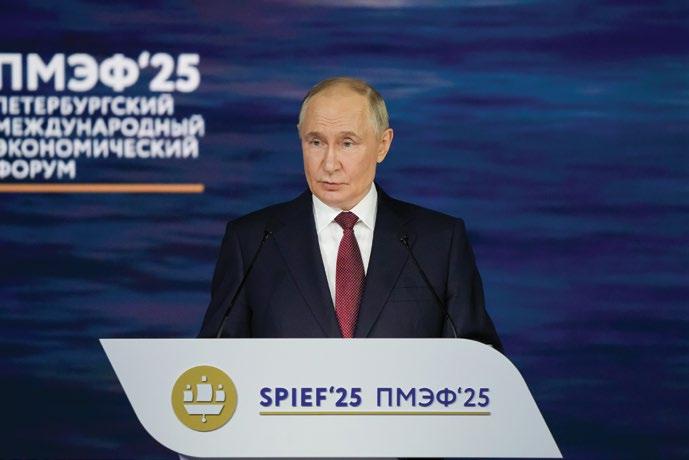
major step towards becoming a net food exporter in future.
In his address, HH Shaikh Al Khalifa, highlighted Bahrain’s approach to economic development as a model shaped by long term national planning, strong leadership, and international cooperation. His Highness stated that Bahrain’s current economic performance is the result of a comprehensive development process guided by the strategic vision of His Majesty King Hamad bin Isa Al Khalifa and supported by the government led by His Royal Highness Prince Salman bin Hamad Al Khalifa, the Crown Prince and Prime Minister. This framework has enabled the Kingdom to maintain steady economic growth, implement structural reforms, and increase its competitiveness in regional and global markets.
HE Xuexiang called for championing humanity's common values and promoting an equal and orderly multipolar world, as well as universally beneficial and inclusive economic globalisation. He highlighted that China is willing to work with Russia to elevate the China-Russia relationship to greater heights, broaden its dimensions, strengthen its resilience, and expand high-quality, mutually beneficial
cooperation to better benefit the two peoples, said Ding. HE Xuexiang also urged the two countries to strengthen coordination and collaboration on multilateral platforms such as the United Nations and to make greater contributions to building a more just, equitable and prosperous multipolar world.
HE Paul Mashatile highlighted energy, critical minerals, agriculture, and digital technologies. He emphasised that these areas are vital for South Africa’s development and align closely with the priorities of the BRICS agenda.
The speeches were followed by a panel discussion in which the dignitaries shared their thoughts on a range of political, economic and geostrategic issues. The St Petersburg International Economic Forum (SPIEF) has been held annually since 1997, and since 2006, has taken place under the patronage and with the participation of the President of Russia. Organised by the Roscongress Foundation, this year’s Forum brought together over 24,000 guests from 144 countries from June 18–21, 2025.
Ilham Al Hamaid, General Manager, Corporate Banking, Bank Muscat shares how the bank has been a pioneer in offering state-of-the-art and innovative

What were the key drivers behind Bank Muscat’s focus on corporate banking innovation?
As the leading financial services provider in the Sultanate of Oman, Bank Muscat has had a successful track record of achievements and successes in corporate banking throughout its journey spanning over 42 years. The Bank’s focus on corporate banking innovation is fundamentally driven by its strategic vision to remain at the forefront of financial services in a rapidly evolving economic landscape. As the Sultanate of Oman continues to diversify its economy under Vision 2040, the Bank has identified innovation as a critical enabler to support the country’s corporate sector in navigating new opportunities and challenges.
One of the primary drivers has been the changing needs of corporate customers, who are increasingly seeking faster, more efficient, and digitally integrated financial solutions. Whether it’s real-time transaction capabilities, streamlined trade finance, or tailored cash management services, the Bank recognises that innovation is essential to meet the expectations of today’s dynamic business environment. In response, Bank Muscat has invested significantly in technology platforms and digital transformation to deliver intelligent, scalable, and client-centric solutions.
Another key factor is the competitive regional banking landscape, where innovation is no longer optional but a necessity for differentiation. Bank Muscat has embraced this reality by fostering a culture of continuous improvement and collaboration, working closely with customers, fintech partners, and regulatory bodies to co-create solutions that deliver tangible value. This approach not only strengthens customer relationships but also reinforces the Bank’s reputation as a trusted advisor and innovator.
The Bank has expanded its network of corporate branches currently standing at five modern and spacious branches across the Sultanate. These branches are equipped with latest technologies and supported by a highly qualified team of relationship managers who offer
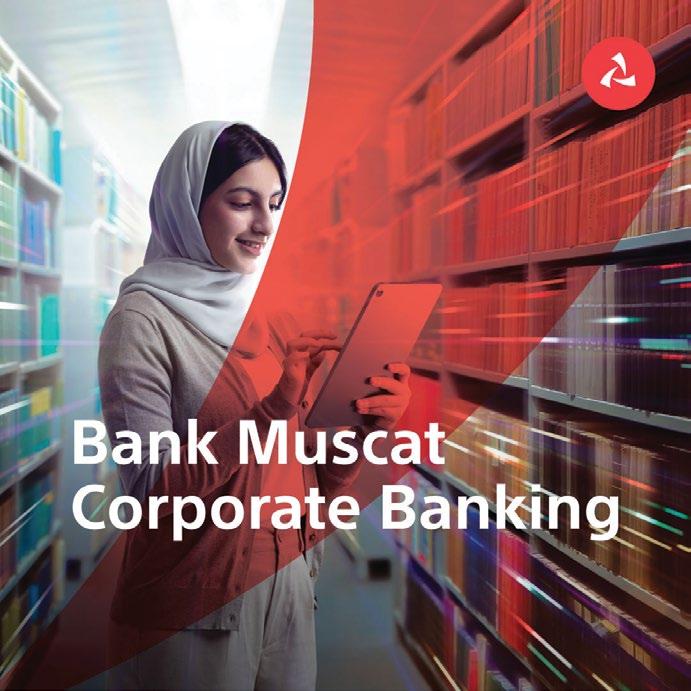
advisory services and assist customers with transactions like account opening, insurance products, remote check deposits, and direct debit services. The Bank also places special attention on SMEs, recognising their significant role in the country’s economic growth.
Recently, Bank Muscat launched its Corporate Banking new campaign, “Ambition Delivered”, which underscores the Bank’s role as a trusted enabler of progress for its corporate customers. It signifies the Bank’s unwavering commitment to understanding the unique aspirations of its customers and transforming them into tangible achievements.
Can you provide specific examples of innovative products or services that Bank Muscat has introduced for its corporate customers?
We, at Bank Muscat, believe that our excellence lies on us serving the needs of our valued customers. Throughout its journey of progress, the Bank has been committed to providing a diverse range of Banking facilities and services that cater to the needs of corporates. The
help our large corporate customers with their complex banking needs; facilitating services that include corporate loans, cards, digital solutions and global trade. At the Bank, we view ourselves as partners in the success and progress of these institutions.
The Bank is one of the first in the region to adopt strategic digital transformation initiatives, which have redefined operational efficiency of customers. By integrating the latest technologies into Bank Muscat’s offerings, the Bank ensures that corporate customers can seamlessly manage their businesses, allowing them to focus on growth and expansion. Bank Muscat remains committed to innovation, ensuring this commitment empowers the Bank’s customers to navigate the evolving landscape confidently.
In this regard, the Bank launched a digital portal for trade services (DigiTrade) for corporate and institutional customers. The platform contributes to facilitating trade transactions and showcasing the Bank’s commitment to implementing the

corporates and SMEs. It provides a wide range of online capabilities, including payments, a consolidated dashboard of bank accounts across all banks, direct debit solutions, liquidity solutions, and trade services. Further to that, the Bank has also introduced an online corporate banking platform and a Business-toBusiness (B2B) payment system to facilitate secure employee payroll.
We also offer a comprehensive suite of both conventional and Islamic trade finance products and services, tailored to meet the diverse needs of our customers. Our focus on innovation ensures that businesses have access to digital platforms, allowing seamless initiation of transaction requests online. This convenience empowers businesses to manage their trade transactions with ease and efficiency, ensuring that they stay ahead in a competitive market.
Bank Muscat has also been pioneering in Project & Structured Finance and its roles in this field resulted from implementing deep sectoral expertise, innovative structuring solutions and sound due diligence techniques. We aim to cater to
Manufacturing, Telecom Real Estate, Aviation and Power and Water.
What is Bank Muscat’s long-term vision for corporate banking in Oman? What future innovations are you exploring?
Bank Muscat envisions a future where corporate banking serves as a powerful enabler of sustainable economic growth, digital transformation, and financial inclusion in Oman. As the country accelerates its progress under Vision 2040, the Bank is committed to playing a catalytic role in empowering businesses, both large enterprises and emerging firms, to thrive in a competitive, technology-driven global economy. The vision is centered on building strong, long-term partnerships with corporate clients, providing them with agile financial solutions that support innovation, resilience, and value creation.
Looking ahead, Bank Muscat is exploring a wide range of future-focused innovations. These include the adoption of artificial intelligence and machine learning to enhance risk assessment
opportunities in sustainability-linked finance, helping corporate clients transition to greener operations by offering customised products tied to ESG performance indicators.
Moreover, Bank Muscat remains committed to fostering innovation through collaboration. By engaging with fintech startups, industry partners, and regulatory bodies, the bank is building an ecosystem that encourages co-creation of new services tailored to Oman’s evolving business environment. This proactive, forward-looking approach ensures that Bank Muscat remains not only a leader in corporate banking but also a trusted partner in driving national development.
Bank Muscat’s leadership in corporate banking has been recognised with several prestigious awards, including the Infosys Finacle Innovation Award for Innovation in Corporate Banking, the Best Corporate Bank Award from Oman Economic Review, and the Best Digital Bank for Corporates in Oman from Global Finance. The Bank has also been listed amongst Forbes Middle East’s Most Valuable Banks.

Under the wise leadership of His Majesty Sultan Haitham bin Tarik, the Sultanate of Oman has been giving exceptional attention to the cultural and sports sectors, believing in their vital role in shaping the Omani individual, empowering youth, and preparing them for leadership. This vision was reflected in the appointment of His Highness Sayyid Theyazin bin Haitham Al Said as Minister of Culture, Sports, and Youth, marking a new phase of ambitious institutional work in these sectors and launching a renewed vision aligned with Oman Vision 2040.
Driven by his strong belief in the capabilities of Omani youth and his aspiration to build a new generation of boxers capable of achieving global success and raising Oman’s name high, international coach Ali Kerdi launched the “Fitbox Fighting Championship” the platform to organise boxing events and develop this vital sport in Oman. This ambitious sports initiative is carried out in full cooperation and coordination with the Omani Committee for Martial Arts and Self-Defence, as part of national efforts to enhance the Sultanate’s presence on the regional and international sports scene.
As modern sports have evolved beyond physical competition into platforms for development, positive impact, and capacity building, His Highness has ensured support for all kinds of sports, especially combat and self-defence sports, due to their symbolism of discipline, commitment, courage, and professionalism. Within this context, the Omani Committee for Mixed Martial Arts and Self-Defence, chaired by Dr. Adel bin Said Al Shanfari, was established as a national institution dedicated to developing these sports in the Sultanate.
Since its inception, the committee has been working to structure and organise combat and self-defence sports professionally. It held two coordination meetings with specialised sports clubs and centres, followed by the launch of a series of national events and participation in regional championships outside the Sultanate. These efforts helped raise public awareness, encouraged youth engagement in these sports, and led to the discovery of promising national talents.
To strengthen its international presence—and leveraging the international connections of Ali Kerdi —the committee reached out to global sports organisations to explore participation in external events, while also working to host regional and international championships in Oman. One of the most notable upcoming events is a major national boxing event planned in coordination with the respected Ministry. The committee has also placed special emphasis on developing human capital—players, coaches, and referees— by organising specialised workshops and training programs, paving the way to building a professional sports system aligned with international standards. From a governance and organisational standpoint, the committee has developed criteria and conditions for organising sports events under its supervision. It has also finalised its internal regulations, which will be submitted to the Ministry for final review and approval. In this spirit, and in alignment with Oman Vision 2040, a national boxing event will be held under the name “Fitbox Fighting Championship,” on June 27, 2025, at Sheraton Hotel – Muscat, organised and overseen by FITBOX Club in collaboration with the Omani Committee for Martial Arts and Self-Defence, led by

Ali Kerdi —who initiated this movement to create a major leap forward in boxing, establish a strong national base, and enable Omani youth to reach the international stage.
The goals of this event are: To promote athletic and cultural exchange through the participation of boxers from GCC, Arab, and friendly countries; To develop the skills of Omani youth and showcase their talents on international platforms; To stimulate community engagement by encouraging private sector support and strong partnerships; To pave the way for hosting future major championships that position Oman as a regional sports hub.
This event represents a practical step within Oman Vision 2040’s strategic direction to position the Sultanate as a prime destination for major sporting events, a magnet for talent and expertise, and a platform where athletic creativity aligns with national development goals. Accordingly, the committee has adopted the official slogan for combat and selfdefence sports events in the Sultanate: “On the land of Oman sports meet creativity, and opportunities are created for the champions of tomorrow.”

OERLive DX 2025, Oman’s premier digital technology conference, was successfully hosted on 25 June 2025 in Muscat, marking its fifth edition as a pivotal platform for advancing the nation’s digital transformation journey
The event brought together a diverse gathering of government leaders, industry experts, and technology pioneers united by a shared vision to accelerate Oman’s progress towards the ambitious goals of Vision 2040 through intelligent technologies. The key theme of the event was: “Transforming Oman Through Intelligent Technologies.” The conference commenced with a welcome address by Atulya Sharma, CEO of United Media Services, the event’s main organiser and media partner. This was followed by a series of insightful keynote speeches that set the tone for a day of rich discussions and knowledge sharing. Dr. Abdullah Al Rashdi, Digital Transformation Advisor at the Ministry of Transport, Communications and Information Technology, outlined Oman’s strategic roadmap for adopting advanced technologies, including artificial intelligence, cloud computing, and cybersecurity frameworks, all aimed at building a resilient and innovative digital economy.
Adding a vital perspective on collaboration and innovation, Dr. Amjed Al Thuhli, Vice Chairman of the Digital Economy & AI Committee at the Oman Chamber of Commerce and Industry, emphasised the importance of fostering strong partnerships between the public and private sectors. His address highlighted the transformative potential of AI and data-
driven strategies in shaping Oman’s economic future. Complementing these views, Dr. Ahmed Al Hosni, founder of Tekween, shared his expertise on nurturing local innovation ecosystems and data governance to empower technology entrepreneurs and accelerate sustainable growth.The event also featured a presentation by Ammar Al Adwani, Protection Testing Engineer at Zawawi Powertech, who explored how smart energy solutions and cybersecurity are becoming increasingly intertwined to support Oman’s industrial and environmental goals.
One of the conference’s key moments was the panel discussion titled “Technology Horizons: Transformation of Key Industries,” moderated by Alvin Thomas, Assistant Editor at OERLive. The panel brought together thought leaders from diverse sectors, including Muadh Al Omairi of Infoline, Naveen Narayanan of SSA Consulting Group, Bikram Monga of National Finance, Vimod Chandran of Securado, and Gunasundaram Gnanamuthu of Dhofar Insurance. Together, they examined how digital transformation is revolutionising customer experiences, enhancing risk management, fortifying cybersecurity, and driving operational efficiency across Oman’s vital industries.The conference also celebrated outstanding achievements through the OERLive DX Excellence
Awards, recognising organisations that have demonstrated exceptional leadership and innovation in technology adoption and digital service delivery.
The afternoon sessions provided further insights from influential figures such as Saud Al Zakwani, Head of Digital Transformation at Petroleum Development Oman, who shared perspectives on ‘Agentic AI’. Shri Hari Venkatesh, Director of Application Security at Securado, underscored the critical role cybersecurity plays in protecting digital infrastructures. Muhammad Zubair Nazir, KDR Channel Manager at HONOR Oman, spoke on advancements in smart device ecosystems, while Rogeh Hajj, Chief Business Officer at UTTS Consulting, highlighted the evolving landscape of business technology services. The event concluded with a presentation by Naveen Narayanan, MD & CEO of SSA Consulting Group, who discussed strategic consulting approaches to drive digital innovation.Strong active participation from Oman’s key government bodies significantly enriched the event. Senior representatives from the Ministry of Transport, Communications and Information Technology, the Oman Chamber of Commerce and Industry, ITHCA Group, and OITS reaffirmed the nation’s unified commitment to accelerating digital transformation.
Their involvement highlighted critical


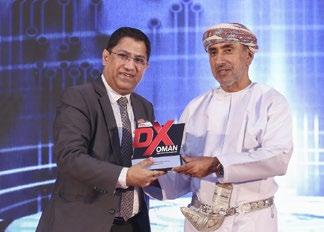
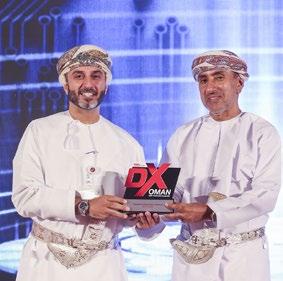
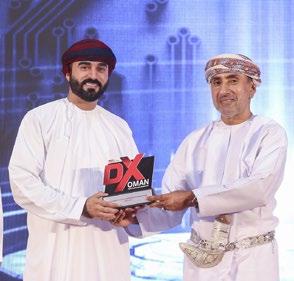



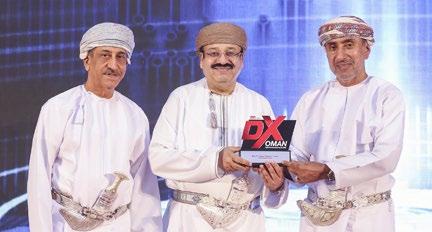

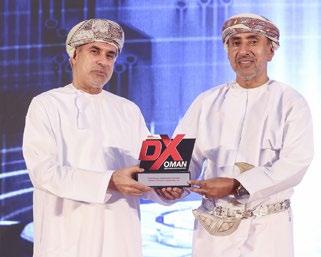
initiatives such as the Government Digital Transformation Programme ‘Tahawul,’ which has positioned Muscat as the leading governorate in digital maturity nationwide. These contributions underscored how public sector policies are strategically aligned with Oman Vision 2040’s aspirations for innovation, economic diversification, and improved quality of life for all citizens.
The event also witnessed MHD-ITICS’ announcement of the expansion of its Consumer Division into the Kingdom of Bahrain, where it will be represented by Mohsin Haider Darwish for Consumer Services W.L.L. The Bahrain branch is all set to continue delivering innovative, high-quality products and services designed to enhance everyday living. Drawing on decades of experience and established partnerships. The event was

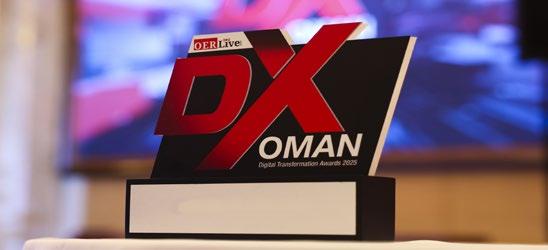
supported by key endorsing partners, including the Ministry of Transport, Communications & Information Technology Oman, the Oman Chamber of Commerce & Industry, OITS, ITHCA Group, the Austrian Embassy Muscat, and Advantage Austria, whose collaboration was crucial in bringing the conference to fruition.
Strategic partners such as Oman Arab Bank, Zawawi Powertech Engineering, Bank Muscat Meethaq, Infoline, Dhofar Insurance Company, Securado, and Taageer Finance also contributed significantly through their commitment to innovation and excellence. The conference further acknowledged the involvement of its Innovation Partner HONOR - MHDITICS; Automotive Partner Changan; Associate Partners Business Gateways
and United Securities; Knowledge Partner SSA Consulting Group; Support Partner ROAA United; as well as Media Partners The Daily Tribune in Bahrain, ZiBi in Zanzibar, and Alam Al Iktisaad, all of whom played important roles in supporting and promoting the event.
OERLive DX 2025 served as an essential forum for exchanging ideas, fostering partnerships, and inspiring innovation. By bridging government vision, private sector expertise, and cutting-edge technology, the event reinforced Oman’s path toward becoming a regional hub for digital excellence. As the Sultanate of Oman continues to progress toward the goals of Vision 2040, OERLive DX remains committed to convening the brightest minds and forward-thinking leaders to shape Oman’s intelligent and connected future.
An interview with the Minister of Labour, Economy and Investment, Hon.Shariff A Shariff on how Zanzibar reinvented Public Private Partnership (PPP) to drive national development
Over the past two decades, Zanzibar has steadily evolved its approach to publicprivate partnerships (PPPs), moving from a traditional tenderbased procurement system toward a more dynamic strategic engagement model. Today, partnerships are no longer treated simply as contractual arrangements but as vital engines for sustainable growth, economic diversification, and national development. This transformation, accelerated under the leadership of HE Dr. Hussein Ali Mwinyi, has repositioned Zanzibar as an emerging hub for investment-ready projects, delivering tangible benefits across infrastructure, healthcare, energy, and the blue economy. With a modernised legal framework, a proactive institutional setup, and a clear commitment to transparency and inclusion, Zanzibar’s PPP story is no longer just about building projects, it is about building a resilient, prosperous future. To better understand this remarkable PPP revolution, we sought out Hon. Shariff A. Shariff, Minister of State, President’s Office - Labour, Economic Affairs and Investment, who shared his reflections on Zanzibar’s journey and achievements.
Could you describe how Zanzibar’s legal framework for PPPs evolved?
Zanzibar’s Public-Private Partnership (PPP) journey reflects a broader evolution in the nation’s economic development strategy, shifting from reactive tender-based models to strategic and transformative partnerships. For an island economy like Zanzibar, services play a major role, and infrastructure programs are fundamental to unlocking broader economic potential. Toward the end of the 1990s, Zanzibar placed greater emphasis on strengthening key infrastructure sectors such as ports, airports, electricity, water supply, and healthcare to drive growth and enhance service delivery. Public financing alone could not meet the
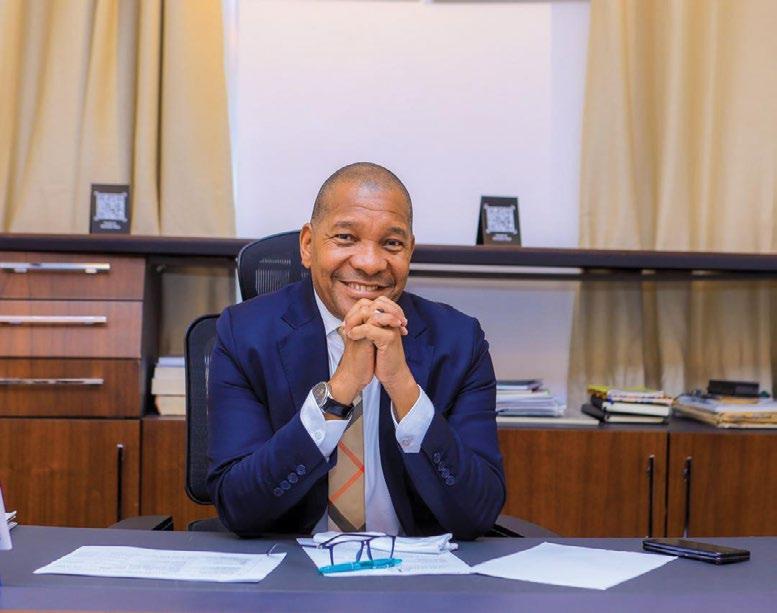
private sector engagement not just necessary, but urgent. The Government of Zanzibar took early steps to lay the legal foundation for private sector participation, culminating in the enactment of the Concession Projects Act No. 1 of 1999. This marked the beginning of Zanzibar’s PPP journey, initially focused on mobilising private investment to fill essential infrastructure gaps. As the economy and infrastructure needs evolved, so too did the government’s approach to PPPs. In 2014, a formal PPP Policy was launched to provide strategic direction and consistency, followed by the enactment of the Public-Private Partnership Act No. 8 of 2015. These milestones moved Zanzibar beyond ad-hoc concessions toward a more structured and rulesbased PPP framework. The introduction of PPP Regulations in 2017 further strengthened operational aspects, enhancing transparency, sustainability, and investor confidence.
Today, under the dynamic leadership of His Excellency Dr. Hussein Ali Mwinyi and the Eighth Phase Government, Zanzibar has accelerated its shift toward transformative partnerships. To further modernize and energize
amendments to the PPP Act No. 8 of 2015 were introduced in 2021 and 2022. These reforms were aimed at enhancing flexibility, streamlining project execution, and making Zanzibar more attractive to private investors, and include: Allowing direct negotiations for technically sound unsolicited proposals, as outlined in Section 23 of the PPP Act; Empowering implementing authorities to engage qualified transaction advisors, ensuring projects are well-prepared and bankable; Establishing a Government Negotiation Team to coordinate, structure, and fast-track high-priority strategic PPP projects; Creating a dedicated Ministry for Investment, tasked with spearheading investment promotion and strengthening institutional coordination; Authorizing public authorities to hire transaction advisors for the development and packaging of investment-ready projects.
How effective has the current PPP legal and regulatory framework been in facilitating private sector participation?
Zanzibar’s current PPP legal and regulatory framework has proven to be highly effective in facilitating private sector participation. The amendments
made in 2021 and 2022 to the PPP Act No. 8 of 2015 have been especially impactful. These changes allowed for the direct award of unsolicited proposals for strategic projects, significantly improving the efficiency of our engagement with private investors. The establishment of a dedicated Ministry of Investment has further enhanced coordination and focus on investmentrelated initiatives. Additionally, empowering implementing authorities to engage transaction advisors has ensured that projects are better structured, bankable, and attractive to the market. The formation of a Government Negotiation Team has helped streamline the review and approval process, resulting in faster turnaround times and more effective execution.
Together, these enhancements have led to a notable increase in interest and participation from both local and international private sector players. To date, more than 29 private sector entities and development partners have actively engaged with Zanzibar’s PPP Unit, expressing interest and submitting proposals, many under Section 23 of the PPP Act, which allows for unsolicited proposals.
How many PPP projects were initiated, approved, or implemented in Zanzibar so far?
Under the dynamic leadership of His Excellency Dr. Hussein Ali Mwinyi, Zanzibar has witnessed significant momentum in the advancement of Public-Private Partnership (PPP) projects. We have initiated over 20 PPP projects both solicited and unsolicited submitted by credible private sector entities. Some of the key projects initiated are: Design, Build, Finance, Operate, Maintain, and Transfer (DBFOMT) of the Passenger Terminal and Ro-Ro Port; Design, Build, Finance, Operate, Maintain, and Transfer (DBFOMT) of the Fumba Container Port; Management and Operation of Terminal 3 at Abeid Amani Karume International Airport (AAKIA); Management and Operation of Malindi Container Port.
The year 2024 has been a landmark period for Zanzibar’s PPP program. Notable achievements include: Implementation of the Fumba Port
Project in Unguja; Implementation of the Mkoani Port Project in Pemba; Electronic Health Network Zanzibar (EHNZ) PPP; Management and Operation of District Hospitals; Management and Operation of Water Services; Operations and Management of the New Amaani Complex; Development of the Conventional Buoy Mooring (CBM) Facility at Mangapwani, facilitating safe and efficient offshore petroleum handling operations; Construction of a Landing Site and Fish Market at Malindi. The infrastructure sector, particularly ports and airports, along with healthcare, have witnessed the most significant traction.
How do these PPP projects contribute to national development priorities such as job creation, infrastructure development, and economic diversification?
PPP projects are central to driving Zanzibar’s national development priorities. They play a vital role in generating employment during both the construction and operation phases, promote knowledge and technology transfer to Zanzibari businesses and personnel that build long-term local capacity. Estimates suggest that over 10,000 direct jobs have been created through these projects, with a significant number of indirect jobs emerging in the supply chain, local services, and related industries. Employment is sustained not only during the construction phase but also through long-term operations and maintenance. In addition, these initiatives are crucial for upgrading and expanding our infrastructure, a key enabler of sustainable economic growth.
How is the government ensuring that PPPs promote local content, skills development, and the participation of Zanzibari businesses in large projects?
The Government of Zanzibar is deeply committed to ensuring that PublicPrivate Partnerships (PPPs) serve not only as vehicles for infrastructure and service delivery but also as catalysts for local economic empowerment, skills development, and the active participation of Zanzibari businesses. To achieve this, our PPP contracts are intentionally structured to prioritize
local content development and the integration of Zanzibari enterprises. A number of concrete strategies have been implemented to achieve these goals: Local Content Clauses: PPP contracts incorporate specific provisions requiring foreign partners to subcontract services or procure goods from local companies whenever feasible; Joint Ventures and Special Purpose Vehicles (SPVs): We encourage the establishment of joint ventures between international investors and local firms within SPV structures; Skills Transfer and Workforce Training: PPP agreements are carefully designed to include mandatory skills development components. Contractors are required to implement workforce training programs, ensuring that Zanzibaris gain technical knowledge and expertise throughout the project lifecycle; Promotion of Local SMEs: We have embedded SME-focused provisions within our procurement processes. Our Requests for Qualifications (RFQs) and Requests for Proposals (RFPs) include evaluation criteria that reward bidders who demonstrate a strong commitment to involving local subcontractors and service providers; Use of Local Materials and Labor: Wherever practical, PPP projects prioritize the use of local materials and labor, supporting domestic industries and creating employment opportunities for the local workforce; Facilitating Strategic Partnerships: The government actively facilitates connections between international investors and Zanzibari companies, fostering opportunities for capacity building, technology transfer, and longterm collaboration beyond individual projects.
Which sectors are currently prioritized for PPP investment? We have prioritised several key sectors for PPP investment, recognising their potential to drive economic growth and improve the quality of life for our citizens. These sectors include: Energy, where we are investing in renewable resources and grid modernization; Tourism and Hospitality, with a focus on sustainable development and enhanced visitor experiences; Logistics, to improve our port and transportation infrastructure; Healthcare, to expand access to quality medical services;
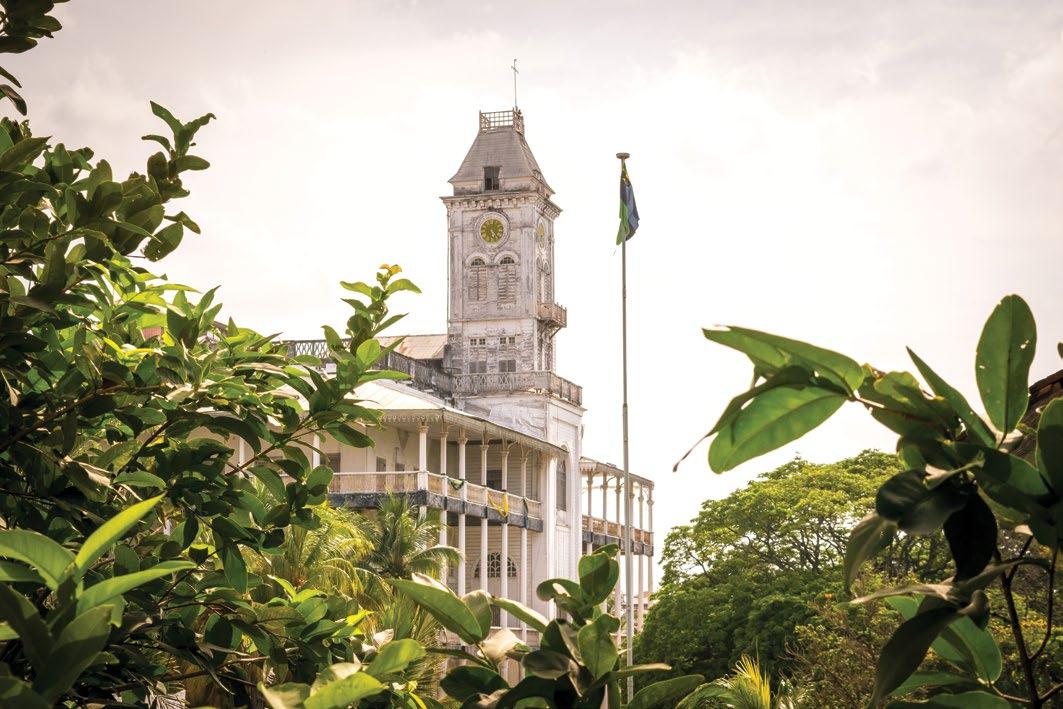
ICT, to enhance connectivity, promote digital inclusion and support Zanzibar’s transition toward a Digital Economy; and Blue Economy to leverage our strategic coastal location. Zanzibar’s infrastructure transformation, anchored by over $2.3 billion in investment, is reshaping the islands’ development landscape across multiple sectors: Aviation: New airports in Pemba and Nungwi, and Terminal 4 at AAKIA; Maritime and Industrial: A dry dock facility at Mangapwani, a fishing port at Bumbwini, and an industrial park; Technology and Urbanization: A $700 million Data Center and Cyber City in Fumba, and major housing and city projects in Kikwajuni and Bawwani; Healthcare and Public Services: A specialised hospital in Binguni, a modern abattoir in Kisakasaka, public transit buses, and waste management initiatives; Sports and Recreation: Operation of the new Amaan Complex Stadium.
How is the government working with development partners and financial institutions to de-risk PPP investments, especially in capitalintensive sectors?
We view our development partners as long-term collaborators in our growth journey and deeply value their continued support in unlocking transformative investments that will shape Zanzibar’s future. The
sustainable Public-Private Partnerships (PPPs), particularly in capital-intensive sectors critical to our long-term development vision. To this end, we are working proactively with development partners and financial institutions to identify and implement de-risking mechanisms that enhance project bankability and investor confidence. Our approach includes innovative financing models that help mitigate financial and operational risks for private investors. These tools are especially important where upfront capital requirements are significant.
What institutional mechanisms are in place to ensure transparency, accountability, and sustainability in PPP projects in Zanzibar?
Our ministry is firmly committed to ensuring that transparency, accountability, and sustainability are at the heart of every Public-Private Partnership (PPP) initiative in Zanzibar. To achieve this, we have established a robust institutional framework that guides the development, negotiation, and implementation of all PPP projects, ensuring they serve the public interest and support long-term national goals. Key institutions, including the PPP Department, the Office of the Attorney General, the Government Negotiating Team (GNT), Implementing Authorities,
uphold high standards of governance across the entire project lifecycle. Our legal foundation, mandates open and competitive tendering processes for all projects. This ensures fairness, minimizes risks, and fosters public trust by promoting a level playing field for all participants. Equally important is our approach to public engagement. We have adopted a multi-faceted communication strategy, including public forums, media campaigns, and digital platforms, to keep citizens informed about project goals, anticipated benefits, and implementation progress.
How are sustainability and community benefit requirements built into PPP agreements?
Sustainability and community benefit considerations are embedded at the very heart of our Public-Private Partnership (PPP) agreements, they are not afterthoughts, but foundational elements from project inception to completion. Every PPP project in Zanzibar is required to undergo rigorous Environmental and Social Impact Assessments (ESIA) to ensure alignment with both local regulatory frameworks and international best practices. These assessments help identify potential impacts early and guide the integration of sustainability measures throughout the project’s planning, design, construction, and operational phases. We
incorporate contractual provisions that explicitly safeguard the environment and guarantee that surrounding communities experience tangible benefits from the projects. These include commitments to community engagement, employment opportunities, local procurement, and improved access to essential services. Additionally, we enforce robust monitoring and evaluation mechanisms to ensure that all social and environmental commitments are upheld over the entire lifecycle of the project.
Can you share examples where environmental or social considerations have reshaped a PPP design? A prime example is the Passenger Terminal and Ro-Ro Project at Mpigaduri. The initial site earmarked for development was a mangrove-covered area, an ecologically sensitive zone crucial to Zanzibar’s marine ecosystem and coastal resilience. From the outset, environmental sustainability was prioritized in the planning process. Rather than proceeding with conventional site clearing, the project underwent a comprehensive environmental assessment which led to a fundamental redesign. The private partner, through the Special Purpose Vehicle (SPV), Zanzibar Ferry Development Company (ZF Devco), was required to relocate and conserve the mangroves, integrating them meaningfully into the final infrastructure design. Today, these mangroves are not only preserved, they are envisioned as a permanent environmental feature of the completed terminal, enhancing both the project’s climate resilience and ecological value.
How does the government engage with investors post-award to ensure smooth implementation and address emerging issues?
Following the award of a PPP project, the Government, through the President’s Office – Labour, Economic Affairs and Investment, remains fully committed to supporting private sector partners throughout the implementation phase. Our engagement does not end at contract signing; rather, it marks the beginning of a collaborative journey toward successful project delivery. Through the PPP Department, we provide proactive facilitation and coordination support to
ensure that private partners can operate efficiently. This includes assisting with critical processes such as securing permits, licenses, exemptions, visas, and access to investment incentives. Our goal is to minimize administrative delays, create a seamless experience for investors, and maintain strong alignment between all parties involved. This hands-on approach also helps to prevent potential disputes and ensures that project expectations are clearly understood and consistently met. As the PPP environment must continually evolve to meet the needs of all stakeholders, we maintain regular dialogue with investors, government institutions, and other key actors.
Through consultations, periodic review meetings, and project debriefs, we foster a spirit of collaboration, ensuring that emerging challenges are addressed promptly and effectively. Moreover, we place strong emphasis on postproject evaluations. These assessments allow us to capture valuable lessons, identifying what has worked well and where adjustments are necessary. The insights gained directly inform ongoing improvements to our policies, legal frameworks, and internal procedures, ensuring that Zanzibar’s PPP system becomes more resilient, responsive, and investor-friendly with each project completed.
What are the major challenges the government has faced in implementing PPPs, and how are these being addressed?
Under the visionary leadership of His Excellency Dr. Hussein Ali Mwinyi, the Zanzibar PPP program has made significant strides. However, like any emerging market, we have encountered several challenges that test our resolve, and I am confident that we will turn these challenges into opportunities for growth and progress. Initially, limited understanding of the PPP model within government and the private sector slowed decision-making and stakeholder engagement. To address this, the PPP Department launched awareness campaigns and impactful workshops. Using television, online platforms, and other media, we are building broad understanding of PPPs’
role in driving sustainable development. Another challenge has been the lack of capacity in project preparation, particularly in structuring, financial modeling, and risk assessment. To address this, the PPP Department is strengthening skills across sectors. It also established the PPP Project Development Fund to support earlystage activities like feasibility studies and advisory services. We acknowledge that regulatory delays and coordination issues between different government institutions have created bottlenecks that slow down the pace of project execution. To overcome regulatory delays and coordination challenges, we are streamlining processes and strengthening collaboration among government institutions. Despite these hurdles, our vision for Zanzibar’s future remains clear: a prosperous, inclusive, and resilient economy powered by partnerships between the public and private sectors.
What would be your parting message to investors and stakeholders interested in Zanzibar’s PPP and development journey?
Zanzibar’s future is incredibly bright. Under the visionary leadership of His Excellency Dr. Hussein Ali Mwinyi, we have built a strong, transparent, and investor-friendly environment that is already delivering transformational results. In the next 5 to 10 years, we see Zanzibar emerging as a regional leader in public-private partnerships, driving sustainable growth across key sectors like infrastructure, healthcare, energy, and the blue economy. My parting message to investors is simple: Zanzibar is open, ready, and eager to partner with visionary players who share our ambition for inclusive and resilient development. We invite you to explore the opportunities, align with our national vision, and reach out to our Ministry for any support you may need. Together, we can build a prosperous future.
Source: Zanzibar Investment & Business Insights Magazine
New World Autos launches a summer campaign offering unbeatable benefits on feature-packed, tech-driven Chery vehicles for Oman’s adventurous families

Ndistributor for Chery vehicles in Oman, recently announced an exciting Chery Summer Campaign under the theme ‘Enjoy Summer Drives with Cool Vibes’. As families prepare for scenic road trips and memorable getaways, Chery brings more value, safety and innovation to every journey with attractive benefits for customers purchasing any Chery vehicle this summer. The benefits include Free AAA Roadside Assistance, Free Service up to 6 Years/60,000 kms (whichever is earlier), an unparalleled 10 year/1,000,000 km engine warranty (not applicable on Arrizo 5), Free Insurance, Walk-in and Win Raffle with a chance to win a Samsung Galaxy S25 Ultra 5G and Test Drive & Win exciting prizes. Also available is attractive EMI options across the full range. This exclusive campaign that began on 18th May 2025 will last until
may be advised that the benefits vary between model variants, model year and manufacturing year. Terms & Conditions apply. Customers can visit any Chery showroom for exact details.)
Chery has established itself as one of the most forward-thinking automotive brands globally, backed by strong investments in research and development, including five R&D centers worldwide. Chery’s vehicles reflect the brand’s commitment to intelligent mobility, safety, energy efficiency and driving comfort. With numerous international awards and patents, Chery’s range in Oman represents a fusion of cutting-edge engineering, refined aesthetics, and exceptional value. The range in Oman includes all-new Tiggo 9, Tiggo 8 Pro Max, Tiggo 7 Pro Max, Tiggo 4 Pro, Arrizo 8, Arrizo 6 Pro and Arrizo 5.

the Tiggo 9 is equipped with a 2.0-litre turbocharged engine, finely tuned to offer a harmonious blend of power and efficiency. Paired with an advanced 8-speed automatic transmission and all-wheel drive capability, it delivers a smooth, confident and exhilarating driving experience across Oman’s diverse terrain. Inside, the Tiggo 9 offers a sanctuary of calm and sophistication. Its seven-seat configuration caters to modern families and adventurers alike, while the multilayer noise reduction cabin, ventilated leather seats, front seat massage, driver headrest speakers and multizone climate control elevate passenger comfort to new levels. A dual 12.3-inch digital display, AR navigation and voice control headline its tech-forward interior, bringing convenience and luxury together in perfect balance. The Tiggo 9 is also available with an auto parking feature.
The Tiggo 8 Pro Max is powered by a 2.0L turbocharged engine paired with a 7-speed Dual Clutch Transmission (DCT), delivering robust performance and efficiency. The cabin boasts premium leatherette seats, ambient lighting and a high-definition dualscreen infotainment setup. With
transmission, offering a smooth urban driving experience. The interior offers surprising spaciousness, a floating touchscreen, wireless phone charging and multiple drive modes. With key safety features like Electronic Stability Control, Hill Assist and reverse sensors, it is a smart companion for
a wide touchscreen display and ample cargo space. Safety is upheld with ABS with EBD, TPMS and rear parking sensors. The Arrizo 6 Pro is available with EMI starting from RO 79.
Perfect for first-time buyers, the Arrizo 5 offers an economical 1.5L


Advanced Driver Assistance Systems (ADAS), including adaptive cruise control, lane-keeping assist and blind spot detection, it ensures both luxury and peace of mind. The Tiggo 8 Pro Max is available with EMI starting from RO 112.
Blending bold design and practical versatility, the Tiggo 7 Pro Max comes with a 1.6L turbocharged engine mated to a 7-speed DCT for smooth, responsive drives. Inside, the SUV features a sleek digital cockpit, intelligent voice command system and a panoramic sunroof. Safety is enhanced with 6 airbags, 360-degree cameras and rear cross-traffic alert, making it ideal for tech-savvy families. The Tiggo 7 Pro Max is available with EMI starting from RO 95.
Compact yet packed with features, the Tiggo 4 Pro is equipped with a 1.5L turbocharged engine and CVT
everyday journeys. The Tiggo 4 Pro is available with EMI starting from RO 79.
A stylish sedan built for refined comfort, the Arrizo 8 houses a 1.6L turbocharged engine and a 7-speed DCT, offering spirited acceleration and stable handling. The interior is designed with an executive mindset, soft-touch materials, multi-colour ambient lighting and dual 12.3” screens for infotainment and instrumentation. Safety comes standard with ADAS, auto emergency braking and lane departure warning. The Arrizo 8 is available with EMI starting from RO 115.
Delivering strong value in the midsize sedan segment, the Arrizo 6 Pro is powered by a 1.5L turbo engine paired with a CVT, ensuring fuel efficiency and dynamic performance. Inside, the car features comfortable fabric seats,
engine with a CVT, designed for daily commutes and reliability. The interior is simple yet functional, offering a touchscreen infotainment system, manual AC and practical storage solutions. Safety essentials include dual airbags, traction control and stability assist, making it a trustworthy entry-level option. The Arrizo 5 is available with EMI starting from RO 61.
In Oman, Chery vehicles are distributed by New World Autos. For the latest Press Releases, Test Drive requests and more, please visit www. chery.om, www.youtube.com/@ OmanChery, www.facebook.com/ CheryAutoOman, and www.instagram. com/cheryoman. For any further details & to ascertain the availability of stocks, please visit the Chery Showroom at Wattayah, Al Hail, Sohar and Salalah.

Not seeking permission. Not asking for validation. Just progressing – one acquisition, one concept, one elegantly
concept cars like the “Vision Starburst” and now seems ready to deliver on that vision. While the Geely Starray
but as top contenders with flair, finesse, and yes, a bit of interstellar swagger.
Visually, the Starray is nothing short of a spectacle. It takes boldness to stand out in the oversaturated world of compact crossovers, and the Starray does so unapologetically. Inspired by the sci-fi elegance of the Vision Starburst concept, its design is a striking symphony of sharp creases, dynamic lines, and futuristic detailing.
The front end is particularly intriguing. Its blacked-out “Lightwave Ripple” grille acts as a stage for the headline act: the dazzling LED “Stars-aligned” DRLs and “Particle Ray Headlights.” These elements choreograph a cosmic light dance when the vehicle is unlocked. The DRLs stretch ambitiously across the bonnet line before cascading down the bumper, creating a visual connection between light and motion that feels more spacecraft than sport utility.
Move to the profile and you’ll find squarish wheel arches that give the Starray a sense of grounded athleticism, while the dual-tone paint scheme enhances its visual complexity. Our top-spec test model was also draped in pearl white rode confidently on 20-inch “Galactic” dual-tone silver and black alloy wheels.
And then there’s the rear. A continuous “Full-arrow” LED light strip spans the width of the tailgate. The sharp corners on the tail lamps also flow graciously with the bumper, giving it an uninterrupted look and feel. Step inside the Geely Starray, and it becomes clear that this SUV is aiming to do more than just tick boxes – it wants to leave an impression. The cabin leans heavily into the car’s star-inspired identity, with a layout and design language that’s both futuristic and comfortably familiar.
The colour palette is particularly well executed. A dual-tone scheme – black up top and tan below – immediately gives the interior a layered, luxurious feel. Material choices are mostly solid, with soft-touch panels across the dash, doors, and seats. The seats themselves are finished in leatherette, which feels reasonably supple, and the generous padding makes long drives less of a

chore. The Alcantara-like trim running across the top of the dashboard is an interesting detail, and it adds a welcome texture break.
In the centre, a large 13.2-inch vertical touchscreen dominates the dash. It’s crisp, quick to respond, and houses pretty much all the major functions – including climate control. That said, the interface works well, even in the heat, and the screen’s anti-glare coating held up under strong sunlight during our test.
The steering wheel is a standout feature: flat on the top and bottom, with a distinctive star-shaped centre hub that ties in well with the car’s broader design theme. Behind it sits a 10.2-inch digital instrument cluster, offering vibrant graphics and useful customisation. The layout is clean, and everything you need is easy to access without digging through menus.
Another highlight is the ambient lighting setup. Rather than the usual horizontal strips, Geely has opted for vertical lighting elements on the dash and doors, which adds a fresh visual twist. It’s not overdone, and in low light, it adds just the right amount of character. The crystal-finish gear selector is also a nice touch –elevating what is often an afterthought in this segment.
Geely hasn’t ignored practicality either. The ventilated front seats are a welcome addition for warmer climates, particularly since the A/C vents, while sleek in design, are still a bit finicky on the driver side. Still, once the system gets going, cooling is excellent, and the overall in-cabin experience remains comfortable.
There are thoughtful details sprinkled throughout: a panoramic sunroof that opens up the cabin and offers great visibility; sun visors with a transparent bottom half to reduce blind spots; and a 9-speaker Infinity (by Harman) audio system that performs well across a range of genres, adding a touch of premium acoustics to the ride. Our short test revealed excellent customisation options for the audio, with deep levels of play in the treble and bass, giving you more control over the frequencies.
Rear-seat space is generous. There’s plenty of knee and headroom, and the cabin’s airy feel is carried through to the back, making it a viable option for family duties.
Powering the SUV is a 2.0-litre turbocharged four-cylinder engine, delivering a healthy 238 HP and 350 NM of torque. Mated to a Aisim 8 speed AT Transmission, the powertrain offers smooth, responsive acceleration

that feels well-calibrated for both city commutes and highway driving. From a standstill, there’s minimal turbo lag – an often overlooked detail that makes a big difference in day-to-day usability. It’s quick off the line and maintains momentum with ease, achieving a 0-100kph time of around 7 seconds. Shifts from the Aisim 8 speed AT Transmission are slick and purposeful, and the gearbox does well to downshift promptly when you need a burst of speed for overtaking.
Engine refinement is managed very well for the segment. On the road, the Starray’s driving dynamics are surprisingly composed. Built on the CMA platform, shared with its Swedish counterpart, it carries itself with a poise not always seen in this category. Through corners, body roll is minimal – so much so that it almost feels carlike, which is a rare trait for an SUV of this size. Even during sharper turns or quick lane changes, the chassis remains settled.
Much of this comes down to the suspension setup. Even riding on large 20-inch wheels, the Starray manages to deliver a smooth, controlled ride. It absorbs bumps and imperfections with ease, remaining quiet and comfortable even over uneven surfaces. This is no sport-tuned machine, but it does an excellent job at daily usability and long-distance comfort. Steering feel,
meanwhile, leans toward the lighter, comfort-oriented side. There’s not a great deal of feedback through the wheel, but precision is good, making urban manoeuvres and high-speed cruising equally stress-free. There are multiple drive modes available, including ‘Sport’, but even in standard mode, the car feels well-balanced and predictable.
Braking performance deserves a special mention. The Starray’s brakes are strong and progressive, offering a reassuring linear bite, which is something that’s often lacking in this segment. It gives the driver an added sense of control, especially in stop-start traffic and emergency situations.
Grip levels are also solid thanks to the wide 245-section tyres and 4 Wheel Drive (6th generation Borgwarner 4WD systerm). While not designed for performance antics or serious offroading (there’s no low-range gearing or diff lock), the Starray remains planted and surefooted in everyday driving scenarios. Spirited cornering is possible, though pushing too hard will trigger some understeer.
In terms of efficiency, the 2.0L turbo manages to stay frugal for what it is. Despite a relatively medium-sized 54-litre fuel tank, we saw an indicated range of about 650kms, equating to a commendable 12kmpl average.
There are a few quirks – the gear selector, for instance, requires an unusually firm press on the brake pedal before shifting between modes, which can feel cumbersome in tight spots. But beyond that, there’s little to fault in terms of drivability.
In a segment brimming with options, the Geely Starray doesn’t try to reinvent the SUV formula but focuses on refining it. It confidently brings together futuristic design cues, a wellappointed and surprisingly premium interior, and driving dynamics that lean heavily toward comfort without compromising on composure. It’s not a sports SUV, nor does it claim to be, but what it does offer is a stable, mature driving experience that’s hard to come by in similarly priced rivals.
Its road manners are polished, its cabin impressively specced, and its styling refreshingly bold without veering into gimmickry. That’s a delicate balance – and Geely seems to have landed it well.
Geely’s measured approach to growth, backed by solid platforms and a willingness to take design risks, is beginning to pay off. With the Starray, they’re not just offering an alternative; they’re setting a new bar for what a compact SUV from this part of the world can be.
Audi Oman unveils the new Audi A5, Audi A6 Avant, and the all-electric Audi A6 e-tron at a landmark launch event

Audi Oman, represented by Premium Motors, recently staged a landmark event that set a new benchmark in the Sultanate’s premium automotive scene. Held under the esteemed patronage of His Excellency Sheikh Sabaa bin Hamdan bin Sabaa Al Saadia, Secretary General of the Higher Committee for National Day Celebrations, this exclusive event marked a significant milestone in Audi’s journey in the region.
The grand reveal at the Premium Motors showroom featured the highly anticipated unveilings of the new Audi A5, Audi A6 Avant, and the allelectric Audi A6 e-tron. In addition, several other models, including the Audi Q6 e-tron, Audi Q7, Audi Q8, and the high-performance Audi S8, were prominently displayed for attendees to explore. Four classic Audi models were also on display, offering a nostalgic nod to the brand’s storied heritage while celebrating its forward-looking vision. By launching both advanced internal combustion engine and fully electric vehicles simultaneously, Audi demonstrates its strategic commitment to meeting the evolving preferences of Omani drivers. This dual approach
reflects Audi’s broader mission to lead in both performance and sustainability. This event was more than just a product launch; it was a celebration of Audi’s evolving identity and its rich local legacy.
Attended by Audi owners, VIPs, and influential personalities, the showcase underscored the brand’s commitment to delivering both performance and sustainability. Guests enjoyed live band performances that added vibrant energy to the evening, along with interactive activations and brand experiences that brought Audi’s innovation and lifestyle ethos to life. These thoughtful touches elevated the occasion, turning it into a celebration of both technology and community. The newly unveiled Audi A5 stands out with its sharp, athletic design and refined character, making it an ideal choice for drivers who seek both performance and sophistication. Inside, a digital-first cabin features the Audi Virtual Cockpit and an intuitive MMI touch interface for a seamless driving experience. The new Audi A6 Avant brings a perfect blend of executive elegance and everyday practicality. Known for its dynamic
handling, advanced driver assistance systems, and generous cargo capacity, it caters to families and professionals who require both comfort and utility without compromise. Meanwhile, the new Audi A6 e-tron represents the brand’s bold step into the electric future with state-of-the-art EV technology. A projected range of up to 700 kilometres and ultra-fast charging capabilities redefines electric mobility all while delivering the premium refinement expected from Audi.
This event marks a pivotal moment in Audi’s electrification journey in Oman. By offering both conventional and electric models, Audi Oman is empowering customers with choice while preparing them for the next era of mobility. Christian Nehme, General Manager of Premium Motors commented, “With this launch, we are introducing the future of mobility in Oman. From electrification to design excellence, these models reflect Audi’s promise to lead with purpose and progress.” Among the distinguished attendees was Rene Koneberg, Managing Director of Audi Middle East, who praised the event’s significance in showcasing Audi’s progressive vision. “Audi is in the midst of the most ambitious model offensive in our history,” he said. “Tonight marks a major milestone in that journey here in Oman. Audi is offering more choice than ever - while paving the way for the next era of mobility.”
To experience the new Audi lineup, visit the Premium Motors Audi showroom in Oman. Expert consultants are available to provide personalised guidance and test drives, helping customers discover what sets Audi apart in redefining the driving experience in the region.
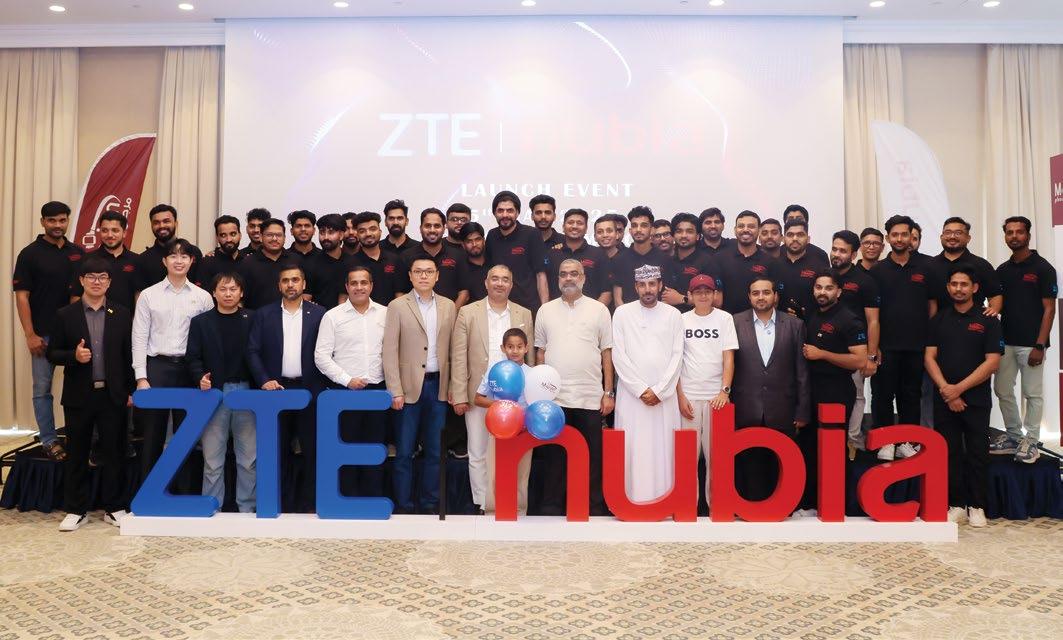
In response to the growing demand for diverse smartphone experiences in the Oman market, ZTE’s premium smartphone brand Nubia officially launched a comprehensive range of devices. These include the entry-level Nubia A35E (2GB+64GB), the flagship V70/V70 Design/V70 Max series (starting from 14GB+256GB), the Nubia Focus imaging series, the RedMagic gaming lineup, and the all-new Nubia Music series—each catering to distinct user needs with cutting-edge technology and standout design. Designed for first-time smartphone users, students, or as a reliable backup device, the Nubia A35E offers a 2GB+64GB configuration with a lightweight, efficient system—ideal for basic communication, daily apps, and essential mobile tasks. The Nubia V70, V70 Design, and V70 Max models strike a balance between powerful performance and artistic aesthetics. Equipped with advanced chipsets, starting at 14GB RAM and 256GB storage, high-resolution eye-protective displays, and long-lasting batteries, they are built for both work and play. Targeting competitive gamers and mobile enthusiasts, Red Magic smartphones feature high-refresh-rate displays, dedicated gaming engines, active cooling systems, and touch-sensitive shoulder triggers. Combined with RGB lighting and dedicated game space, they deliver a truly immersive and professional mobile gaming experience. Specifically designed for music lovers, the Nubia Music series comes equipped with large speaker chambers, Hi-Fi audio chips, and AI audio
UFC opens new branch in Al Maabelah to provide seamless and customer-first financial solutions
United Finance Company (UFC) marked the official opening of its newest branch in Al Maabelah on May 19, under the patronage of His Excellency Sheikh Ahmed Al Shihi, Wali of Al Seeb.
Located in the heart of Al Maabelah’s vibrant automotive and commercial zone, the new branch is a key milestone in UFC’s broader strategy to bring financial services closer to customers, enhance convenience, and support growing businesses through seamless, customer-centric solutions. The event welcomed over 80 guests, including esteemed auto dealers, long-standing partners, and senior representatives from UFC. Traditional Omani hospitality was offered, accompanied by a live oud performance and UFC-branded giveaways.
The ceremony began with opening remarks from Mahmood Al Hadi, AGM – HR, Administration and Recovery, one of the founding members of UFC, who reflected on the company’s journey and reaffirmed its purpose-driven growth. Abdullah Al Khayyari, Chairman of UFC, followed with a message focused on customer-centric expansion, highlighting Maabelah as a key location in line with UFC’s vision for sustainable market leadership. Delivering
Omani market—bringing together top-tier performance, artistic design, and diversified features to meet users’ evolving lifestyles. Whether you are a casual user or a power gamer, there is a Nubia device designed for you.” George, Vice President of ZTE Device Middle East/Africa, added, “The Middle East and Africa are pivotal regions in our global strategy, and Oman stands out for its dynamic tech adoption. With this launch, we are not just introducing new devices—we are empowering users with innovative tools that enhance their digital lifestyles. We look forward to deepening our connection with Omani consumers and driving forward with even more groundbreaking solutions.” All the newly launched Nubia devices will be distributed exclusively through Marjan Phone, ZTE’s official partner in Oman. Products will be available across major retail outlets and online platforms nationwide. Sahil MP, CEO and Founder of Marjan Group, emphasised the importance of this exclusive distribution partnership, stating, “This collaboration with ZTE reflects our commitment to bringing world-class technology to Oman and delivering value to both retailers and consumers.”
Karan Kumar Khatri, Chairman and Founder of Marjan Group, added, “We are honoured to host this groundbreaking launch. ZTE’s innovation aligns perfectly with our group’s mission of tech-forward growth across the region.”

the keynote, Fawaz Al Riyami, Chief Business Officer, outlined the branch’s role in UFC’s transformation roadmap, “This branch represents more than a physical space—it embodies our continued push toward faster service, deeper community engagement, and digitally empowered customer experiences.”
The Maabelah branch is expected to serve both individuals and SMEs, particularly in the automotive sector, offering a tailored suite of financing options designed around speed, simplicity, and trust. The ribbon-cutting ceremony was led by HE Sheikh Ahmed Al Shihi, marking the branch’s official opening and reinforcing the company’s strong ties with the local community.





